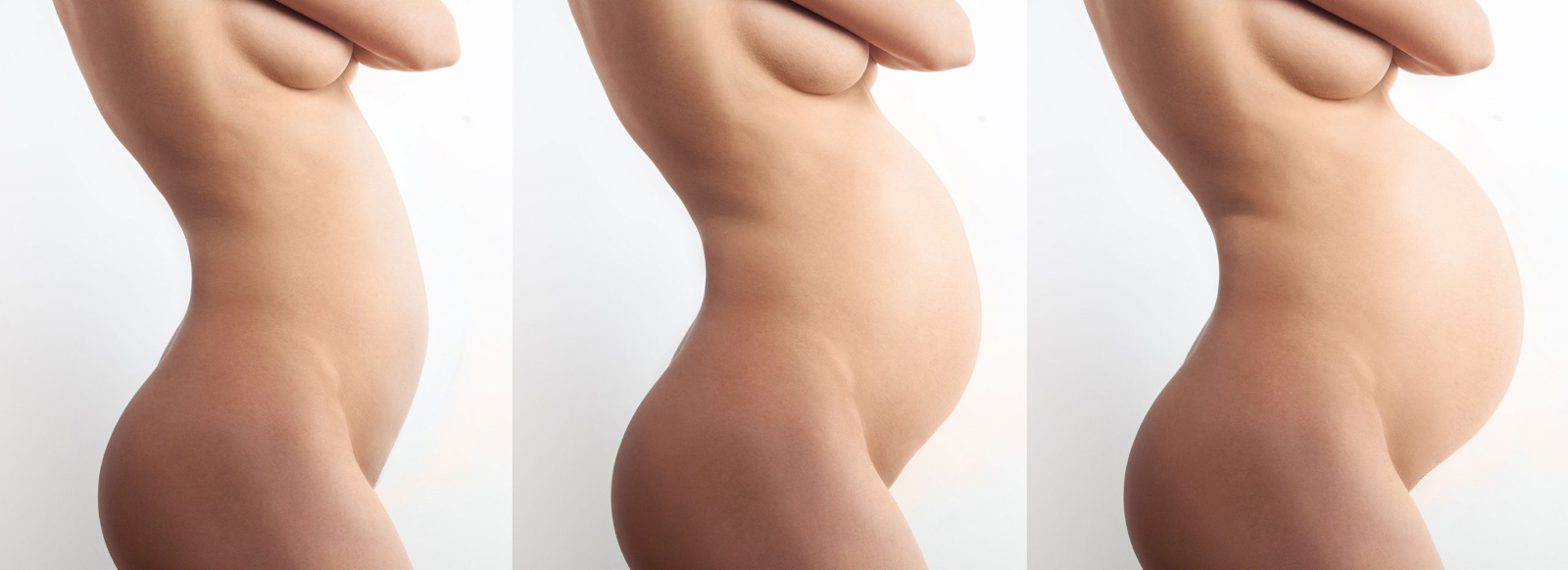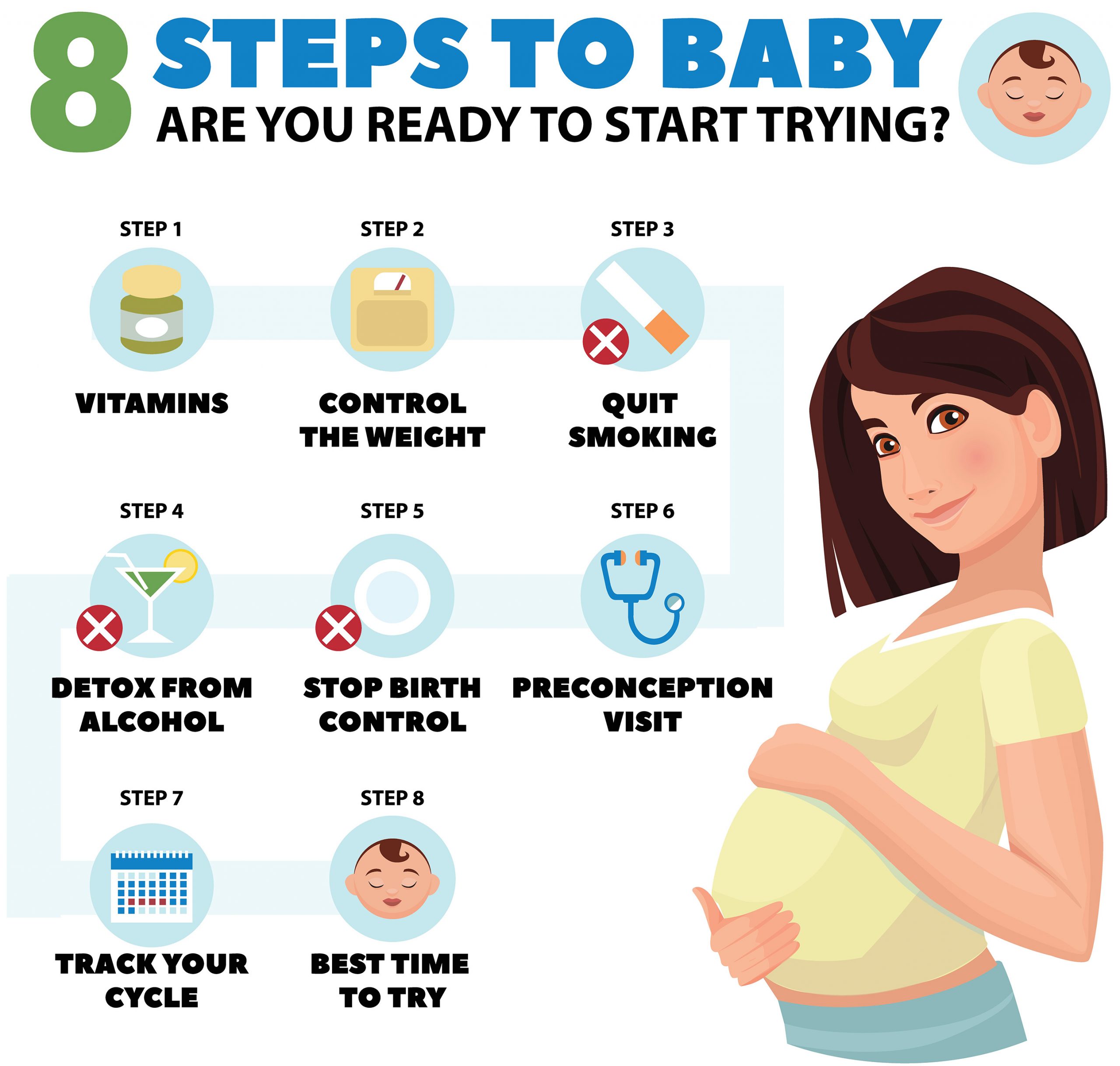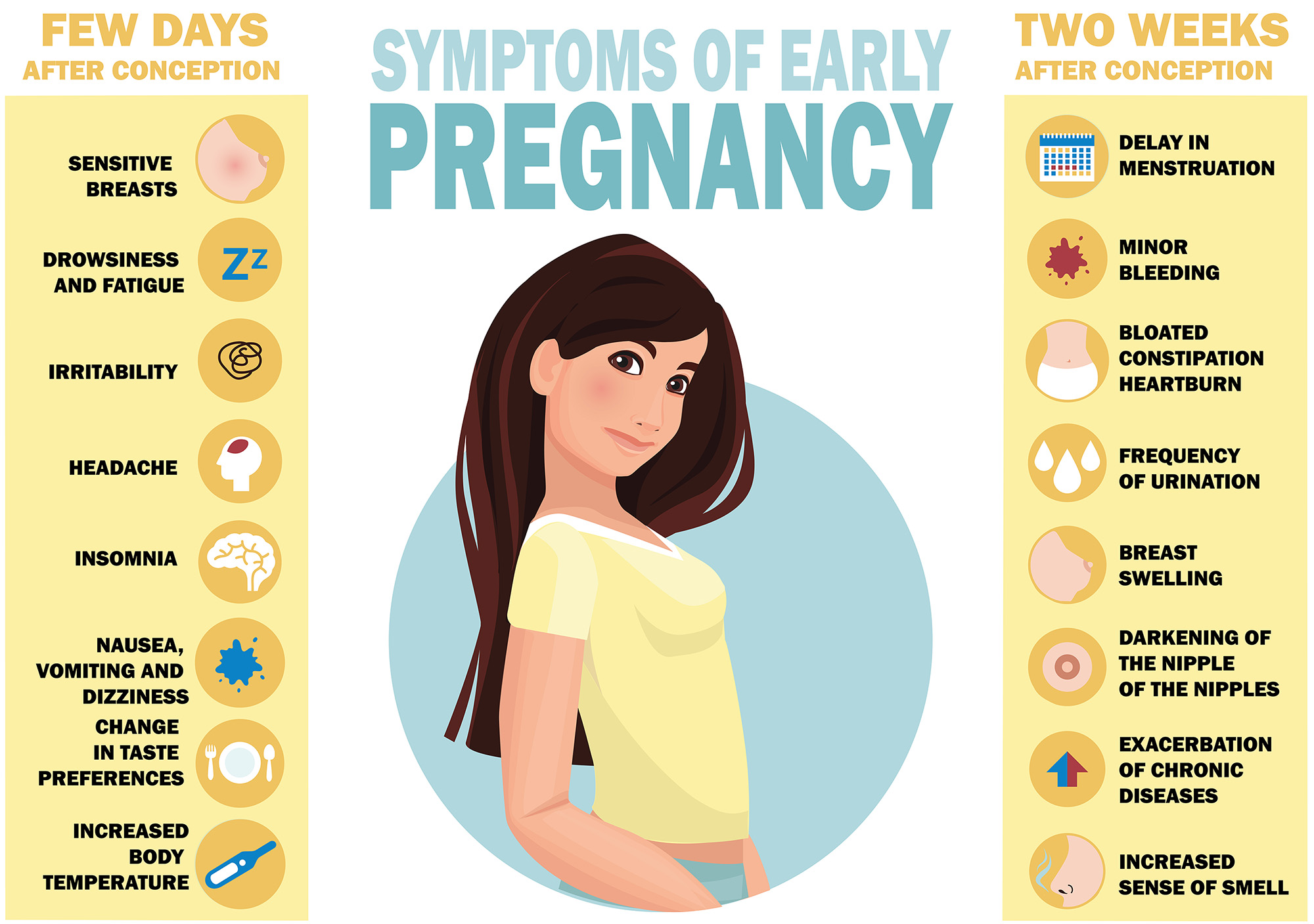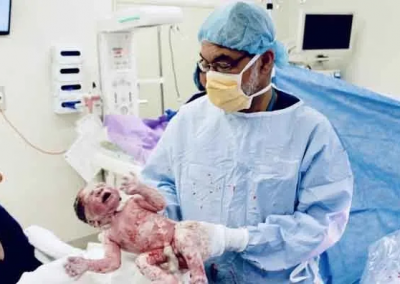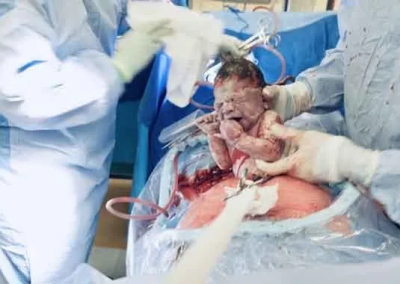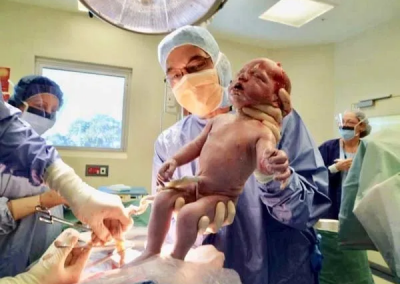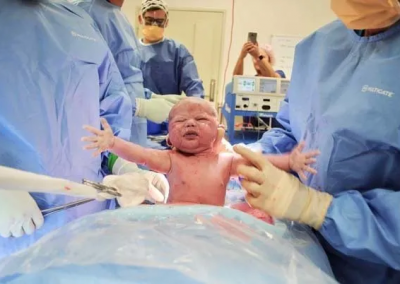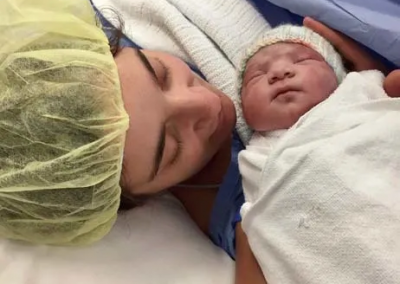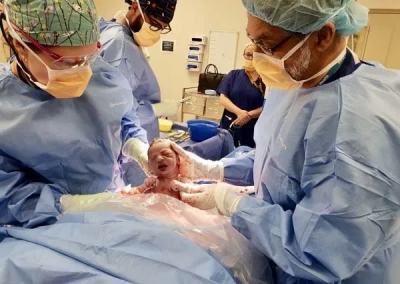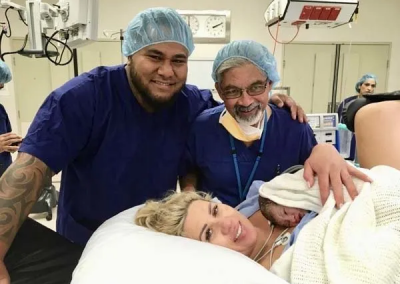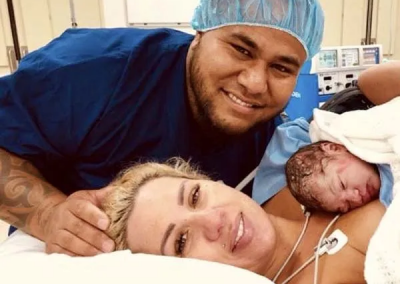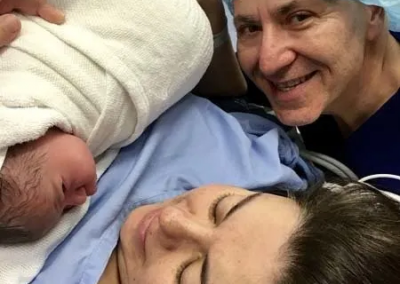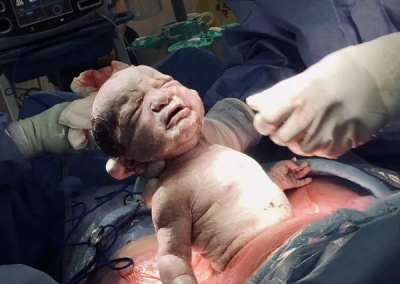
40 Weeks to Baby
40 Weeks to Baby
Congratulations

Finding out you are pregnant is a very exciting time in your life!
Pregnancy is usually forty weeks long and divided into three trimesters. Week by week, I will explain what’s going on inside you as your baby grows and develops.
At each obstetric appointment I will monitor the well-being of your baby.
I will see you every four weeks until you reach 28 weeks gestation.
From 28-36 weeks you’ll be seen every fortnight.
From 36 weeks I will see you every week until delivery.
I will perform an ultrasound on your first visit and then another is performed at 20 weeks.
I look forward to being part of your incredible journey.
Enjoy this week by week pregnancy guide.
Pregnancy Calculator
The average length of a pregnancy is 40 weeks because pregnancy is counted from the first day of your last period. Conception generally occurs two weeks after your period.
Pregnancy is divided into three trimesters:
- First trimester – conception to 12 weeks
- Second trimester – 12 to 24 weeks
- Third trimester – 24 to 40 weeks.
Pre-pregnancy counselling, including genetic screening
Existing medical conditions can be discussed prior to getting pregnant, and the situation optimised. Diabetic patients should have their blood sugar control optimised and patients with high blood pressure should have their medication changed to medications that are safe in pregnancy.
All women trying to conceive should start taking folic acid and iodine. They should also be checked for German measles (rubella) and chicken pox and if they are not immune, should be vaccinated at least one month before trying to conceive. Checking for Hepatitis is also worthwhile at this point.
This is a good opportunity to check for common genetic disorders, such a Thalassemia, or less common ones, such as Cystic Fibrosis, Taysachs decease and Spinal Muscular Atrophy.
Jump to Your Week of Pregnancy
Week
1
Week
2
Week
3
Week
4
Week
5
Week
6
Week
7
Week
8
Week
9
Week
10
Week
11
Week
12
Week
13
Week
14
Week
15
Week
16
Week
17
Week
18
Week
19
Week
20
Week
21
Week
22
Week
23
Week
24
Week
25
Week
26
Week
27
Week
28
Week
29
Week
30
Week
31
Week
32
Week
33
Week
34
Week
35
Week
36
Week
37
Week
38
Week
39
Week
40
Week 1
Your baby’s expected date of birth (EDD or EDB) is calculated from the first date of your last period.
Even though your baby hasn’t been conceived yet, this is called the first week of pregnancy because your period marks the start of pregnancy. Ovarian follicles will begin to ripen in readiness for ovulation
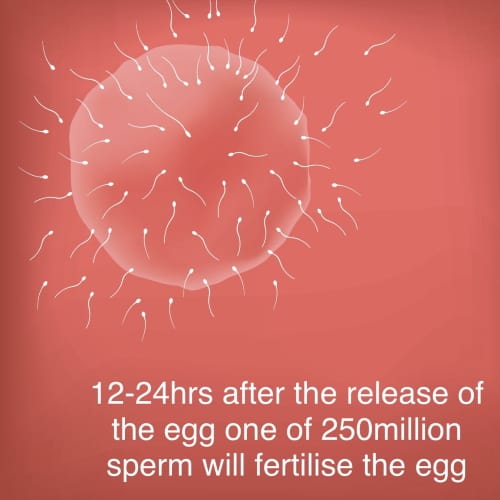
Week 2
An egg ripens and is released by the ovary. This egg then travels down the Fallopian tube towards the uterus.
Your uterus lining will thicken in preparation for pregnancy.
Fertilisation of your egg by the sperm will take place near the end of this week.
Fertilisation or conception occurs when the woman’s ovum is fertilised by the man’s sperm.
The gender and any other inherited characteristics will be decided then.
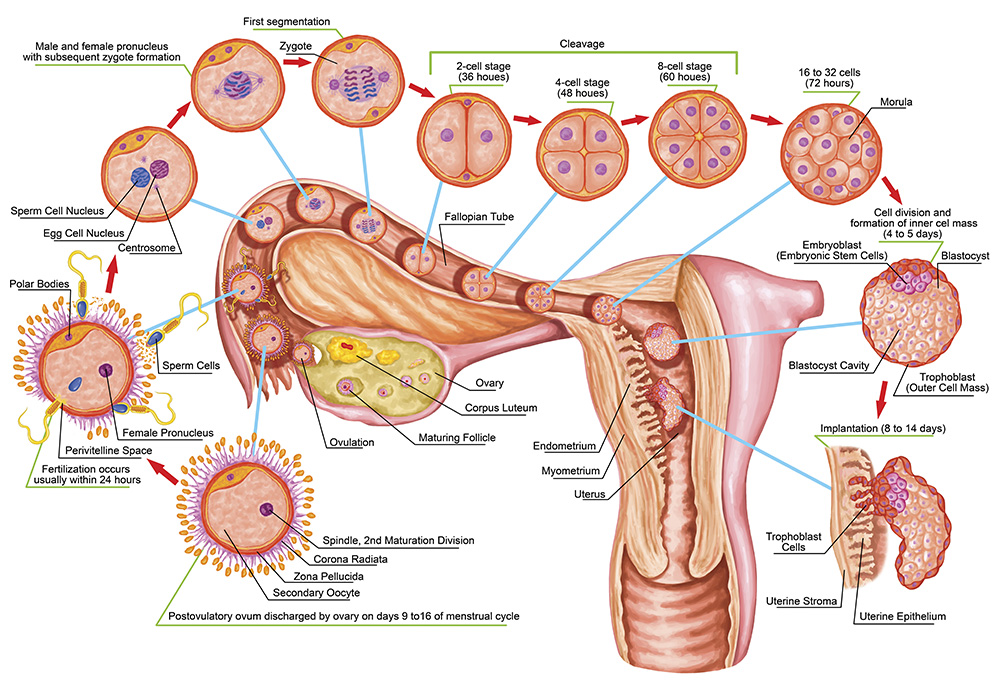
Week 3
If fertilisation occurs the egg starts to divide as it travels down the Fallopian tube.
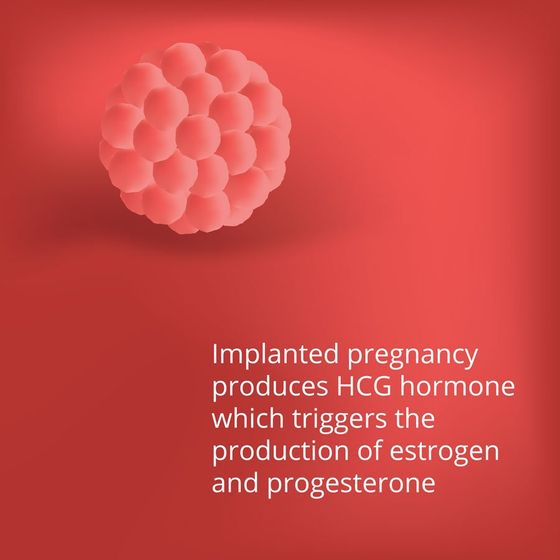
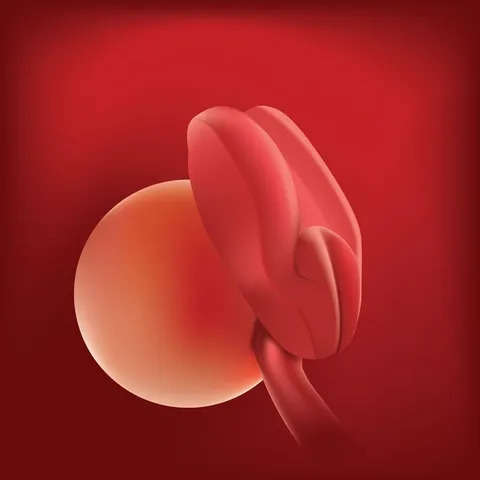
Week 4

Baby is smaller than a grain of rice. At this stage it’s cells are diving rapidly the to form the various body systems, including the digestive system.
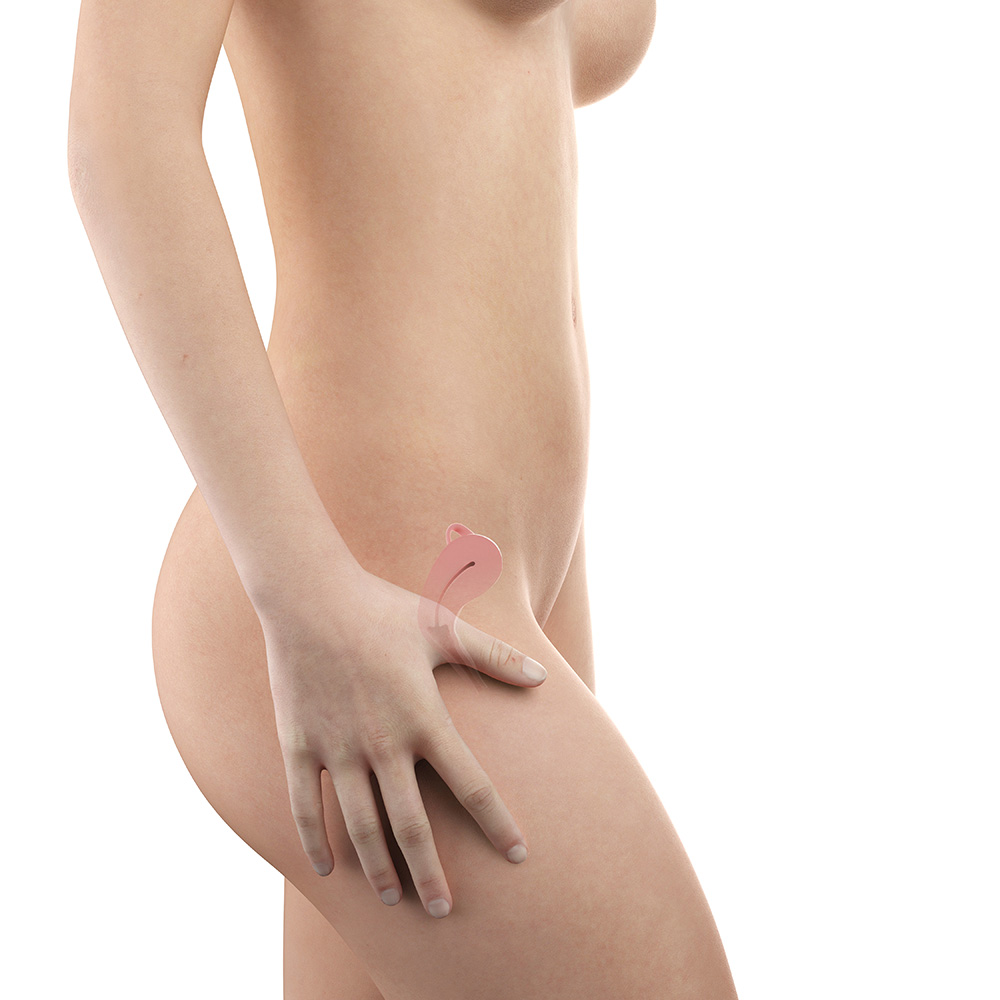
How big is your baby?
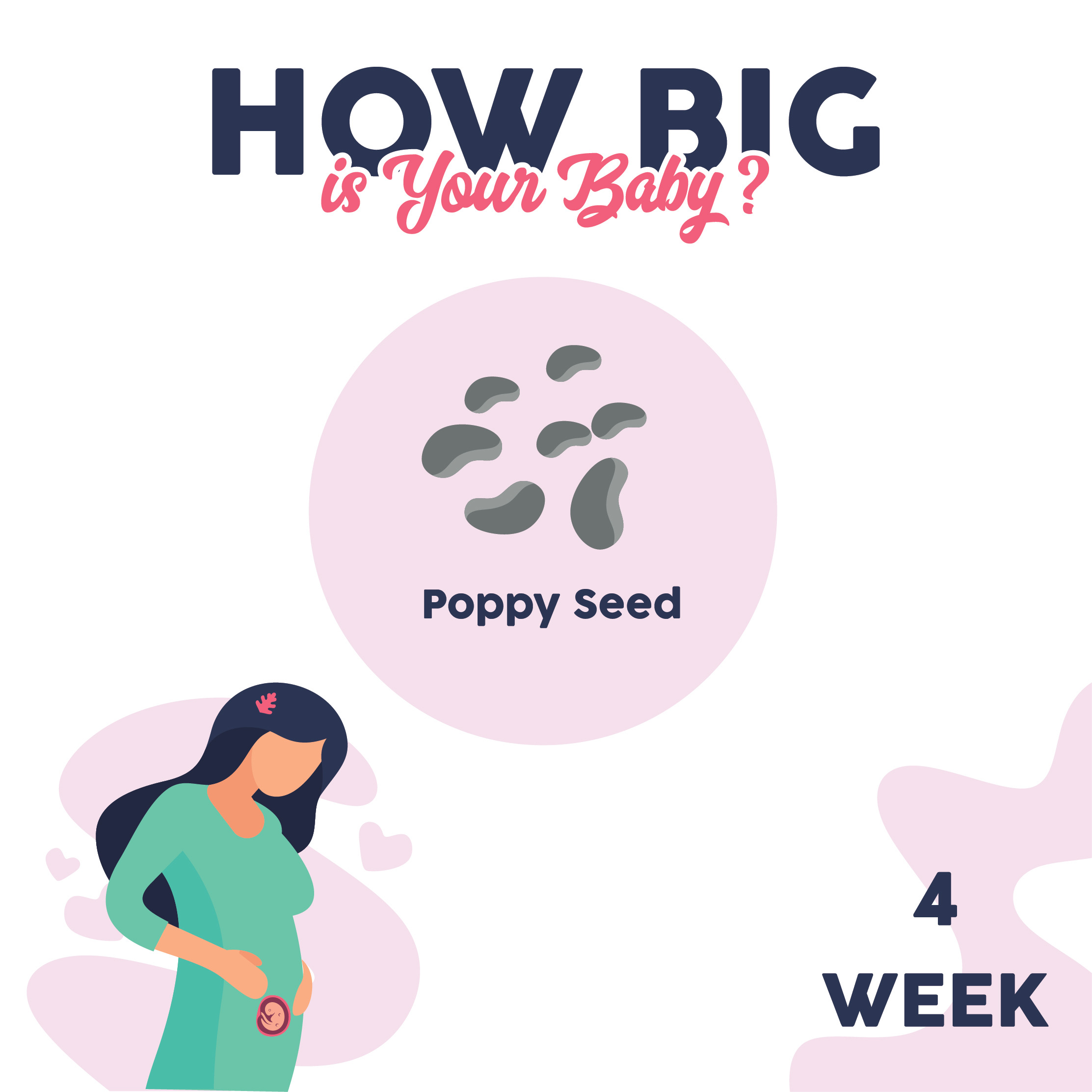

A pregnancy test may show a positive result even before you miss your period.
You may notice pregnancy symptoms such as breast tenderness, the need to urinate more, nausea and mild stomach cramps.
Week 5
The egg is now an embryo and divides into three.
The outer layer: this will form the neural tube that develops into the brain and spinal cord
The middle layer : a bulge forms the heart, that will divide into the four chambers and will start pumping blood around the body.
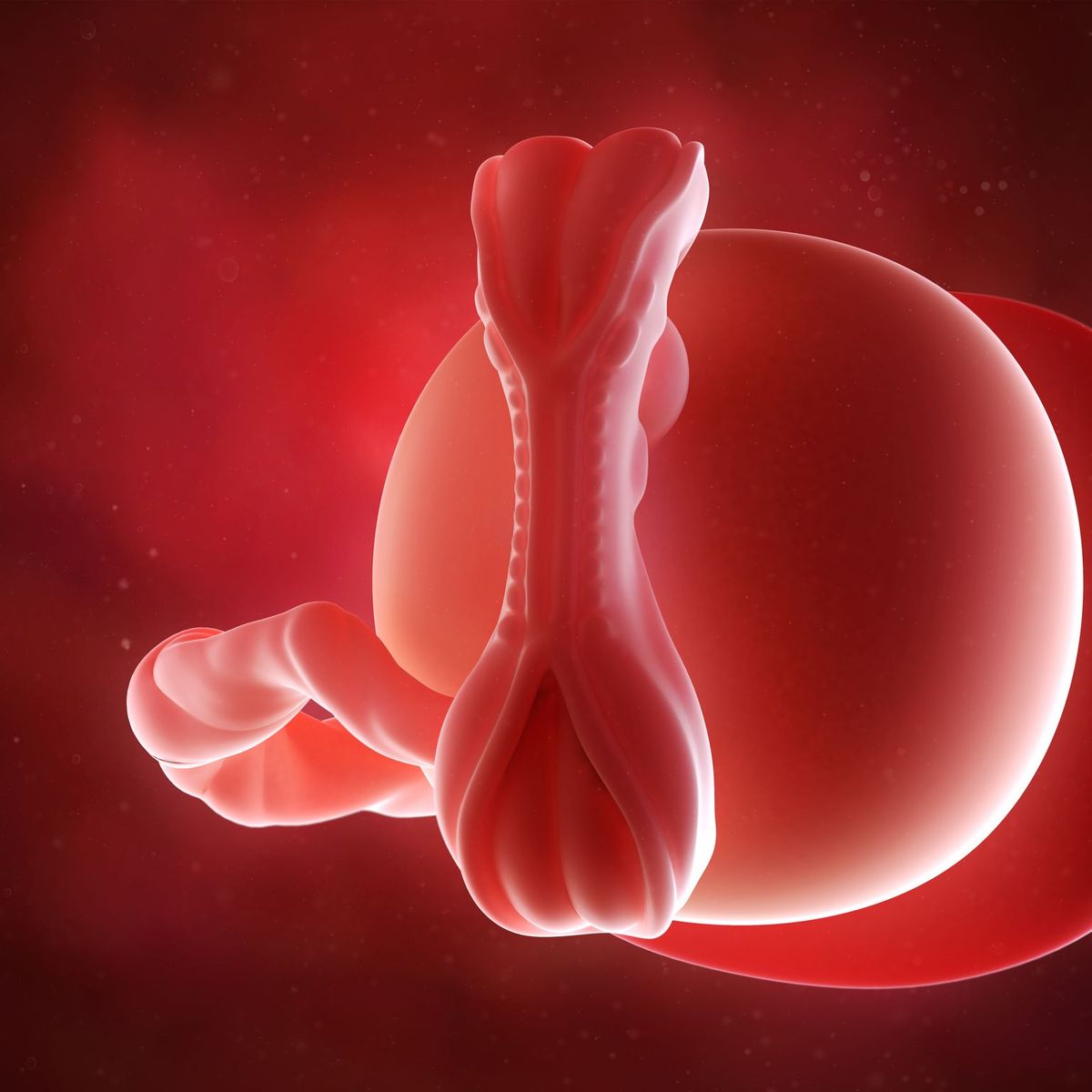
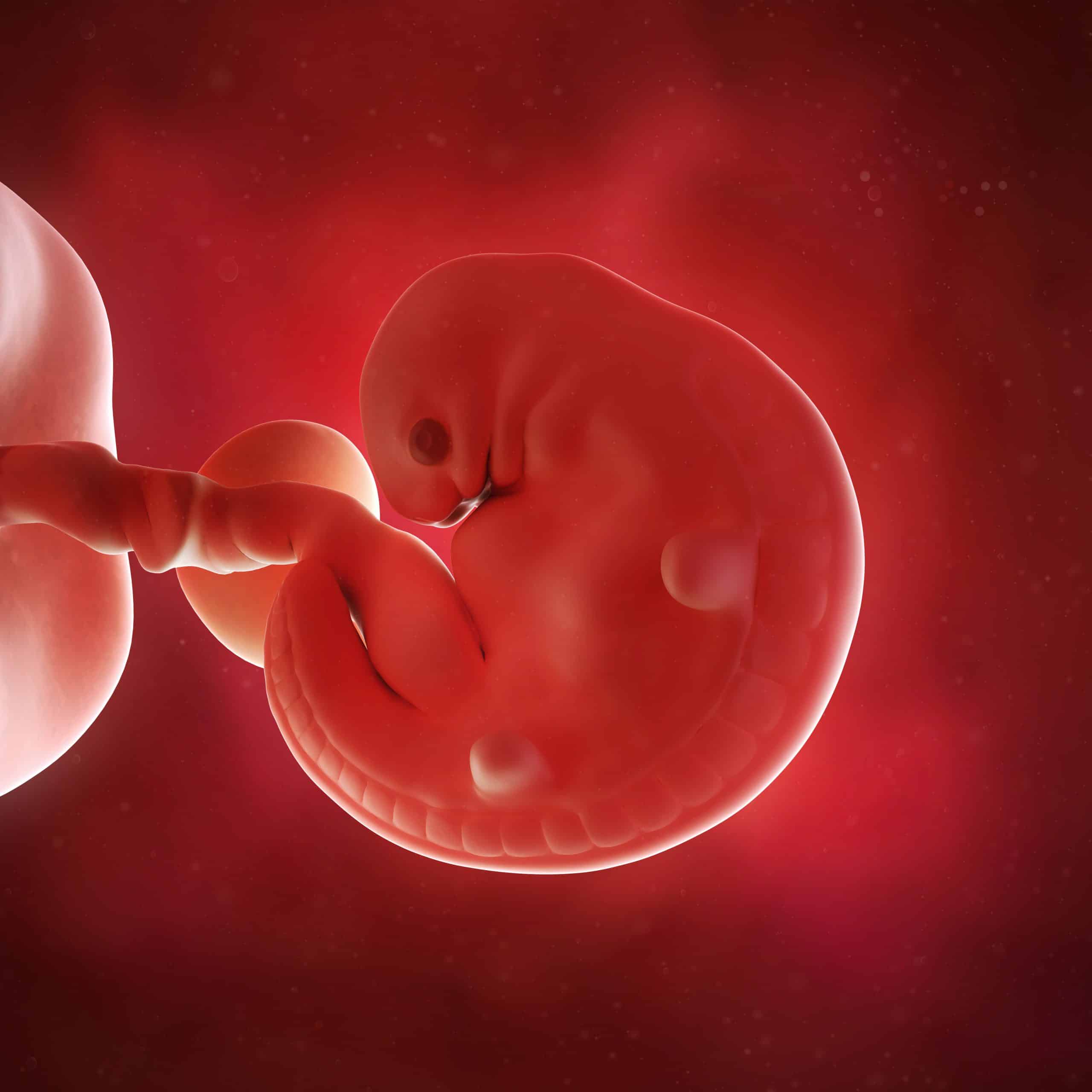
Week 6
You may notice a slight weight gain and some food cravings.
There are a lot of changes going on in your body and you may be feeling more tired than usual.
make sure you listen to your body and rest when you need to.
The embryo is around 3 mm in length. By this stage, it is secreting special hormones that prevent the mother from having a menstrual period.
Baby is developing beautifully.
The intestines bulge to form the stomach. Limb buds develop.
This is a good time to re-evaluate your eating habits.
Below is a chart showing safe and unsafe food for baby.
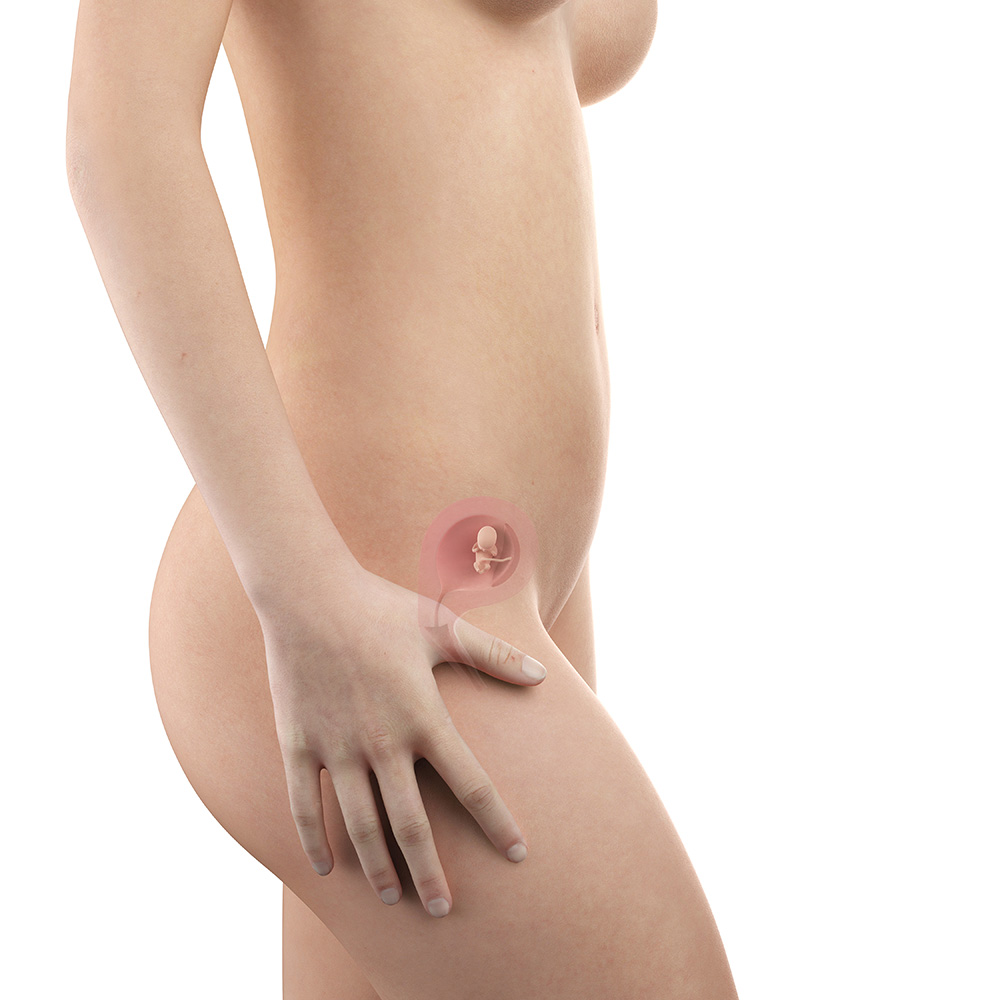
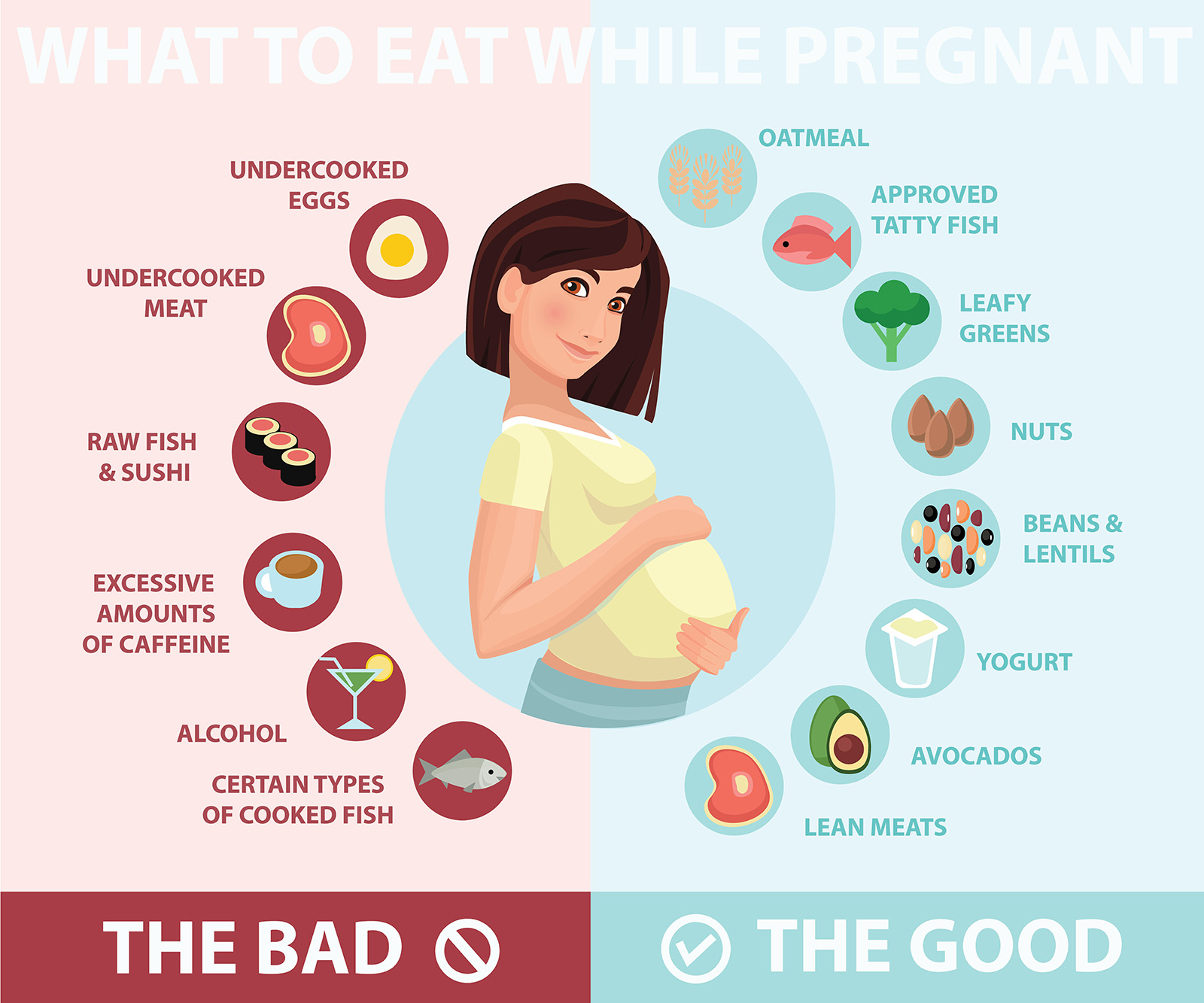
Week 7
Your metabolism speeds up and your heart and lungs become more efficient. Your blood volume will increase to meet the demands of your pregnancy.
Your mucus plug will be well in place to protect the uterus from infection.
Some women will develop a heightened sense of smell and taste. Also nausea and food cravings.
Make sure you’re taking your supplements and iron and you’re eating a balanced diet full of nutrients.
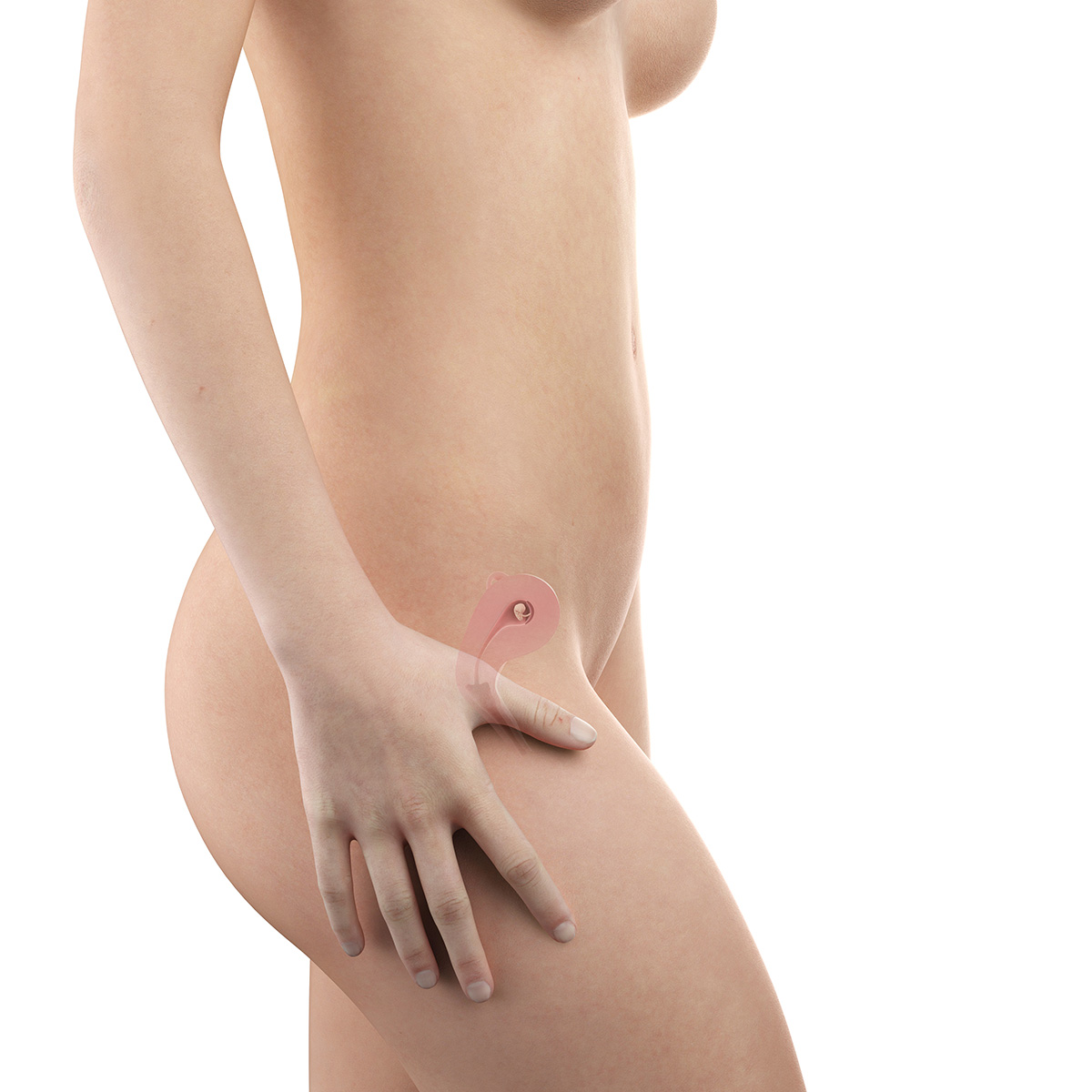

Pregnancy symptoms at 7 weeks
- Frequent urination
- Breast tenderness and changes
- Fatigue
- Food cravings and aversions
- Heartburn and indigestion
- Excessive saliva
Baby at 7 weeks
Baby is the size of a blueberry and 1.2 cm long. The intestine will bulge to form a stomach. Your baby’s limbs are forming and arms are lengthening, legs are growing and elbows, hands and feet are emerging.
Baby is still considered an embryo and will have a tail from their tailbone. Nostrils, lips and tongue have also developed. Amazingly tiny teeth will be sitting under their gums.
The umbilical cord is formed. This is the tube that joins the baby to the placenta.
It delivers oxygen, nutrients and eliminates waste from the baby into your blood stream.
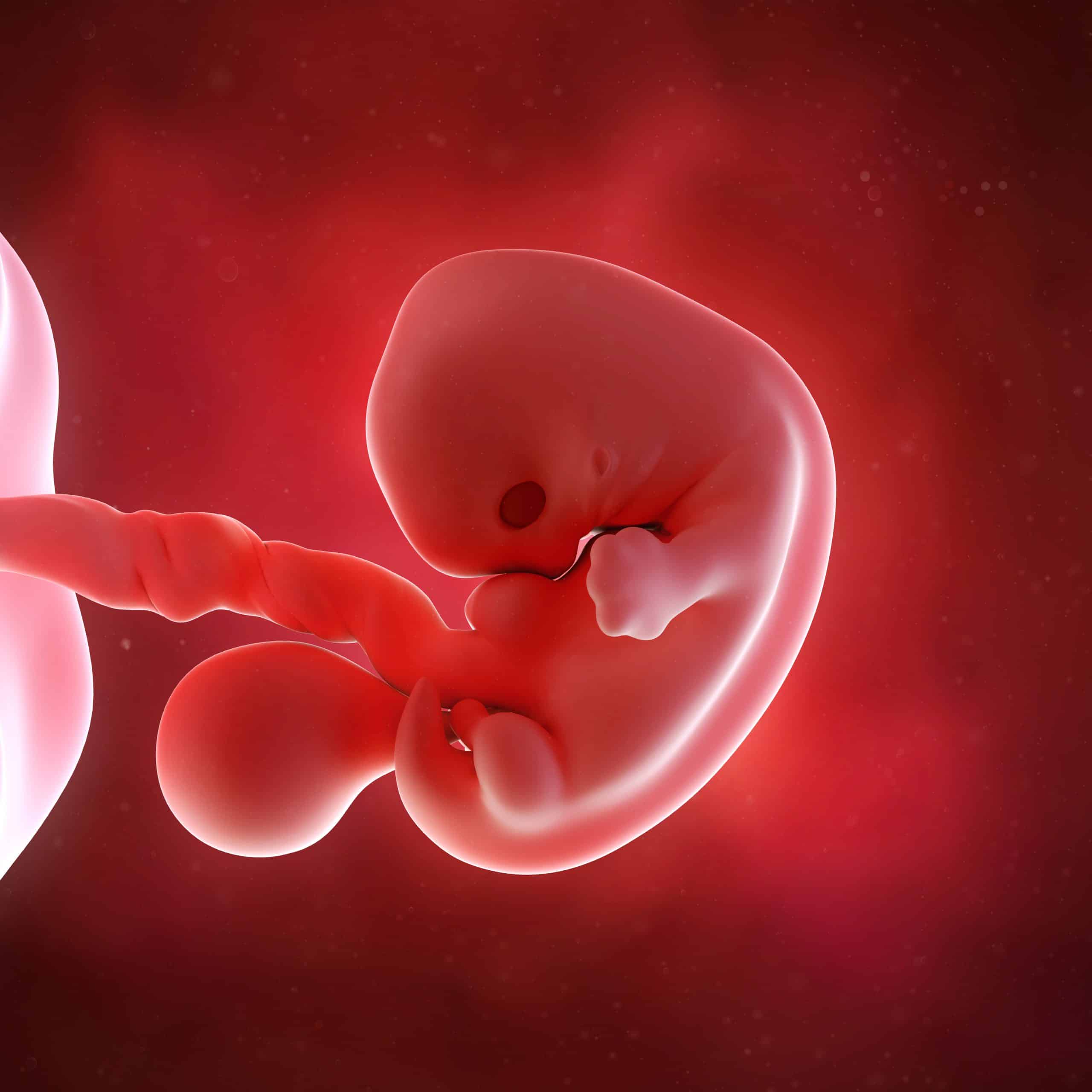

Week 8
It’s a good time to really start looking after yourself. Your uterus is the size of a small grapefruit and may cause backache and extra trips to the bathroom. Though you don’t look pregnant as yet your waistline will be slightly thicker and breast will appear bigger.
Pregnancy symptoms at 8 weeks
- Fatigue
- Nausea and vomiting
- Increased vaginal discharge
- Bloating and gas
- Constipation
- Food cravings and avers
Your baby is as big as a raspberry.
Baby at 8 weeks
Embryo is about 1.4 cm long from head to bottom and weighs around 1g.
All major organs have started to form.
Your Baby now has webbed fingers and toes. Unique fingerprints have formed. Elbows will develop, arms will curve and will be able to move.
The three main sections of the brain are visible and the cranial and sensory nerves start to develop. The tail shrinks and baby starts looking more human.
Though you won’t feel it, your baby will be moving around quite a bit.
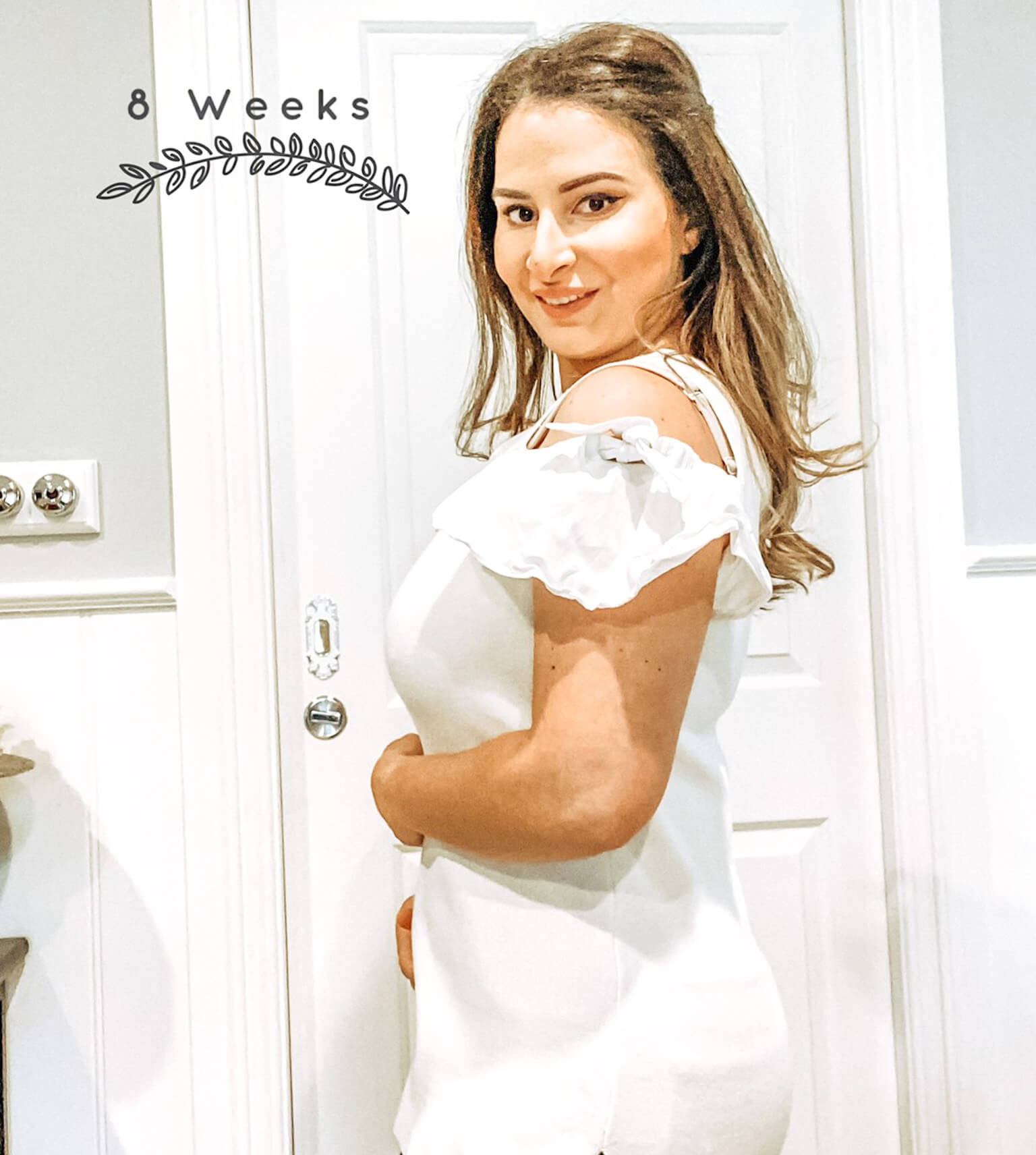
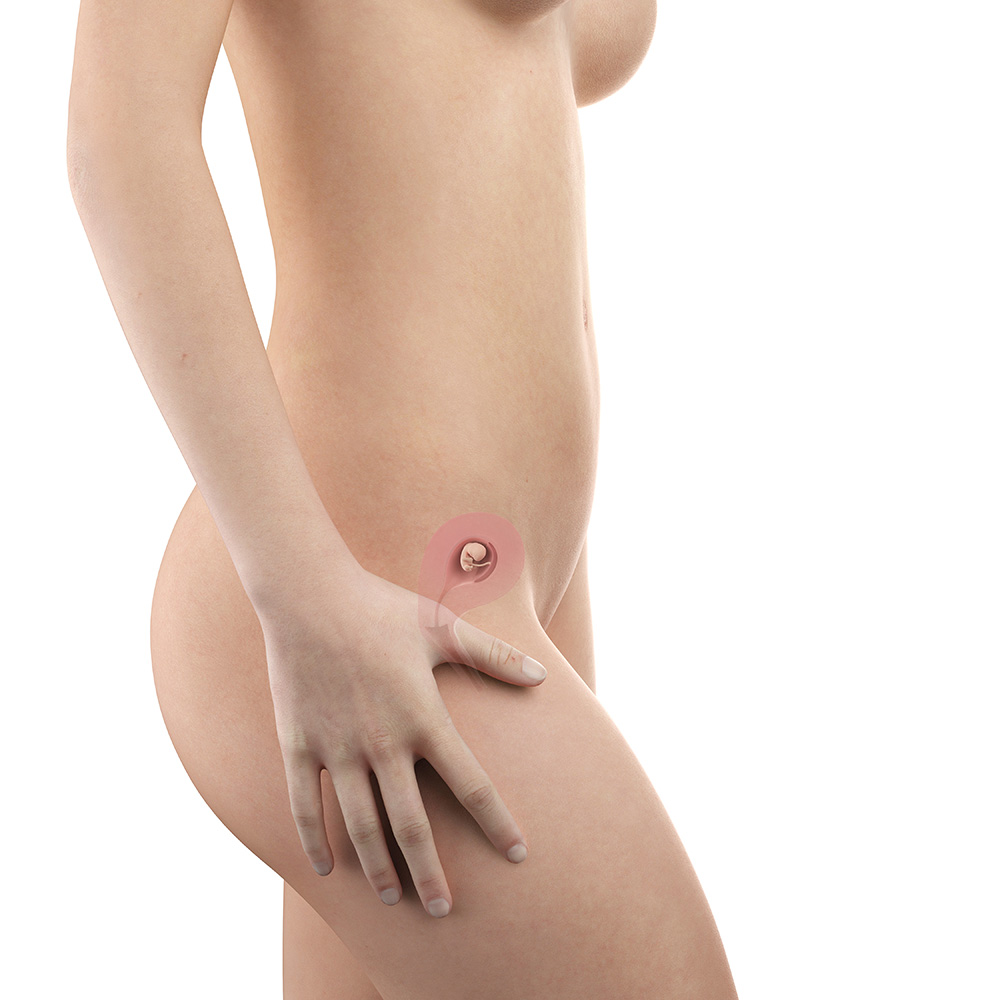
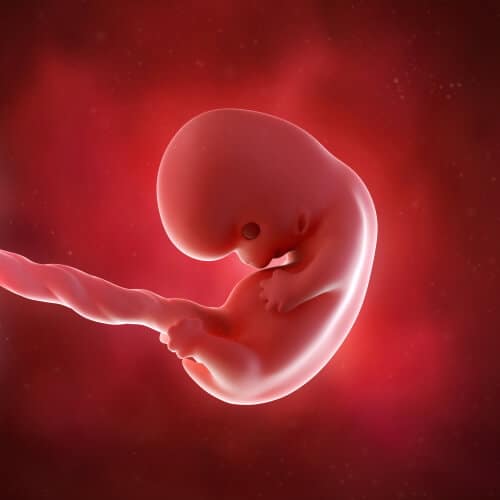
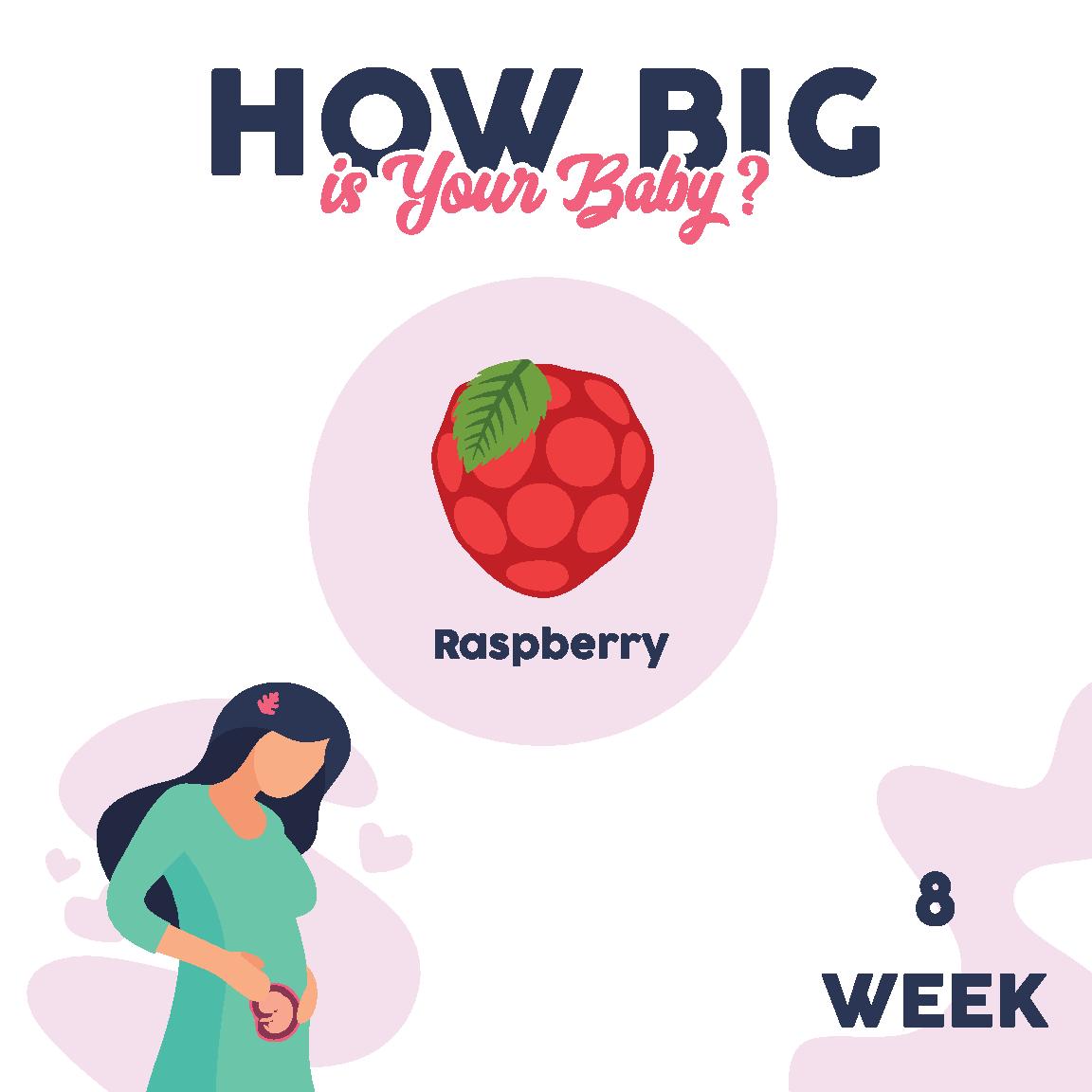
Week 9
You may have had your first appointment with your Doctor or midwife and heard baby’s heartbeat.
Breasts and waistline expand due to fluid retention and increased blood volume. Your uterus will grow and press on your lower spine causing backache.
You may also feel hot due to increased blood circulation. You may continue to have feelings of nausea and it’s important to have small meals and snacks as often as you can and stay hydrated.
You will continue to experience
- Fatigue
- Frequent urination
- Breast tenderness
- Constipation
- Heartburn and indigestion
- Bloating and gas
Baby at week 9
Baby is now 2.3 cm long and weighs 2g.
Baby is starting to look more human and the embryonic tail has completely gone. Nose, mouth and lips are almost fully formed. The eyes have moved to the front of baby’s face but the eyelids remain fused over the eyes. Bones and muscles have also started to grow.
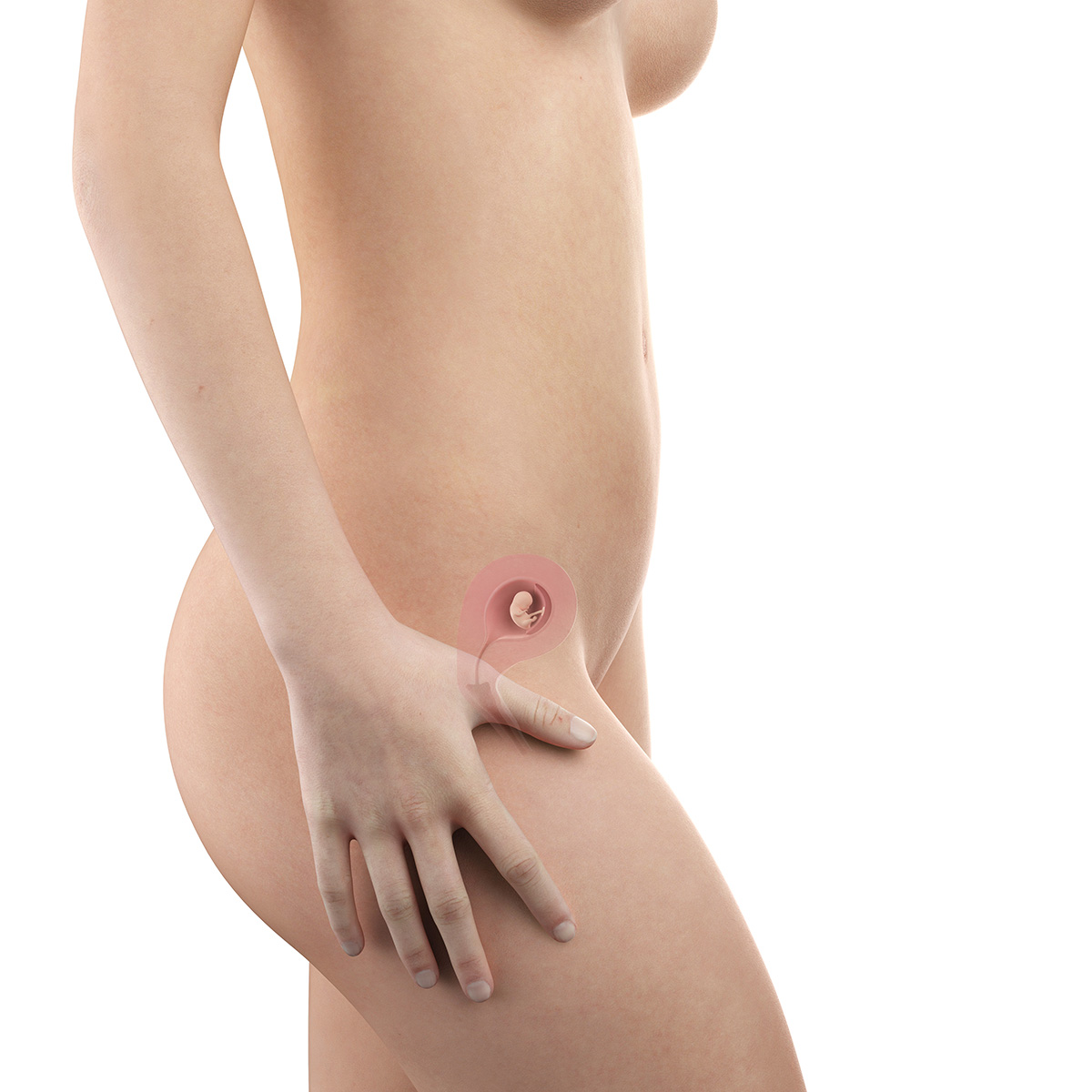
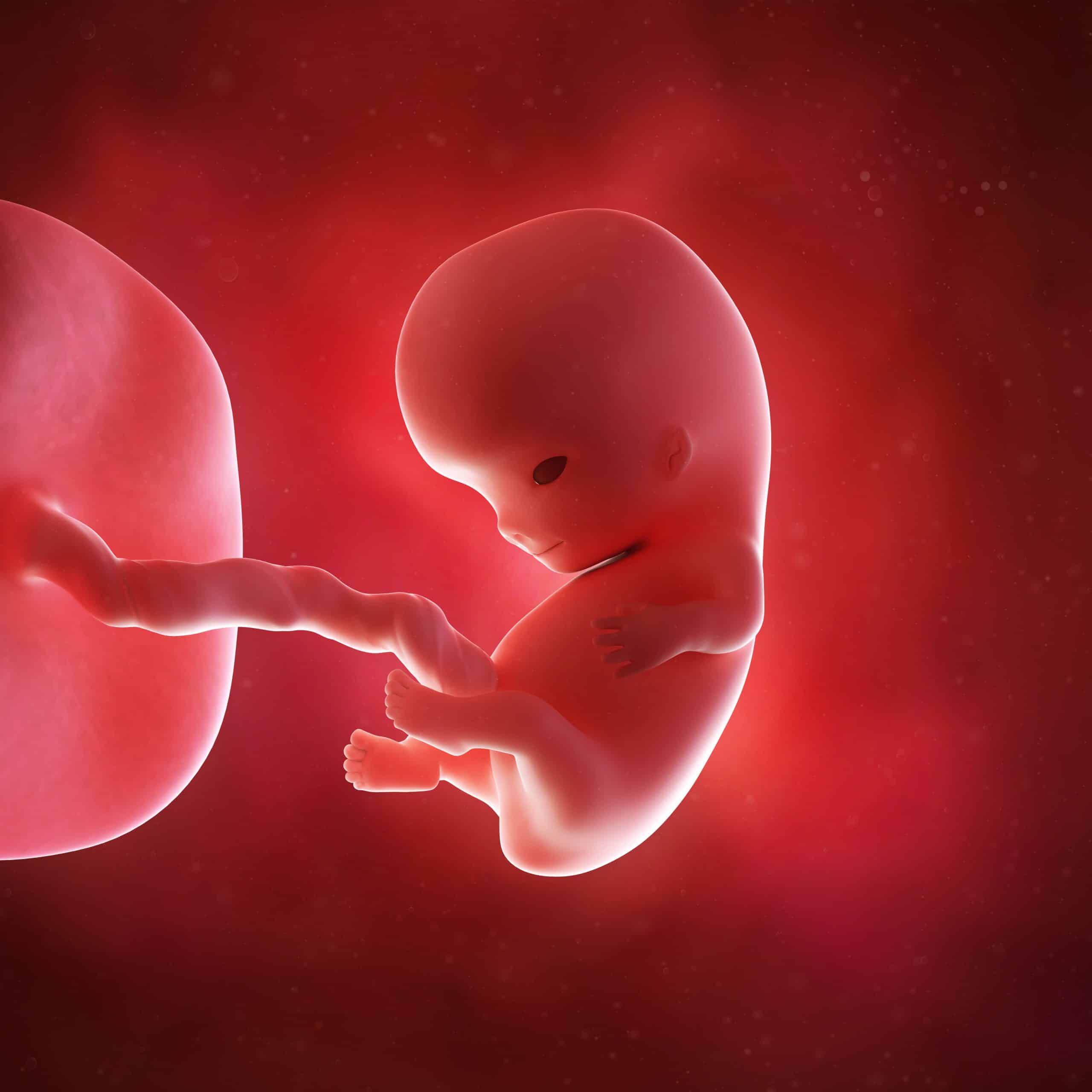
Week 10
Your respiratory system will adapt to take in more air due to the increased demand that pregnancy brings.
You’ll be feeling tired and nauseous. Eating small amounts of food and sipping water throughout the day can alleviate these symptoms and keep you hydrated.
Pregnancy symptoms
Hormonal changes will give you increased vaginal discharge and may make you feel uncomfortably hot.
- Constipation
- Nausea
- Vomiting
- Fatigue
- Food aversions
- Heartburn and indigestion
- Bloating and gas
- Increased vaginal discharge
- Occasional headaches
- Faintness or dizziness
- Visible veins
Baby at Week 10
3 cm long and weighing around 4g, baby is about the size of a prune. Your embryo is now called a fetus.
Baby moves around vigorously. Facial features are recognisable. Foetal cartilage starts to harden and ossify into bone. Hormones prompt the development of testes or ovaries and amazingly, the ovaries start producing eggs. External genitalia start to develop but it’s not possible to identify baby’s gender.
Nose, mouth and lips are almost fully formed and eyes have moved to the front of baby’s face. Eyelids are fused over the eyes. Buds from the bladder grow upwards to join with developing kidneys.
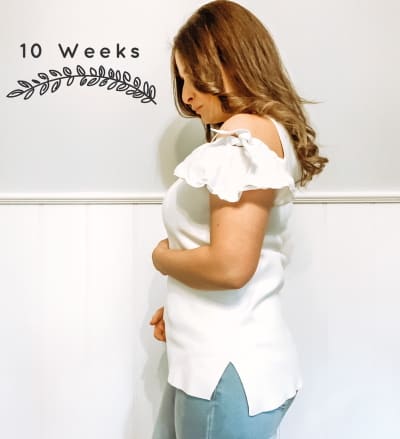
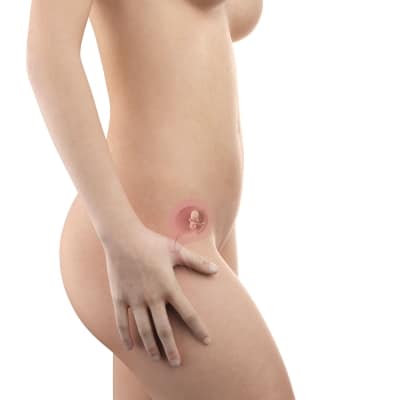
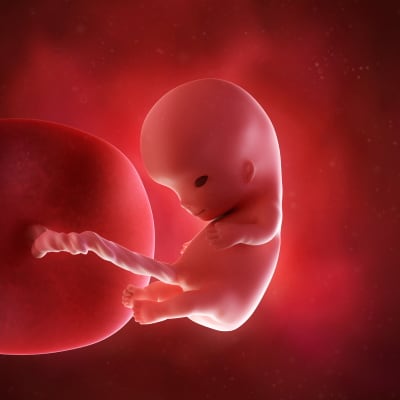
Week 11
You’ll start noticing your clothes becoming tighter and your tummy will start to enlarge and protrude.
You’ll start feeling breathless when you exert yourself due to the extra workload on your heart and lungs.
Your uterus has moved out of your pelvis, reducing pressure on your bladder, reducing urinary symptoms.
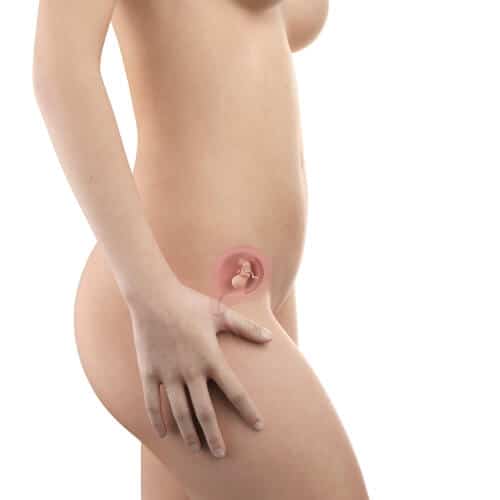
FREE Birthing Education (Normally $117)
It is good time to consider your options for birthing education and we are offering our patients complimentary access to a three course Antenatal Bundle by ‘Nourish Baby’ as part of their care under Dr. Tilak Weerasiri. It is the only online antenatal classes by the childbirth and parenting educators of Australia and the australian council of healthcare standards. You will love these on-line Antenatal and parenting classes. Click on link to go to their site.
Click here for more details – https://nourishbaby.com.au
(Please call our rooms for more information and access code)
Pregnancy Symptoms Week 11
Varicose veins
Breast tenderness
Nausea and vomiting
Food cravings
Food aversions
Bloating and gas
Haemorrhoids
Faintness or dizziness
Scan 11 weeks
Baby is becoming a little person.
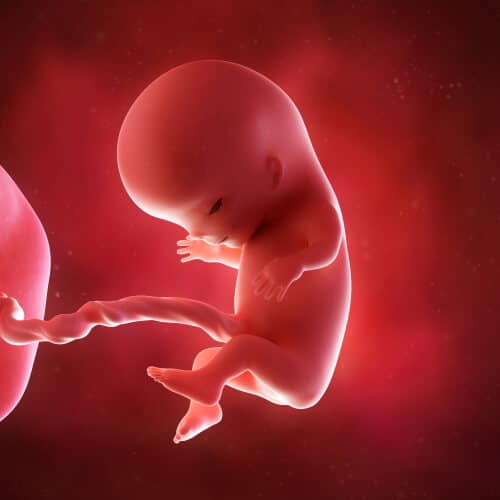
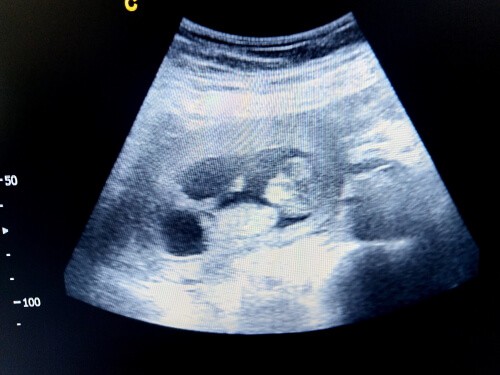
Week 12
If you have your prenatal check in week 12 you’ll be able to hear your baby’s heartbeat. You may also have a dating scan done. some ladies will now start to look pregnant and you may have to adjust your clothing. Hormonal changes may cause nipples and areolae to get darker. If you’ve experienced nausea and vomiting this may pass around 12 weeks. The feeling of tiredness will give place to increased energy.
Your uterus has moved above your bladder relieving pressure on your bladder.
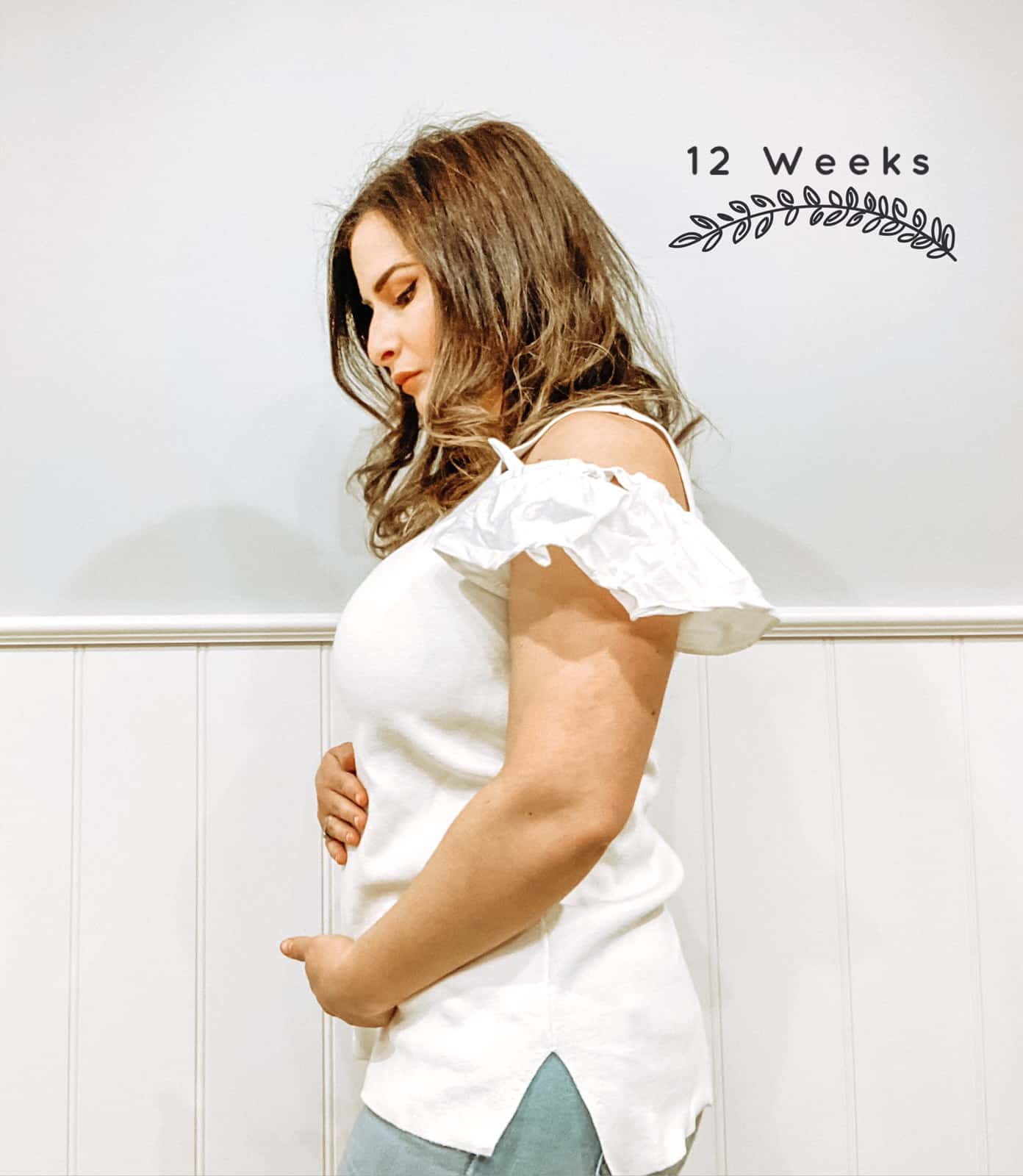
Pregnancy Symptoms Week 12
Trips to bathroom start to reduce.
Headaches
Bloating and gas
Excessive saliva
Dizzy spells
Heartburn
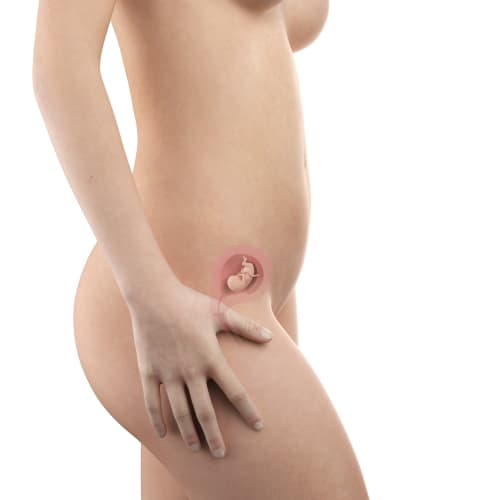
Your Baby at Week 12
Baby is now the size of a plum weighing about 14g and 5.5cm long.
Baby can suck his thumb, fist and urinate. Fetus starts to produce hormones and genitals will become visible outwardly. Brain cells develop into two distinct halves that controls the opposite side of the body. Head growth slows down, external ear begins to resemble a fully formed ear. Eyes are large and spaced wide apart and will remain fused till the 26th week. Arms and legs make simple movements, but you won’t be able to feel them.
Nose, mouth and lips are almost fully formed and eyes have moved to the front of baby’s face. Eyelids are fused over the eyes. Buds from the bladder grow upwards to join with developing kidneys.
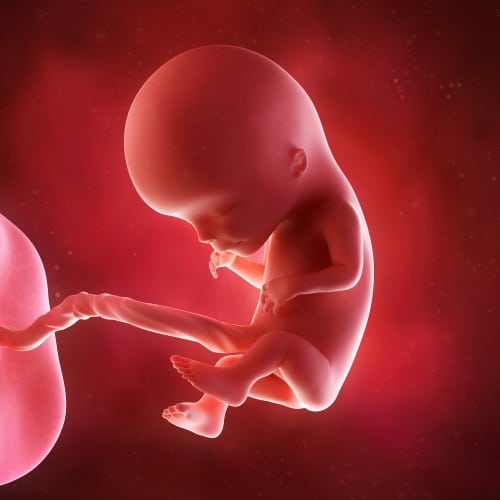
Week 13
13 weeks is the last week of your first trimester. The fetus continues to grow and develop.
The increase of blood volume will give you a healthy glow. The fundus or the top of the uterus will continue to rise at the rate of 1cm a week. This is the measurement used to estimate the week of pregnancy.
You should have your flu shot around 12-13 weeks
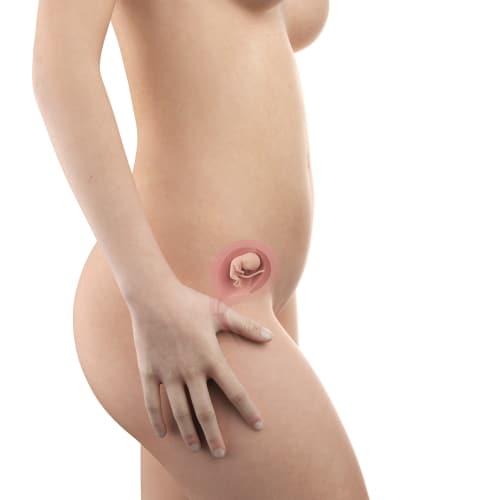
Pregnancy Symptoms Week 13
Constipation
Indigestion
Dizziness
Visible veins
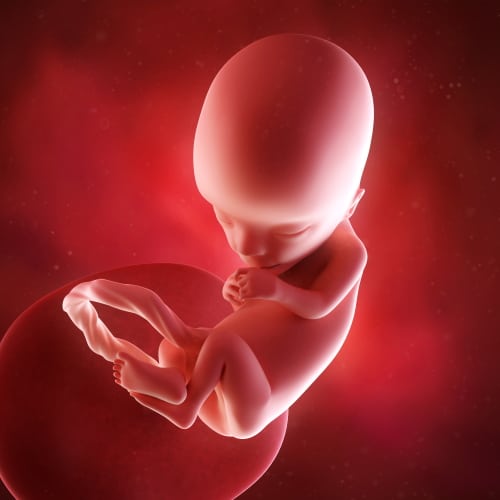
Your Baby at Week 13
Baby is now the size of a large lemon, weighing about 25g and 8cm long.
Neck has lengthened and and chin doesn’t rest on the vest anymore. If you have a scan the vertebrae can be seen. The head represents half of the crown to rump length. The movements are unco-ordinated. The first white blood cells are produced.
Although all the body systems are in place, the fetus is not capable of independent life.
Week 14
14 weeks marks the start of the second trimester.
The placenta will have a second wave of growth and anchor more firmly to the lining of the uterus. The fetus is growing rapidly and you will start to look pregnant. You may be offered a number of screening tests, such as NIPY, around now to assess foetal development and to detect any abnormalities. Foetal abnormalities can be detected by measuring the different placental hormones in the blood.
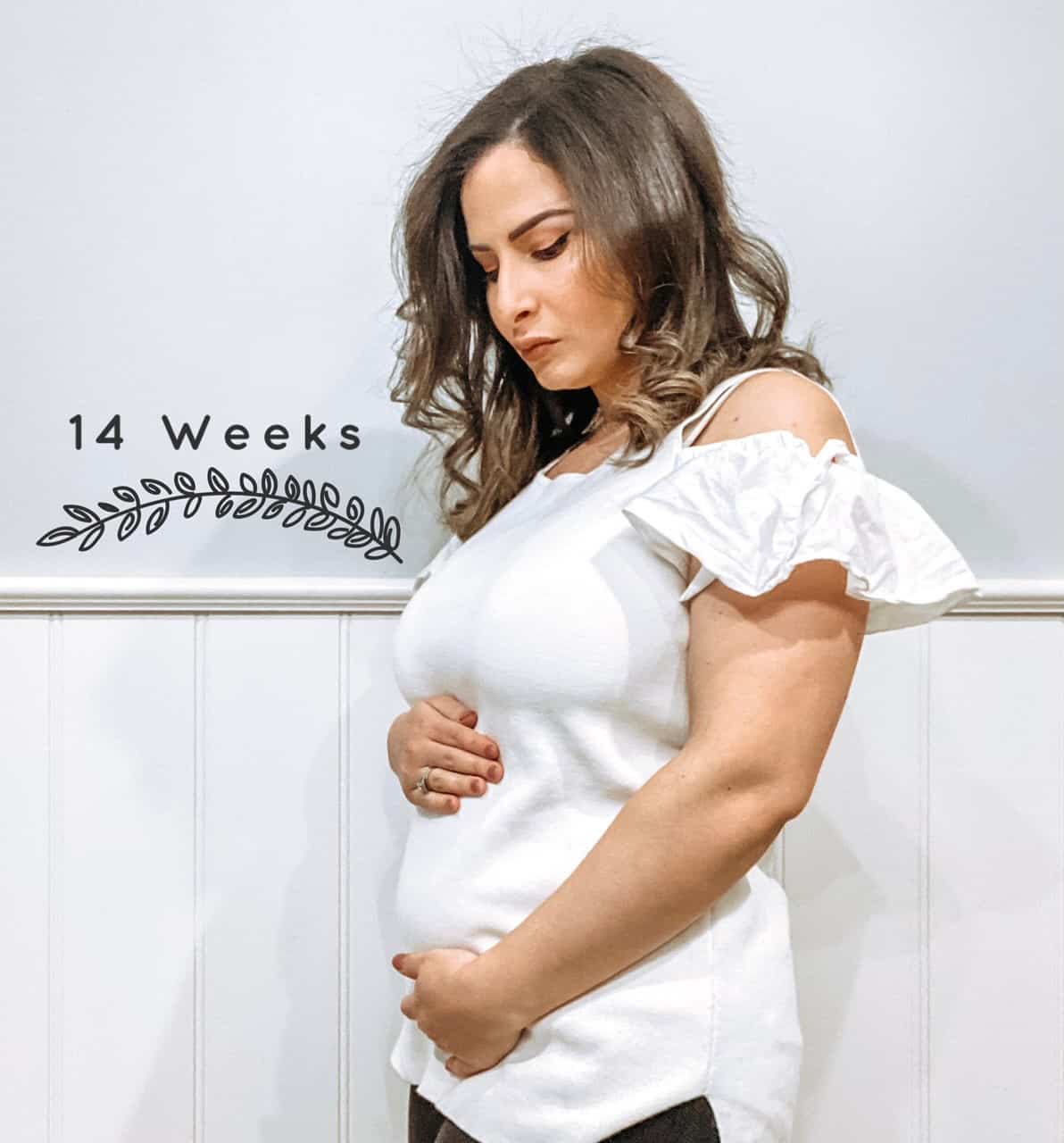
Pregnancy Symptoms Week 14
Decreasing fatigue
Breast growth
An increase in appetite
Varicose veins
Stuffy nose
Increased weight
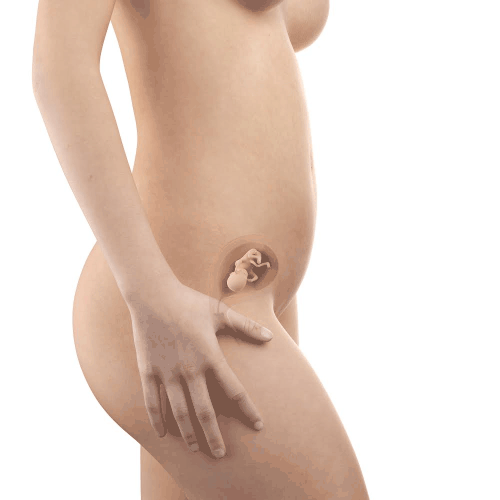
Your Baby at Week 14
In the second trimester your fetus is growing rapidly and will triple in size.
Fetus is around 10cm long, weighs around 45g and is about the size of a nectarine. The spine straightens out and body is more in proportion to head. The kidneys are developed sufficiently to produce tiny amounts of urine and the bladder fills and contracts every 30 minutes, it holds less than a teaspoon full of liquid.
Super fine hair called lanugo, has grown all over the foetal body, which will help them keep warm until they get enough body fat. Fetus is now full of energy and very active, you still may not be able to feel them.
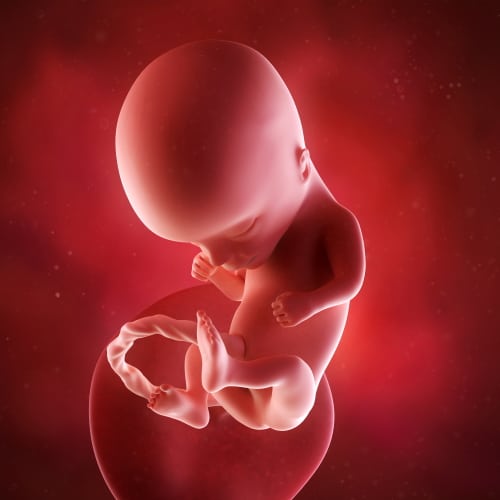

Week 15
Week 15 pregnant belly with visible uterus and fetus.
Morning sickness should have subsided for most of you and you’ll be experiencing some new pregnancy symptoms. Your gums will be inflamed and may bleed. It’s advisable to practice good oral hygiene, like brushing your teeth at least twice a day and regular visits to the dentist. A diet rich in protein, calcium, vitamins B, C and D will help prevent bleeding gums. Fetus will be moving around vigorously but you still won’t be able to feel movements due to its size.
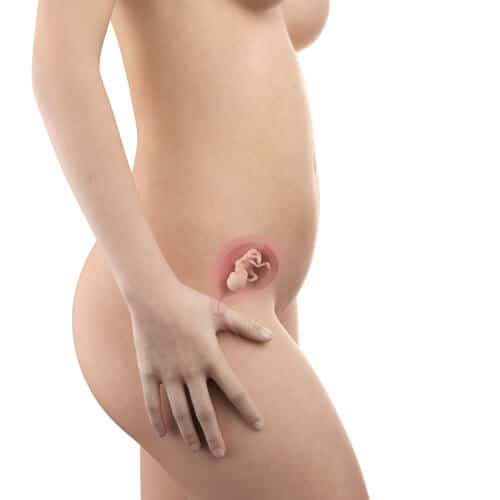
Pregnancy Symptoms Week 15
Inflamed bleeding gums
Heartburn and indigestion
Varicose veins
Faintness or dizziness
Occ AWS asional headaches
You may also experience Pregnancy brain
Your Baby at Week 15
Baby is around 16.5 cm’s, weighs about 70g and is about the size of an apple The first hair follicles are forming and the skin thickens forming three distinct layers. The fetus is growing and to build its muscles and organs amino acids are extracted from the mothers blood. The amniotic fluid acquired flavours from the mothers diet and the fetus is now able to drink it. Fetus lung is also expanding. An ultrasound may be able to identify the goetus’ gender as the external sex organs will now be visible.
Within the ovaries of female fetus hundreds and thousands of eggs will be forming. The ovaries will also move down to the pelvis from the abdomen. The umbilical cord is thickening and lengthening as it carries oxygenated blood, rich in nutrients from the placenta to the fetus and returns deoxygenated blood and waste to the mothers womb.
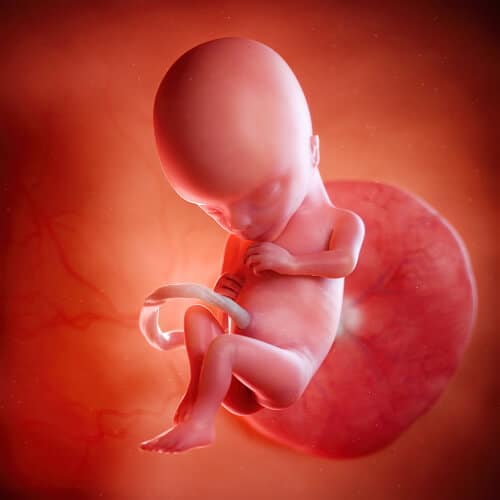
Week 16
A fall in blood pressure and rising hormone levels are the significant changes in the second trimester.
If it’s your first baby, there’s a lot to learn download this free guide to pelvic health in pregnancy by ‘nourish baby’.
We also offer complimentary access to ‘nourish baby’ 3 course antenatal bundle to all our patients over 12 weeks gestation.
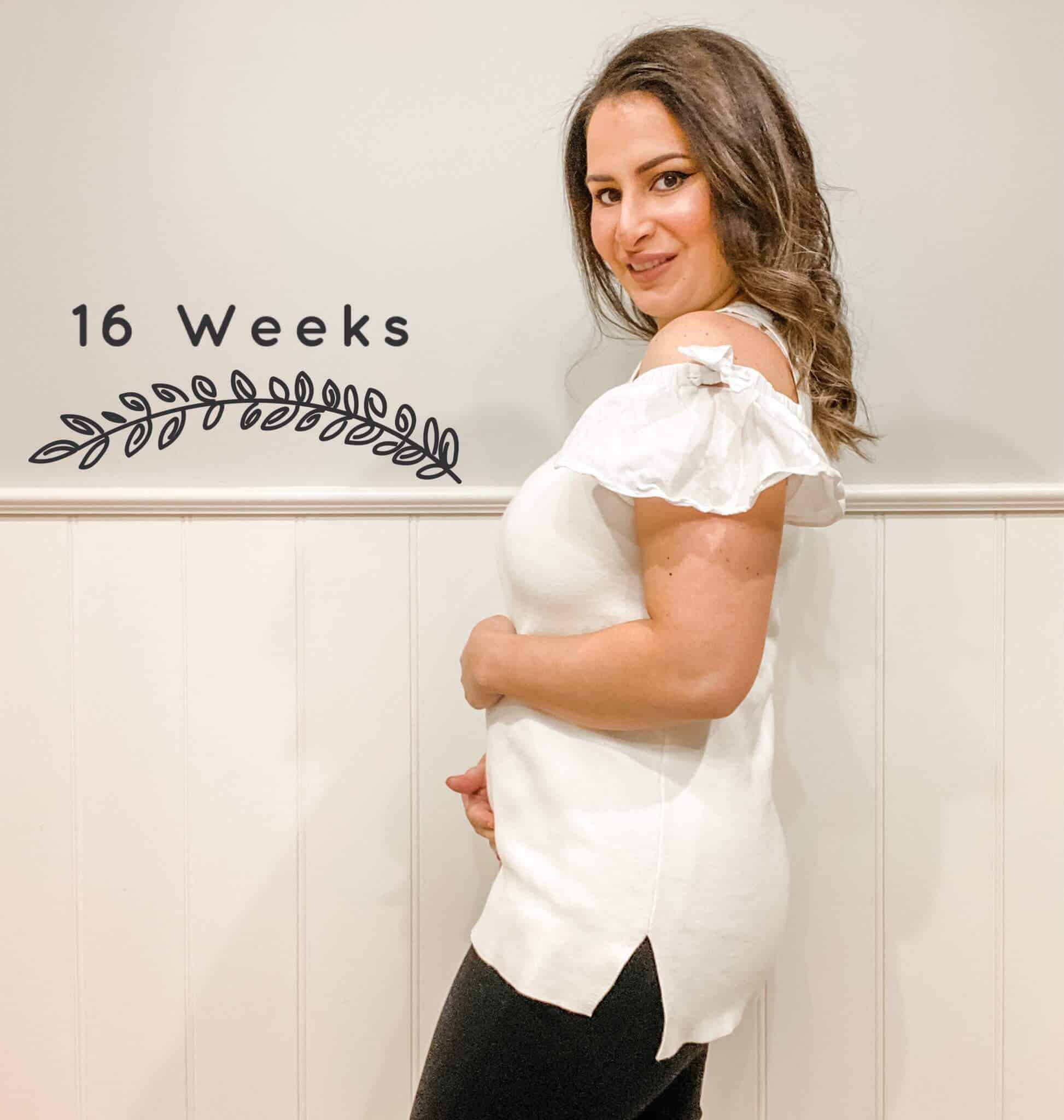
Week 16 pregnant belly with visible uterus and fetus.
The rapid growth of your uterus will mean that your pregnancy will start to look obvious. As your body swells you may have to buy some new clothes to make you feel beautiful in your new size. Continuing to eat well and choosing a diet high in nutrients will mean you’ll have a healthy baby. Pregnancy hormones will cause nasal congestion. You may be offered an amniocentesis if there is a significant risk of the fetus developing a serious condition.
Amniocentesis – A sample of amniotic fluid is tested to detect foetal
age, sex, chromosomal abnormalities, neural tube defects, inherited
diseases and foetal Rh factor sensitisation.
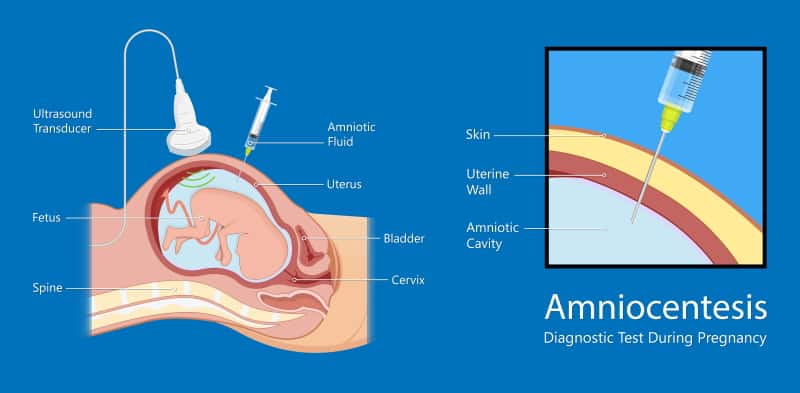
Pregnancy Symptoms Week 16
Nasal congestion
breast growth
Constipation
Vaginal discharge
Varicose veins
Backaches
Bleeding gums
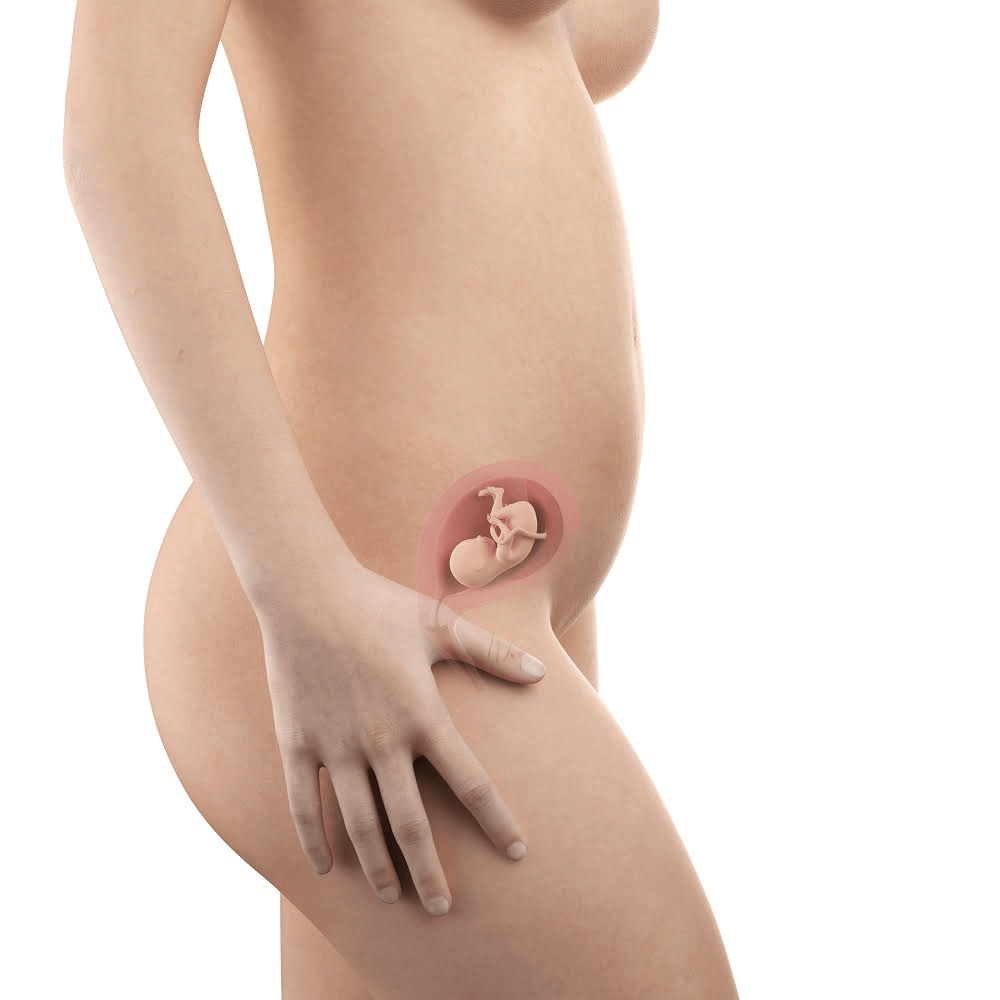
Your Baby at Week 16
Baby is now the size of an avocado, weighs around 100g and 12cm from head to bottom. It’s a great time to talk to baby now as they can hear you. Baby’s face is now obviously human. Eyes are in their forward position and ears and moving towards their final position. A foetal heart monitor will be able to pick up heartbeat quite easily, it’s heart rate is twice as fast as the mothers. The first white blood cells are produced in the liver, thymus and spleen but are not effective at combating infection yet.
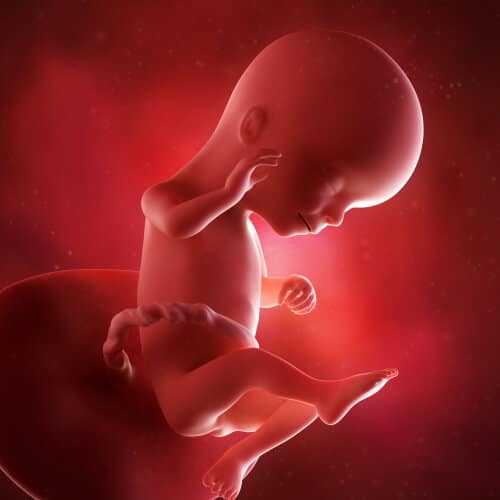
Week 17
You will start feeling baby move around now. Don’t worry if you can’t as it varies for each individual. You may notice an increase in skin pigmentation and the appearance of a dark line from naval to pelvis, called the linea nigra. You may also notice brown patches on your cheeks.
These pigment changes will lighten or disappear after your baby is born. Your breasts will be enlarging and nipples and areolae will darken. Your skin around your breasts and stomach will be feeling itchy due to the stretching and you may find a good moisturiser helps.
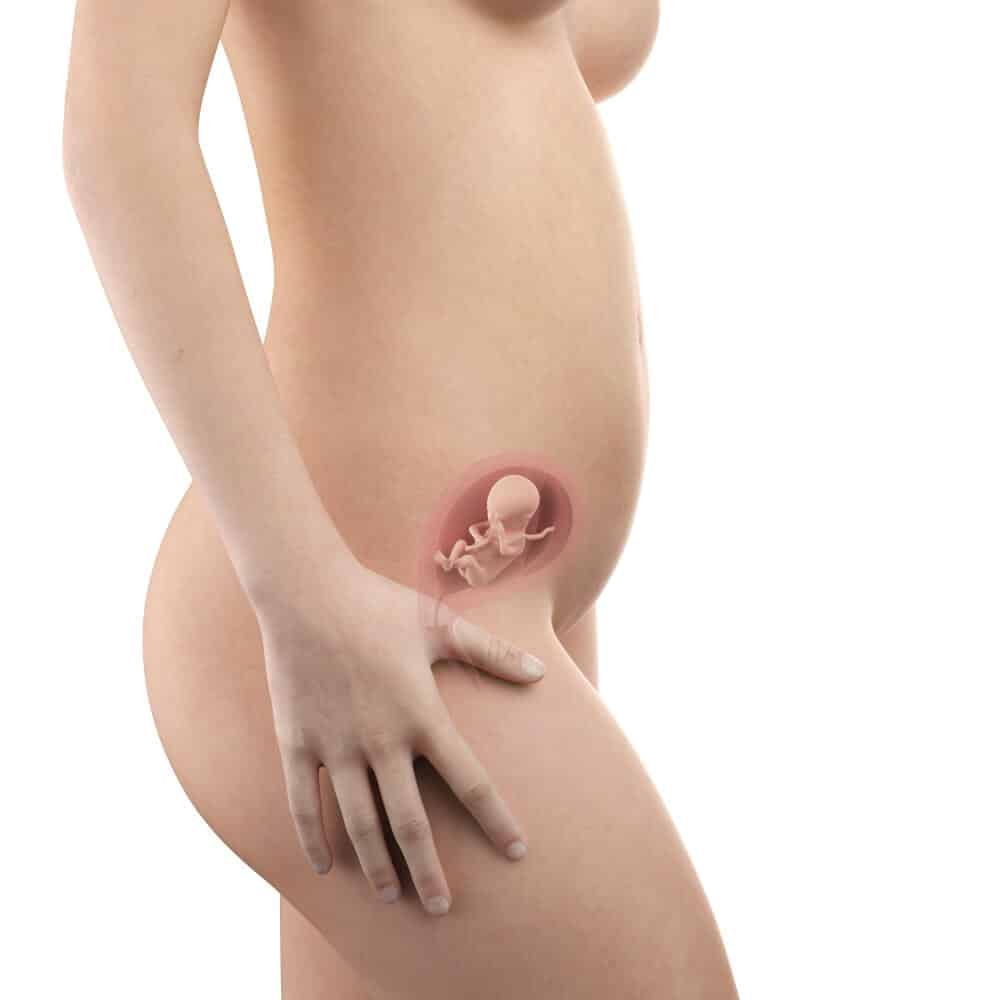
Pregnancy Symptoms Week 17
Increased pigmentation
Increased appetite
Increased breasts
Occasional headaches
Faintness or dizziness
Heartburn and indigestion
Itchy skin
Stretch marks
17 week fetus
Fetus is now the size of an pear, weighs around 140g and 14cm from head to bottom. The fetus is now larger than the placenta and the different body parts grow at different rates. Also gaining fat right now and the nervous system is developing at a fast pace.
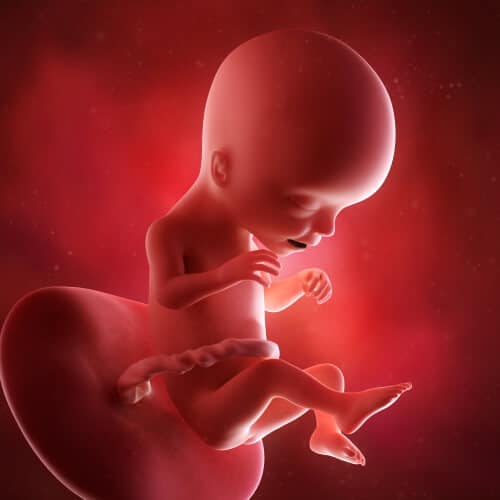
Week 18
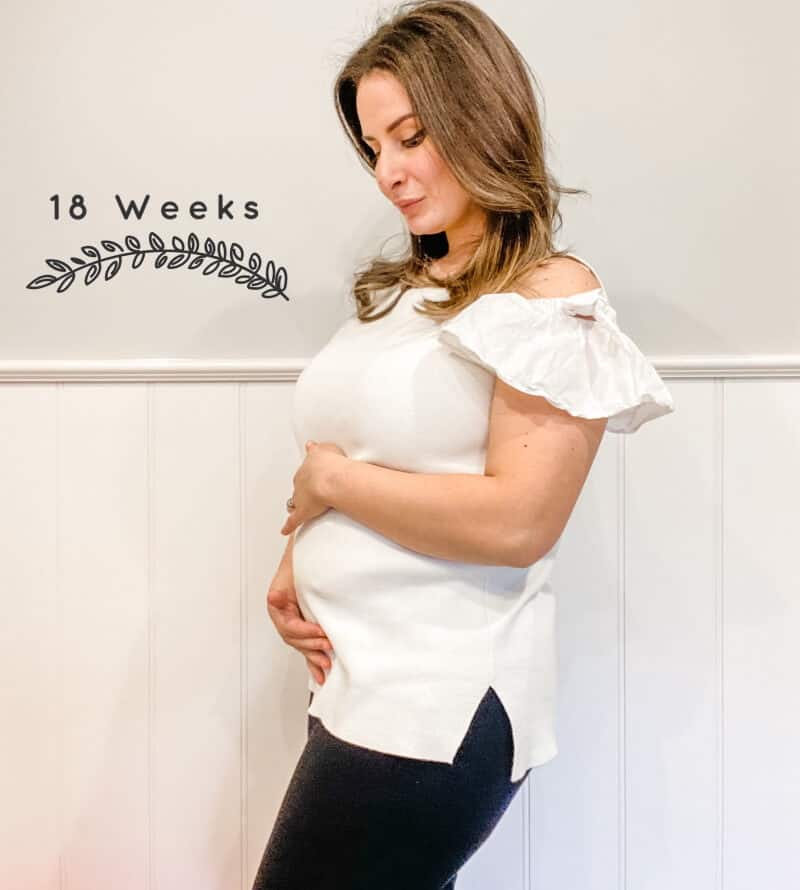
Week 18 pregnant belly with visible uterus and fetus.
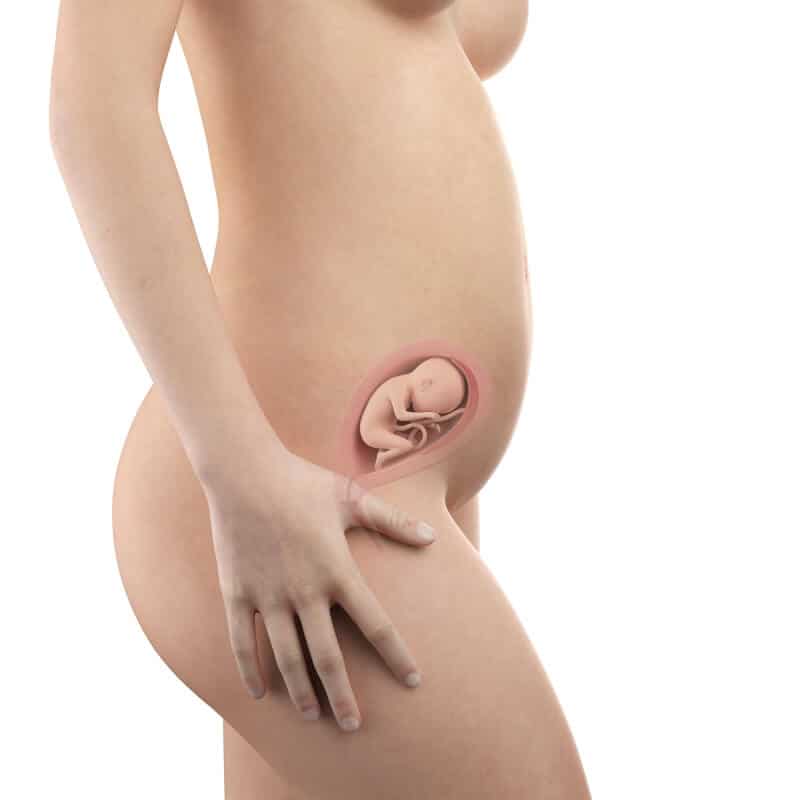
Noticeable Fetal movement
Bloating and gas
Swelling in feet and ankles
Itchy skin
Back pain, because your growing uterus shifts, your center of gravity and your lower back is pulled forward while your abdomen is thrust out.
The pregnancy hormone relaxin is relaxing all your ligaments including those that attach your pelvic bones to your spine, and loosening all your joints
Remember if you have any concerns, call your doctor.
18 week fetus
Fetus is now the size of a big tomato weighs around 190g and 14.5 cm from head to bottom. Fetus skin is no longer translucent. Mouth, nose, eyelids and eyebrows are fully formed. Fetus can make facial expressions and drinks the amniotic fluid Fetus has tiny fingerprints, girl and boy parts are defined. Baby can yawn and hiccup.
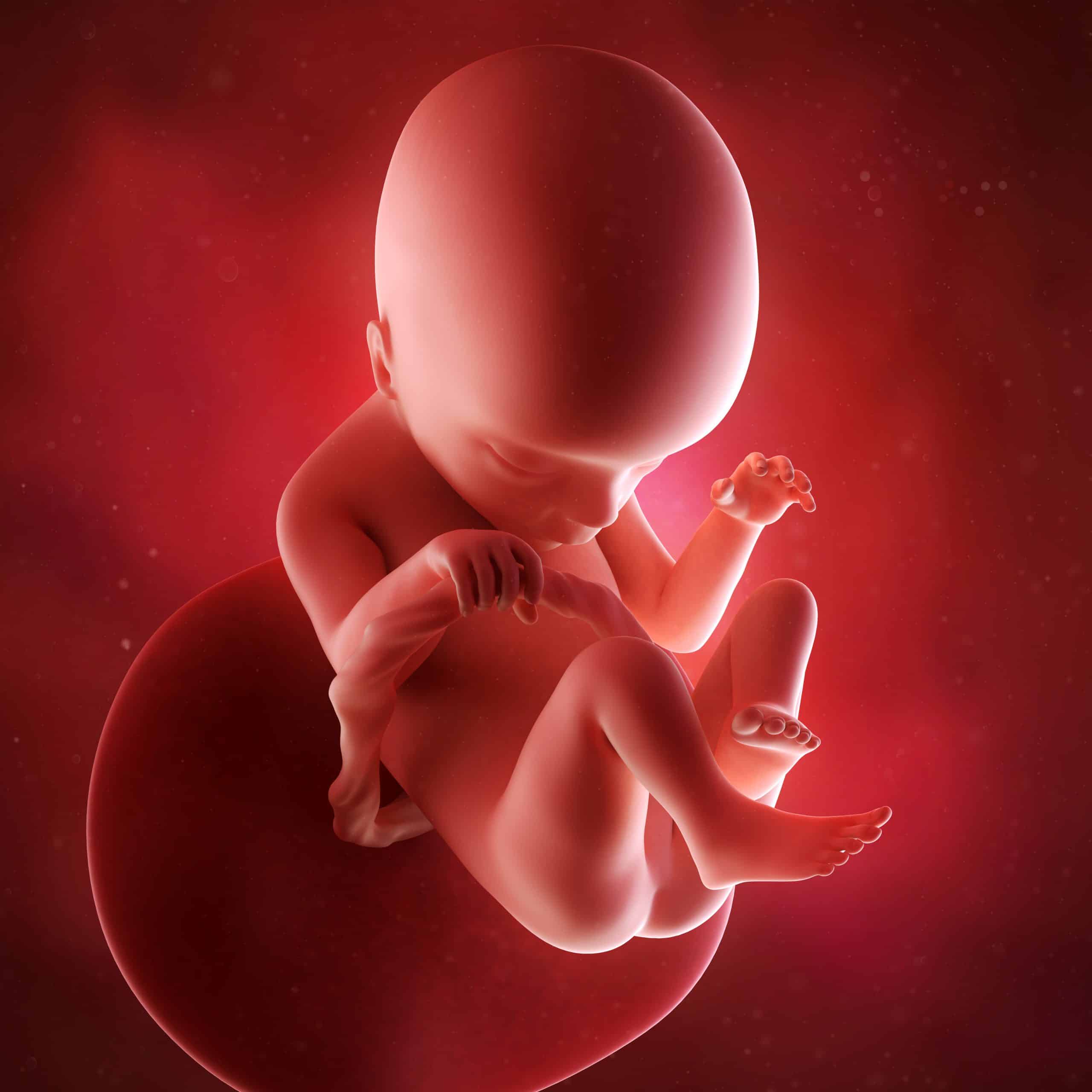
Week 19
Your pregnancy is reaching halfway mark and the top of your uterus will be growing very fast.
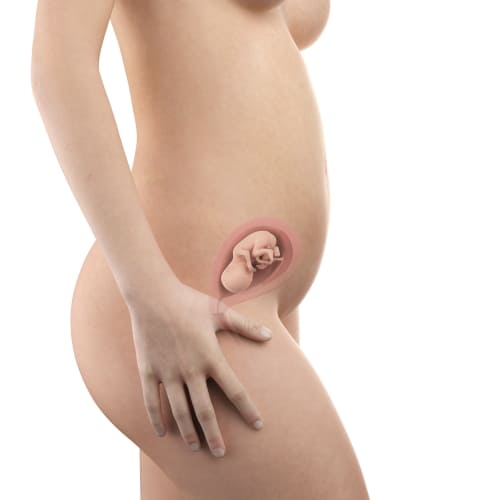
Pregnancy Symptoms Week 19
Increased appetite
Stretch marks
Constipation
Faintness or dizziness
Backaches
Stuffy nose
Remember if you have any concerns, call your doctor.
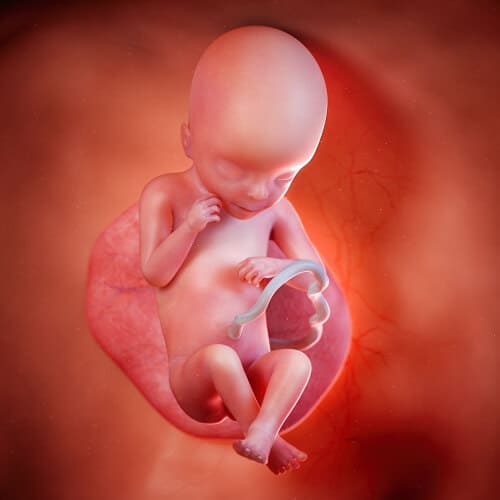
19 week fetus
Fetus is now the size of a big tomato weighs around 290g and 15cm from head to bottom. Fetus skin is no longer translucent. Mouth, nose, eyelids and eyebrows and scalp hair are becoming visible. Fetus can make facial expressions and drinks the amniotic fluid Fetus has tiny fingerprints, girl and boy parts are defined. Can yawn and hiccup. All the milk teeth buds have been formed, which will lie dormant until sometime after birth. Fetus’ sensitive skin is covered in vernix caseosa, a greasy, white, cheese-like coating that protects his skin from being wrinkled at birth (see below).
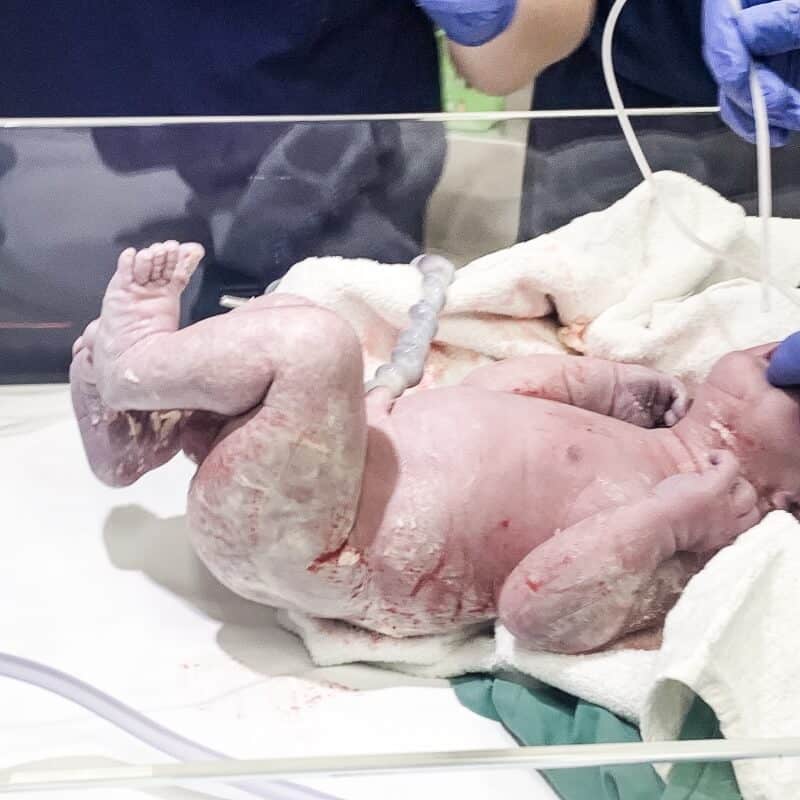
Week 20
Halfway through your pregnancy. Baby is about the size of a sweet potato and weighs around 300g (10oz) and is about 78 cm’s (61/2 inches) Baby is practicing sucking reflexes.
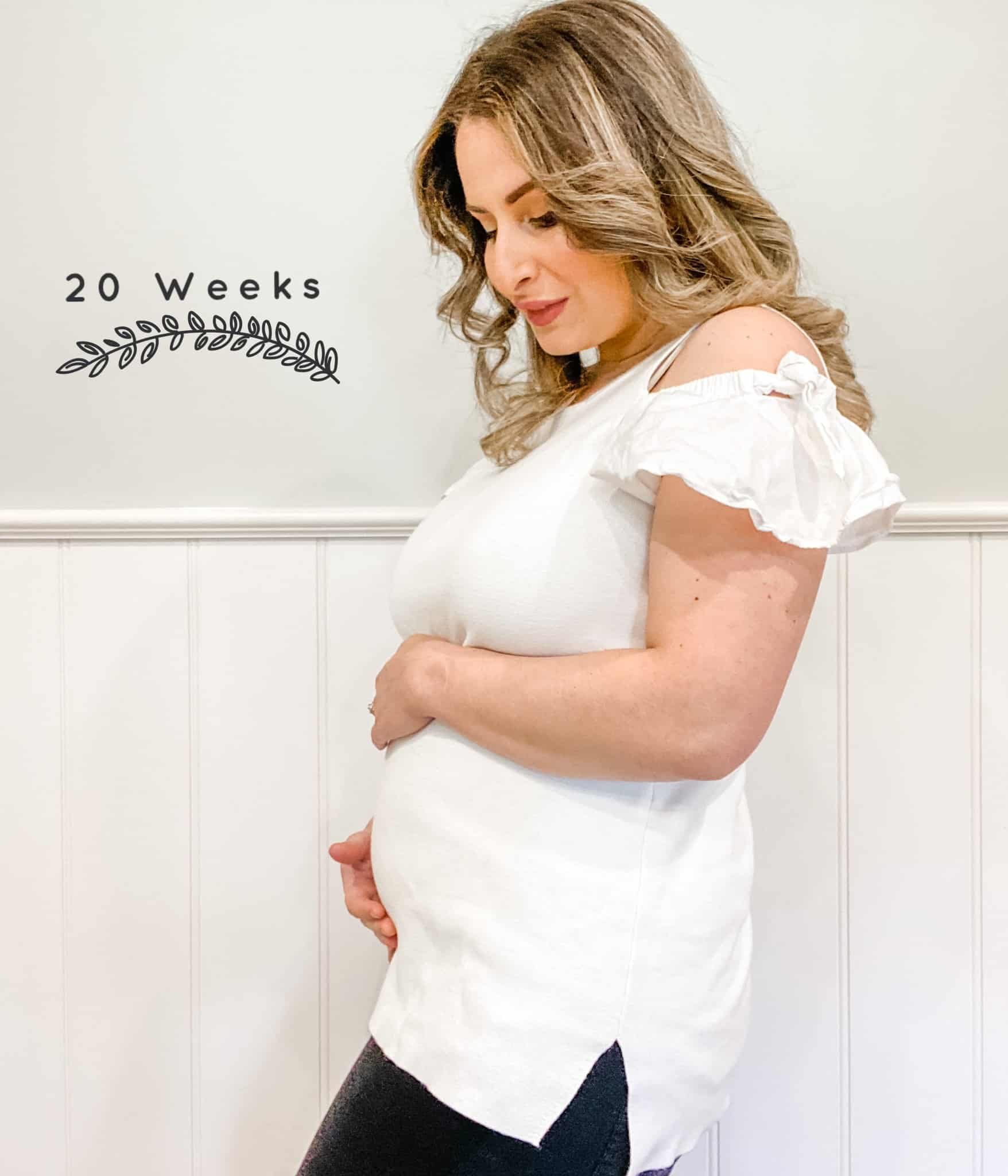
Your Body & Pregnancy Symptoms Week 20
You may have,
Heartburn and indigestion
Occasional headaches
Faintness or dizziness
Leg cramps
Edema (swelling in feet and ankles)
Your innie becoming an outie
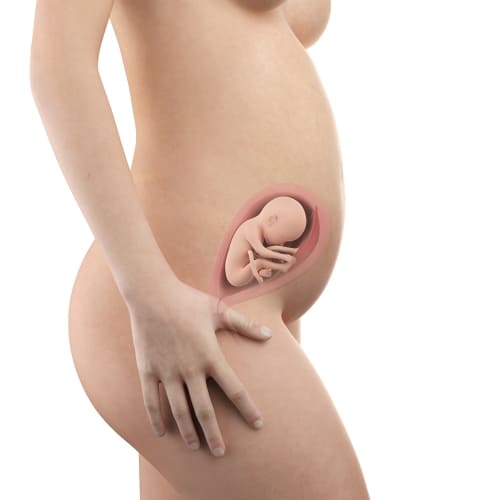
20 week fetus
If you haven’t already felt baby’s movements you may be able to feel them soon. Your appetite will increase. Hair will feel thicker and fuller and nails will be stronger, your circulation increases and brings more nutrients to you hair and nail cells.
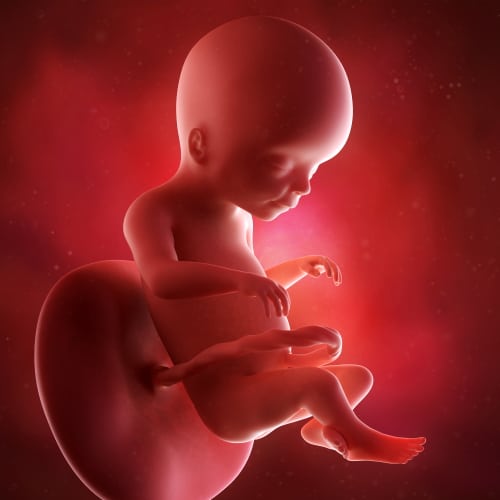
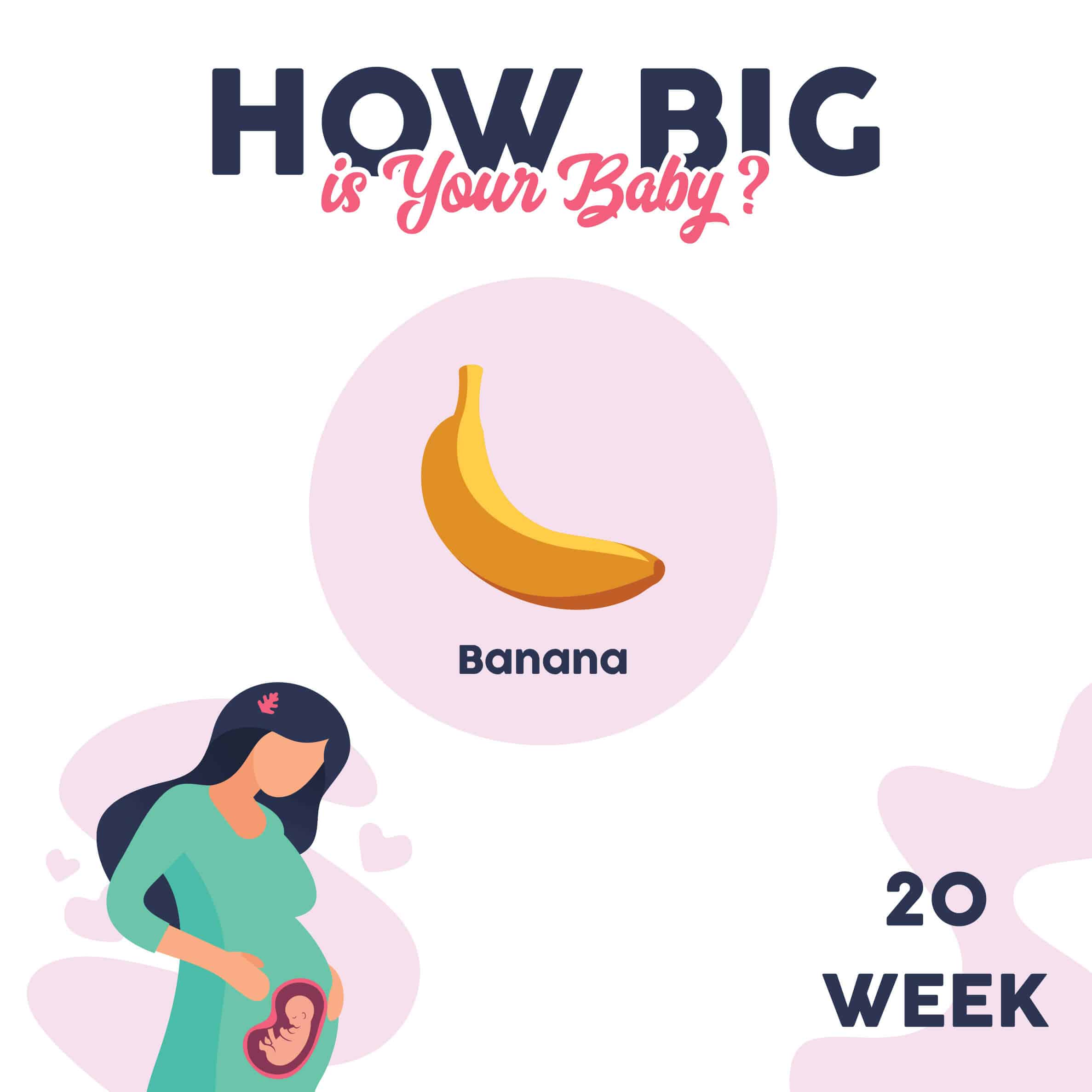
Week 21
Things you may notice,
Stretch marks
Increased appetite
Bloating and gas
Backaches
Bleeding gums
Fast-growing nails
You may want to,
Choose low-impact exercises
Elevate your feet
Keep an eye on the scale and avoid empty calories
Walk for 30 minutes a day
Avoid lasers
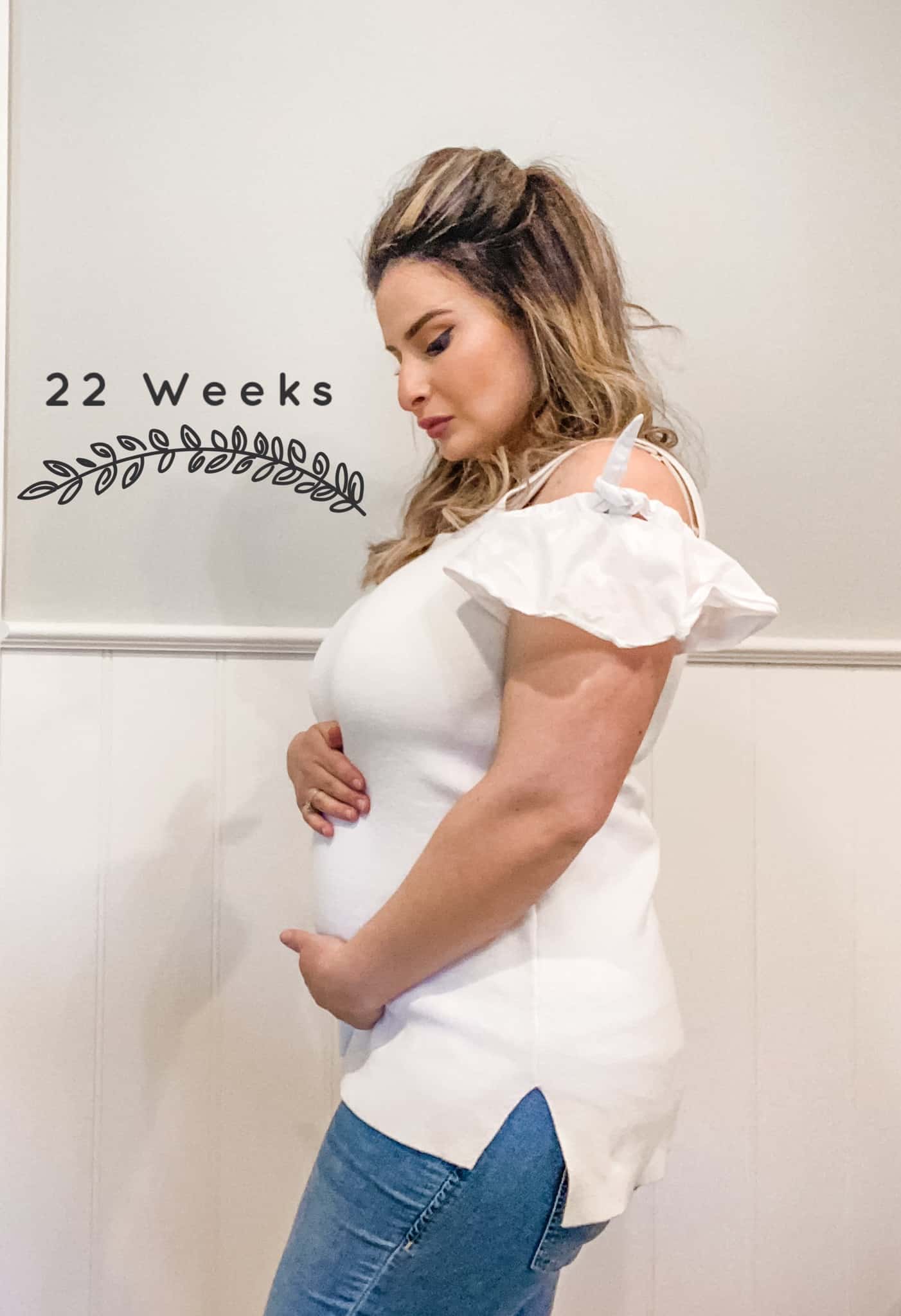
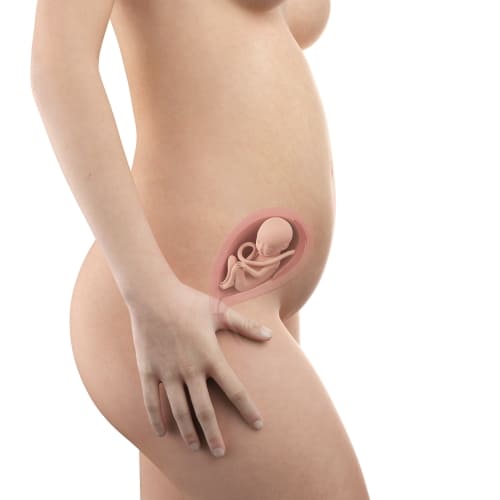
21 week fetus
Baby is as big as a large carrot and is around 23cm long and weighs about 350g The fetus is growing and fat is laid down under the skin, it has developed two layers and is less transparent. The anal sphincter starts to function around now and small amounts of meconium pass through the gut. Meconium is a solid, green/black substance made up of the gut lining cells and waste from swallowed amniotic fluid. Movements are getting more coordinated and baby will have periods of sleep and awake time. Baby takes small amounts of amniotic fluid. Tastebuds are developing and whatever you eat, baby may taste too. The taste of the amniotic fluid will depend on what you’ve eaten the previous day. Researchers have noted that babies who were exposed to certain tastes in utero via the amniotic fluid were more eager to eat foods with those same tastes after birth.
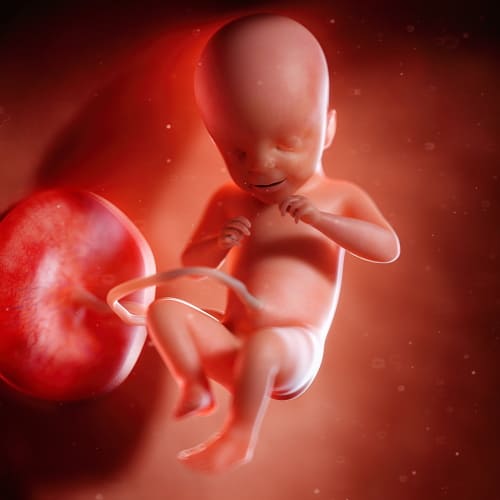
Week 22
Things you may notice
Heartburn or indigestion
Constipation
Faintness or dizziness
Leg cramps
Stretch marks
Protruding Navel
along with your tummy, your feet will get bigger too.
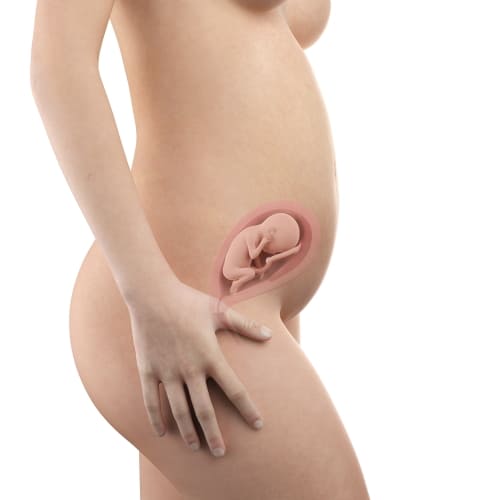
22 week fetus
Baby is the size of a papaya, weighs around 0.45g and is around 28cm long. Baby’s eyelids are still sealed shut but can perceive light and dark. Baby’s ear develops low on the neck and move up as the jaw bone enlarges. The ears are almost in their final position. Baby can process sound and can hear your breathing, your tummy rumbles and your heartbeat. Will also recognise your voice. Baby is learning to grab things and will grab ears, nose and umbilical cord. The fetus is growing and fat is laid down under the skin, it has developed two layers and is less transparent. The anal sphincter starts to function around now and small amounts of meconium pass through the gut. Meconium is a solid, green/black substance made up of the gut lining cells and waste from swallowed amniotic fluid. Movements are getting more coordinated and baby will have periods of sleep and awake time. Baby takes small amounts of amniotic fluid. Tastebuds are developing and whatever you eat, baby may taste too. The taste of the amniotic fluid will depend on what you’ve eaten the previous day. Researchers have noted that babies who were exposed to certain tastes in utero via the amniotic fluid were more eager to eat foods with those same tastes after birth.
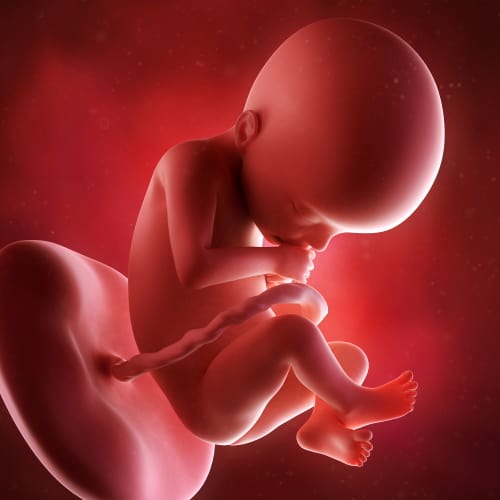
Week 23
Pregnancy symptoms
Pregnancy brain, heat rash and stretch marks may be quite obvious now.
Your skin will also discolour and you may notice a dark line on your
belly.
Nothing to worry about as they all fade after you give birth.
Here are more symptoms:
A Hearty appetite
Bloating
Snoring
Bleeding gums
Tingling hands
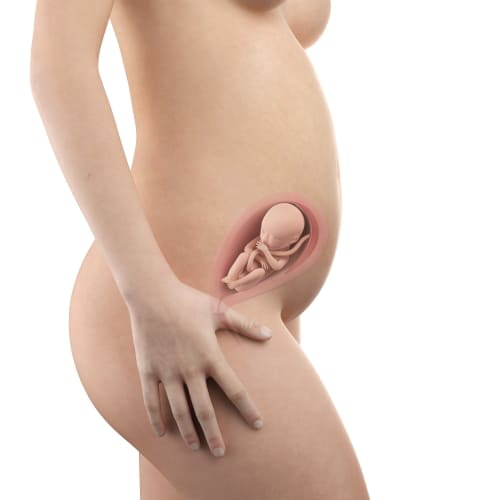
23 week fetus
At 23 Weeks, Pregnant baby is as big as a grapefruit, 28 cm long and 0.54 kg Baby’s movements are rapidly increasing and fat is forming under the skin. Will double weight in the next four weeks. Baby’s heartbeat can be heard through a standard stethoscope. Eyelids are still fused and eyebrows are forming. Skin is very wrinkled and is covered in greasy vernix and fine lanugo hair. Nails start to appear at the base of bail beds.
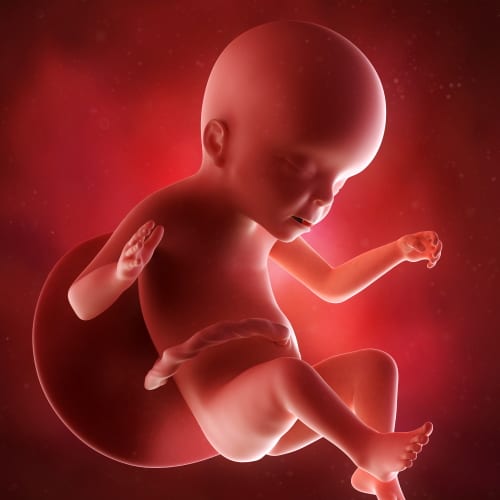
Week 24
Uterus enlarges upwards, outwards and changes your centre of gravity. These changes can lead to back ache. The growing uterus presses against stomach which can result in acid reflux and indigestion. It also presses against the diaphragm, reducing your ability to breathe deeply.
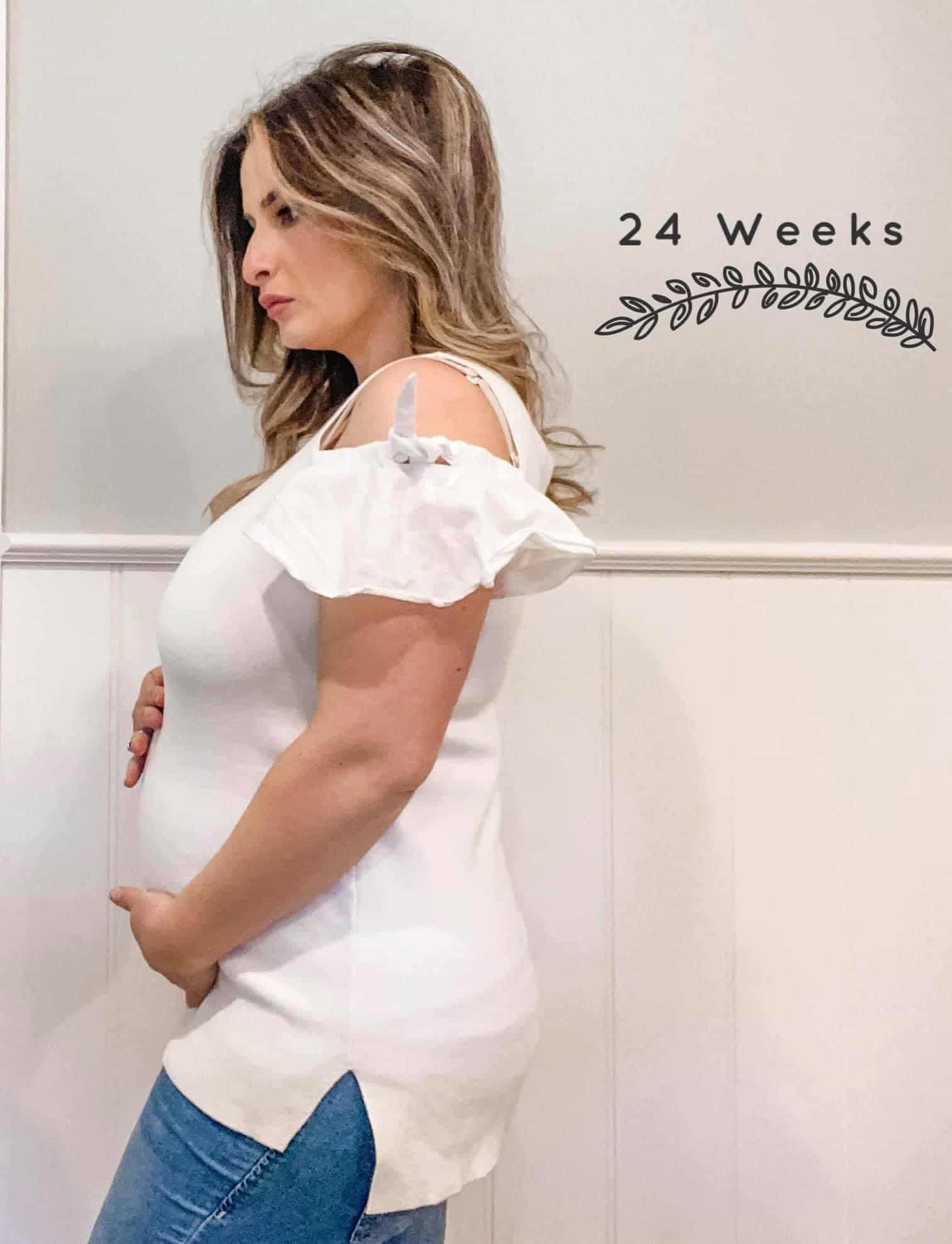
Pregnancy symptoms at 24 weeks
Constipation
Lower abdominal achiness
Blurred vision
Migraines
Leg cramps
Swollen feet and ankles
Carpal tunnel syndrome, uncomfortably numb wrists and fingers.
Metallic taste in your mouth.

24 week fetus
Baby is as big as an ear of corn is 29 cm long and weighs around 0.59 kg baby is rapidly putting on weight and if a certain song is heard frequently baby is likely to recognise it and feel calmer when born.
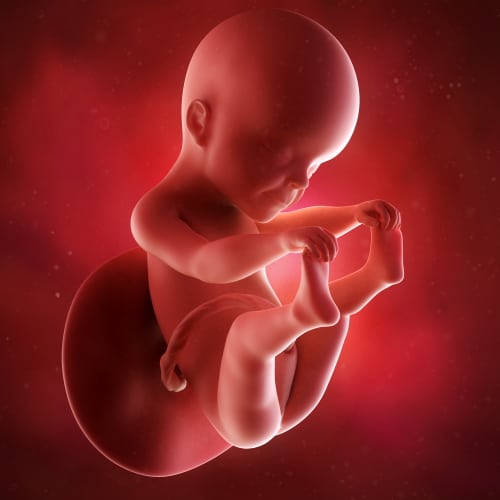
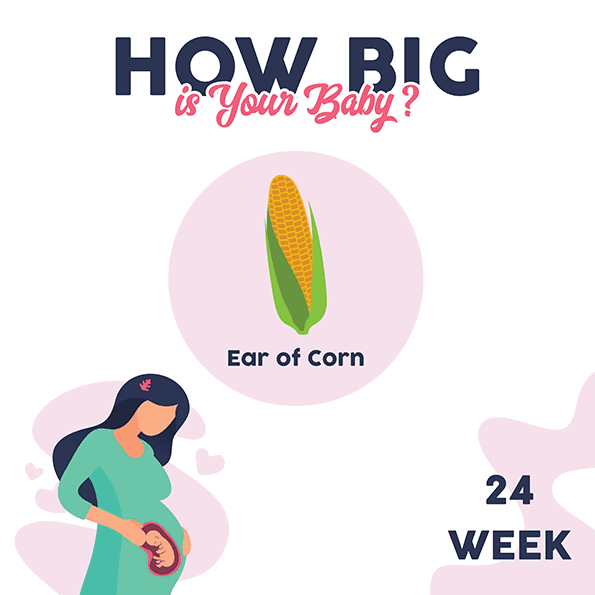
Week 25
Pregnancy symptoms
Hemorrhoids
Heartburn or indigestion
Snoring
Tingling hands (carpal tunnel)
Symphysis pubis dysfunction (SPD)
Restless legs syndrome (RLS)
Fast-growing hair
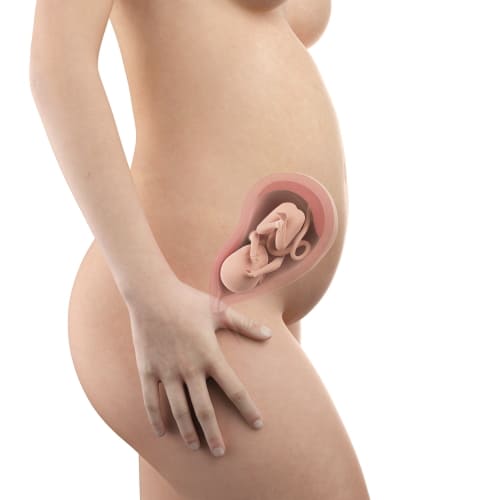
25 week fetus
Baby is as big as an eggplant. Weighs roughly around 0.70kg and approximately 35cm long Baby has the startle reflex. Baby is loosing the wrinkly appearance and is putting in fat. Baby's lungs are getting ready to breathe and nose starts to work. Your pregnancy symptoms at 25wks may be Parts of the brain associated with vision and hearing are becoming more active now. Memory is developing and brain wave activity is is now similar to that of a newborn infant. Baby will hiccup and yawn more often. Reflexes are developing too. Face is almost fully formed and mouth and lips show increased sensitivity. Body and legs have caught up with head and is more in proportion. Adult teeth buds are appearing in the gums.

Week 26
Levels of progesterone rise by 50% oestrogen levels also steadily increase.
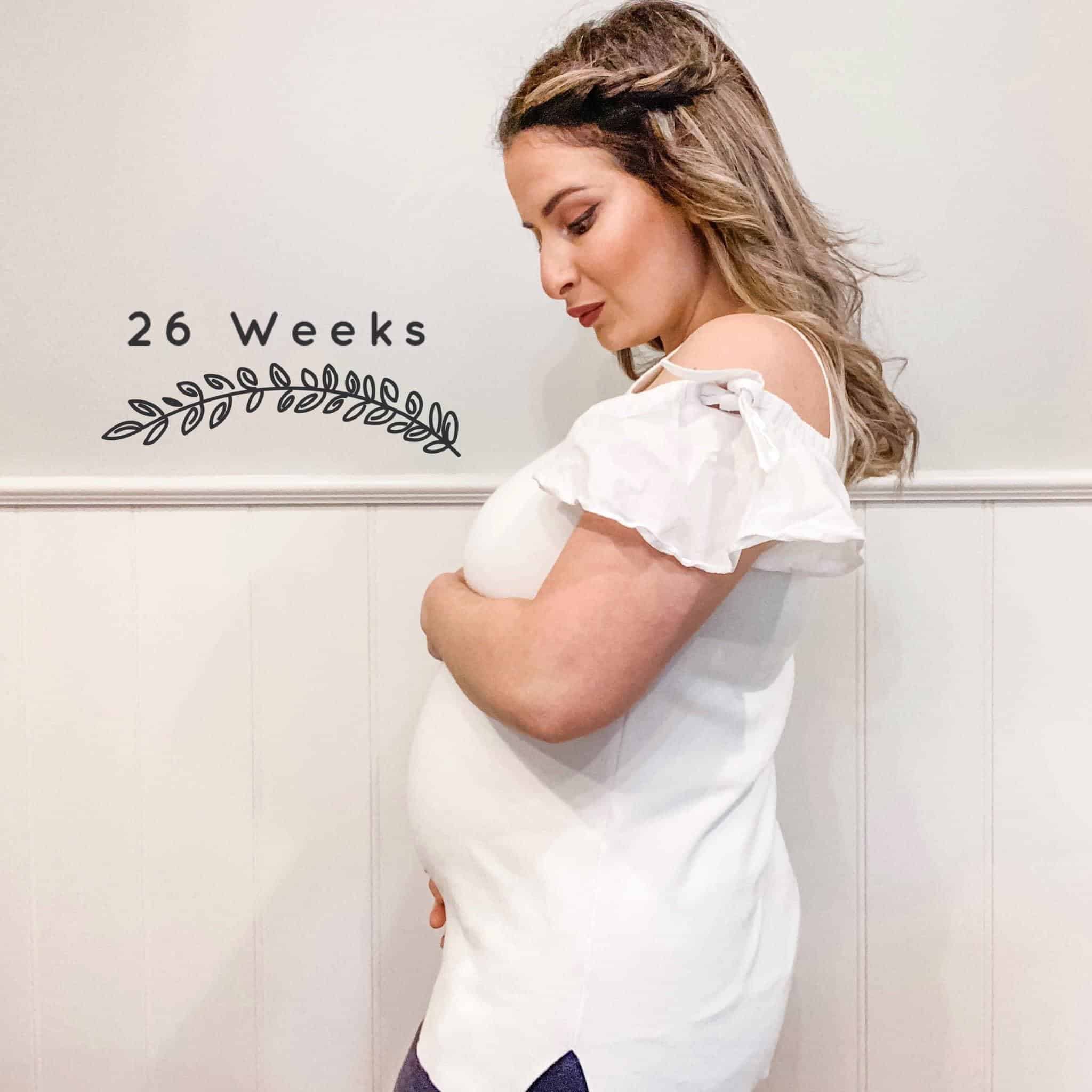
Pregnancy symptoms at 26 weeks
You may be experiencing some or all of these symptoms. If in doubt see you doctor.
Bloating and gas
Pregnancy brain
Clumsiness
Migraines
Blurred vision
Round ligament pain
Pregnancy insomnia.
Stretch marks.
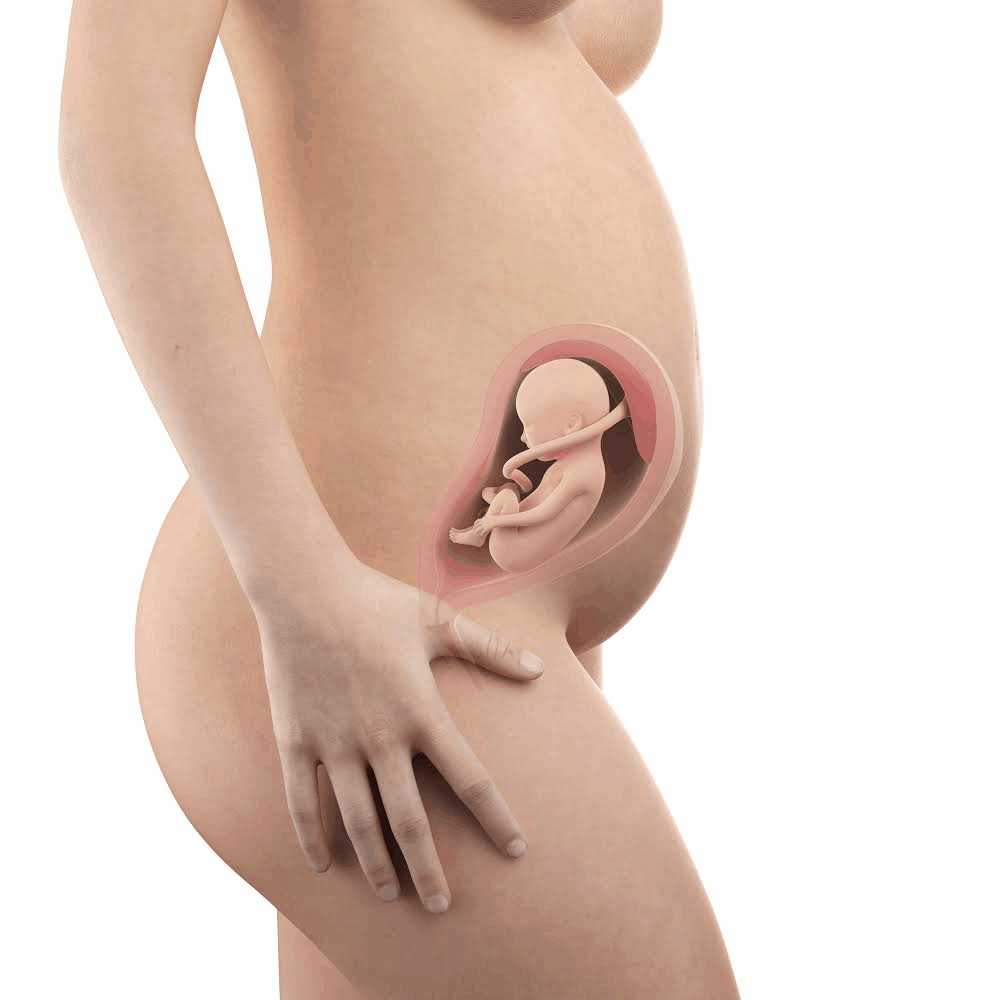
26 week fetus
Baby is as big as a lettuce weighs around 900g and 36cm long. Baby is fast running out of room and will start to feel a little cramped. Baby can open its eyes and will blink regularly. Baby may turn towards very strong light that filters through the mothers tummy. Baby can hear sound and may react with movements. Brain wave activity is kicking in as the brain is now in place. Brain is still smooth but soon will fold into the ridges and furrows that provide room for developing brain cells. Foetal hand coordination improves dramatically. The hands can be closed to make a fist and a lot of time is spent sucking its thumb. Male fetus testes descend from the pelvis into the scrotum. Most fetuses will settle into a more regular cycle of rest and vigorous movement. A baby born at 26weeks has a 65% chance of survival compared to 25% at 24weeks.
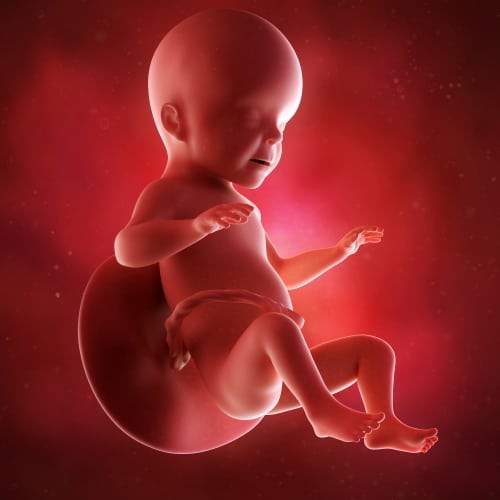
Week 27
A time of maturation and rapid growth for your baby. The important development being the laying down of fat and maturation of the foetal body so they can functions on their own after birth. You’ll be feeling the baby’s movements and will know when baby is awake.
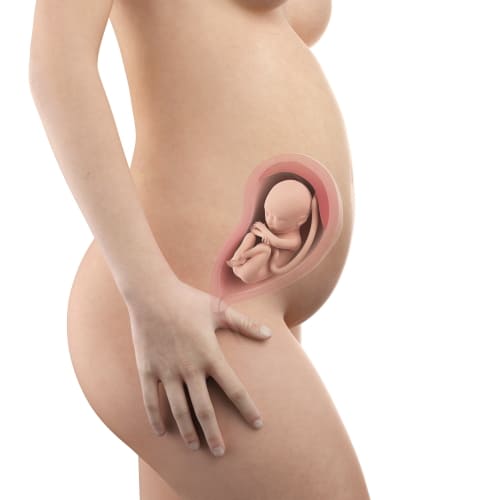
Pregnancy symptoms at 27 weeks
You may be experiencing some or all of these symptoms. If in doubt see you doctor.
Back pain
Bloating and gas
Pregnancy brain
Clumsiness
Migraines
Blurred vision
Round ligament pain
Pregnancy insomnia.
Stretch marks.
Breasts may produce colostrum to nourish baby in the days after the birth.
27 week fetus
Baby is the size of a cauliflower, weighs around 875g and 37cm’s long. From now baby boys will grow a little faster and generally be slightly bigger and a little heavier than little girls. Fetus is now swallowing, yawning and making breathing movements. Fetus starts to develop regular pattern of sleeping and waking. The vernix, the protective layer of grease covering the skin thickens, it protects the baby’s skin from
irritation. The kidneys start to function and the fetus passes small amounts of urine into the amniotic fluid. Eyebrows, eyelashes and scalp hair is growing too. The shape of the uterus helps baby into a head down position, but this may change many times before the baby settles down.
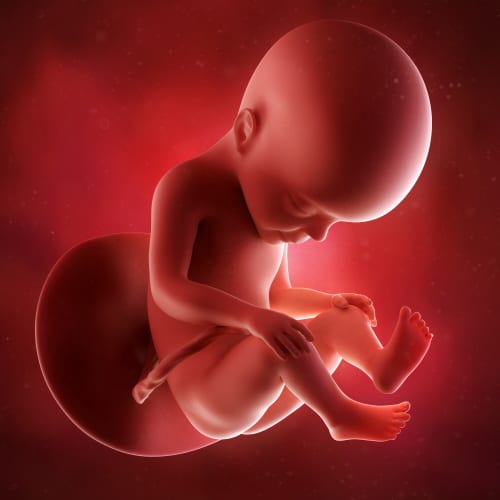
Week 28
Welcome to your third trimester, you’re in the home stretch now. You may experience leaking colostrum from your breasts. Your glucose tolerance test is done around now to check for gestational diabetes. If blood tests reveal that the mother is Rhesus-negative blood group a dose of anti D antibodies will be given in the first month.
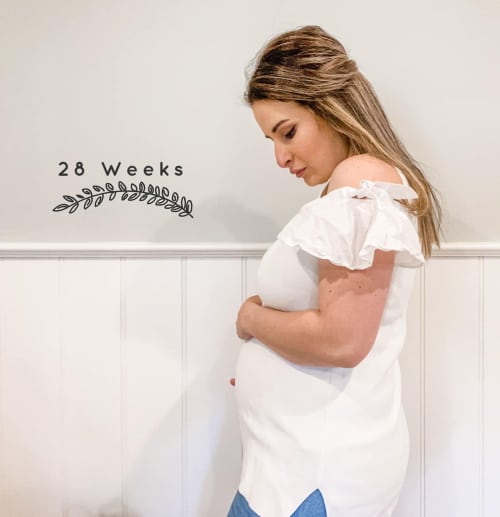
Pregnancy symptoms at 28 weeks
Pregnancy Symptoms:
Sciatica or tingling leg pain
Baby’s kicking may keep you up at night.
Bloating and gas
Faintness or dizziness
Symphysis pubis dysfunction (SPD)
Stuffy nose
Bleeding gums
Mask of pregnancy (melasma)
If you’re in doubt, please speak to your doctor.
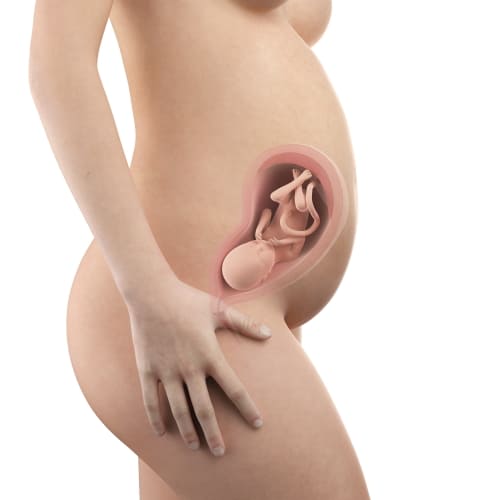
28 week fetus
Fetus is as big as an eggplant, 38cm long and weighs around 1kg. It is growing fast but there’s still plenty of room in the uterus and fetus will turn in different ways. Mother may feel kicks in different parts of her belly. Your baby begins to experience REM or rapid eye movement sleep and can blink, opening eyes and closing them. Also can stick out tongue maybe to taste amniotic fluid. Will produce increasing quantities of urine. Teethe buds are perfectly formed too. Skin creases on hands are becoming visible and fingernails are formed.

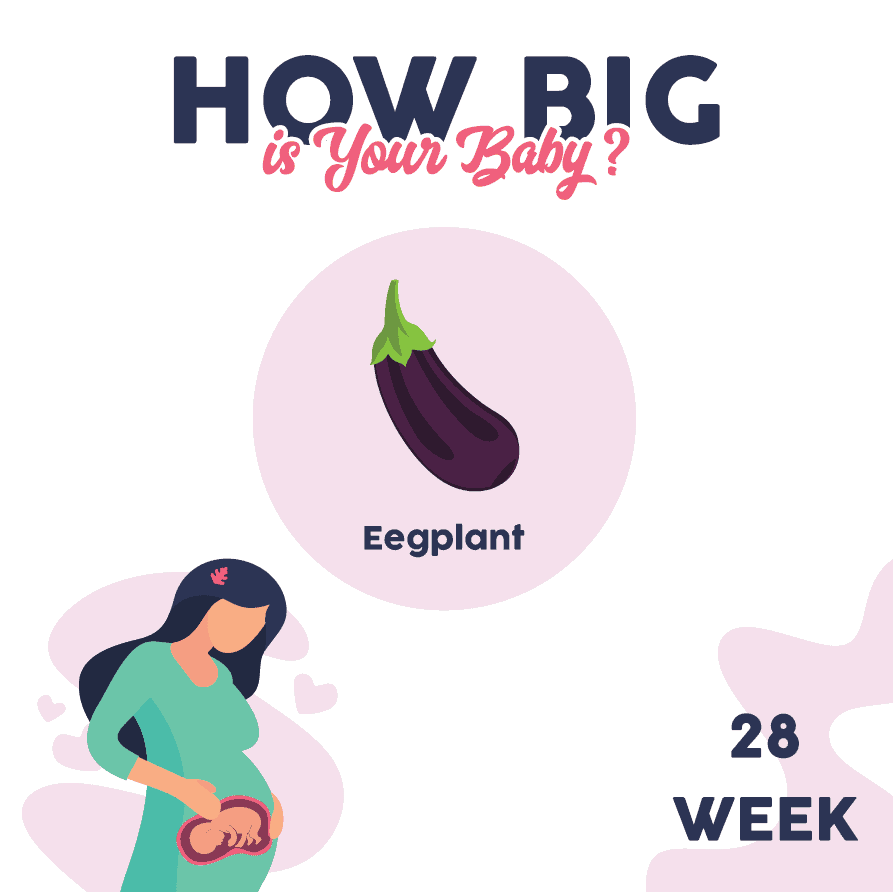
Week 29
You should be consuming extra calcium to accommodate your baby’s growing needs as fetus will be soaking up around 250mg of calcium per day. After 28 weeks it a good idea to monitor baby’s movements twice a day, morning and evening is a good idea. Lie down for one hour and count baby’s movements in that hour, your aim is to count 10 in that hour. If there aren’t enough kicks or movements, contact your doctor.
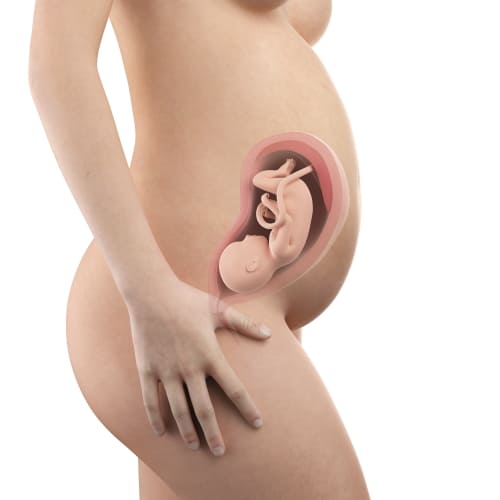
Pregnancy symptoms at 29 weeks
Pregnancy symptoms you may experience are,
Varicose veins
Constipation
Migraine
Hemorrhoids
Pregnancy brain
Fast growing nails
Heartburn and indigestion.
29 week fetus
Baby is as big as a cauliflower, weighs 1-1.5kg and is around 40 cm long. In the next 11 weeks baby will double or triple his/her weight. Baby’s brain is becoming increasingly folded. The amniotic sac is fully developed, will remain flexible and continue to stretch as the fetus grow.
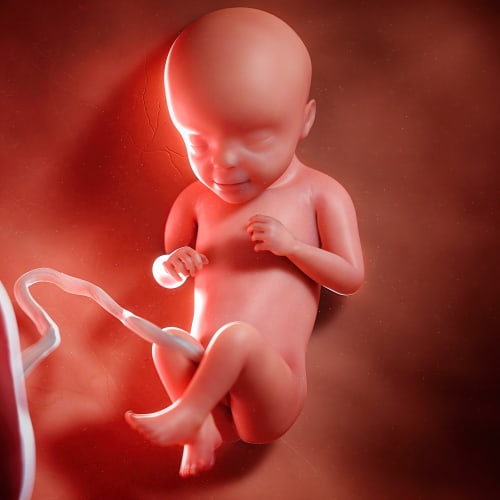
Week 30
You may be experiencing some shortness of breath caused by the baby compressing on your lungs. Exercise, like short wake should be maintained. You should also have had your whooping cough vaccine by now. It’s highly recommended as it will provide the fetus with antibodies until they receive their immunisations.
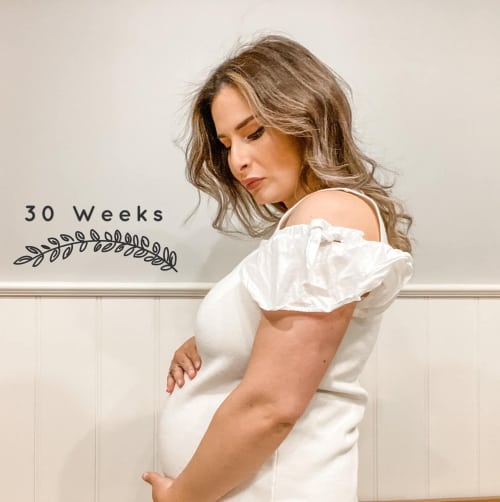
Pregnancy symptoms at 30 weeks
Pregnancy symptoms you may experience are,
The need to pee often will come back because baby’s head is
pressing down on your bladder.
Your breasts will become more tender
You’ll be feeling more tired and maybe experience heartburn.
Foetal movements will change.
You’ll experience bloating and gas
Swollen feet and ankles
Constipation
Stretch marks
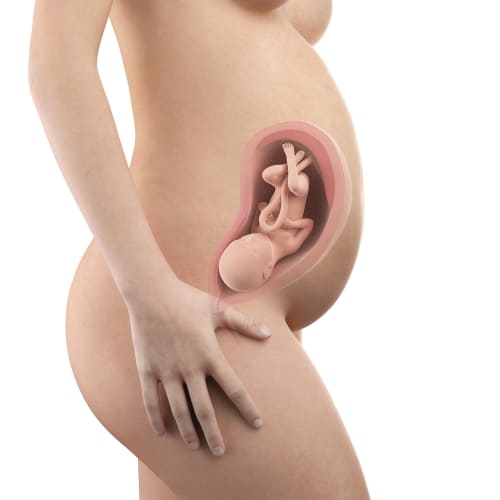
30 week fetus
Fetus is as big as a head of broccoli, is 40 cm Ling and weighs around 1.5 kg From now on your baby will grow very fast and put in weight at a rate of about 250g a week. As the fetus brain develops and regulates their heat better, the lanugo, the soft down which covered their body, will start to shed.

Week 31
Your centre of gravity has changed and you may be feeling clumsy,
keep your posture straight and Keep up with gentle exercise.
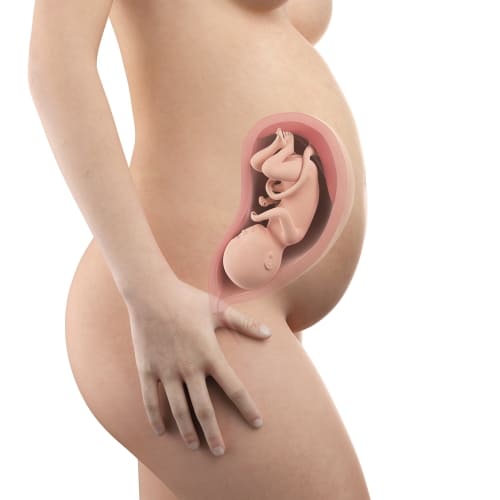
Pregnancy symptoms at 31 weeks
Shortness of breath, because the uterus is pushing all the internal
organs. As long as your doctor approves you can still enjoy sex, it will actually
help get labour going. Don’t worry, it doesn’t affect the baby in any way. Other symptoms include:
Frequent urination
Backaches
Clumsiness
Pregnancy brain
Sleep problems
Occasional headaches
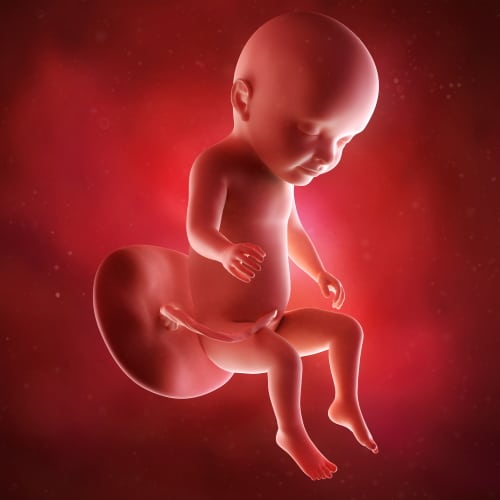
31 week fetus
Fetus is as big as coconut, is 41 cm long and is around 1.5 kg The skeleton is almost the Size it will be at birth but still looks skinny and will put on more weight. Skin is thickening and is starting to look pink now because a layer of fat has been building up beneath the surface. Fetus is developing five senses and brain is developing faster than ever. Fetus is still very flexible as there’s still quite a bit of room in the amniotic sac. Some Fetuses are already in the head down position in preparation for north.
Week 32
You will be experiencing Braxton hicks contraction by this stage, it’s your body’s way of getting ready for labour. If you find yourself having more than four an hour, call your doctor.
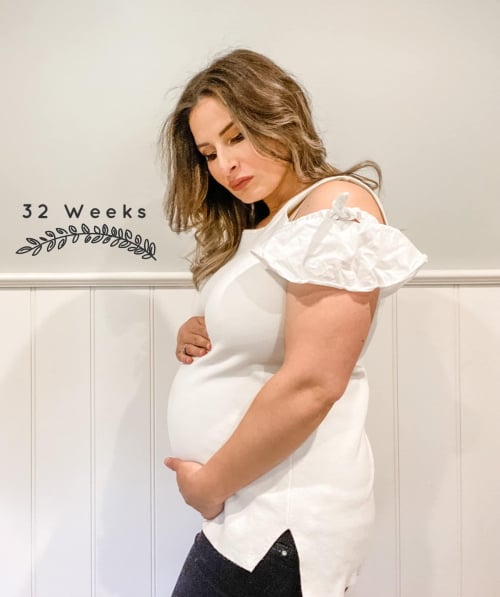
Pregnancy symptoms at 32 weeks
Pregnancy Symptoms:
Constipation
Leg cramps
Faintness or dizziness
Hemorrhoids
Colostrum (leaky breasts)
Itchy tummy and skin
Lying down and having a rest during the day will help boost the blood flow through the placenta.

32 week fetus
Baby is as big as a cantaloupe, 43cm and around 1.8 kg. Baby organs are fully formed, except for lungs and baby has a very good chance of survival if born now. baby is swallowing, breathing, kicking and sucking in preparation to living outside the womb.
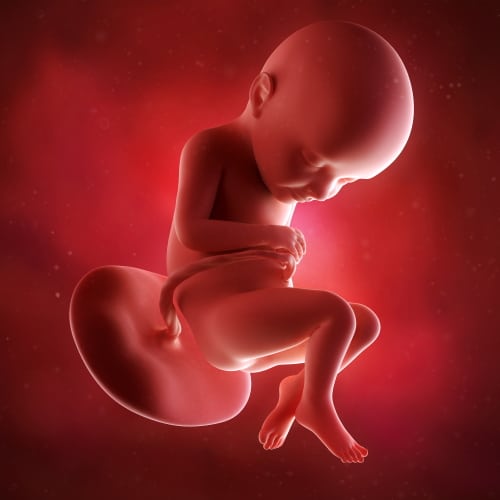
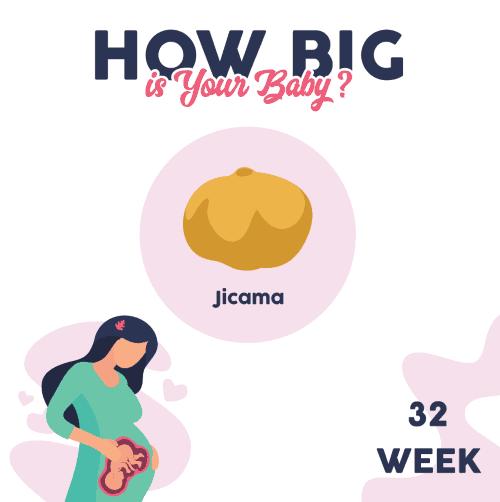
Week 33
You’ll feel the need to urinate more as the enlarged uterus presses in the bladder. A renal visits will increase in frequency as pregnancy approaches its final stages. Braxton hickx contractions will increase strengthening uterus for labour.
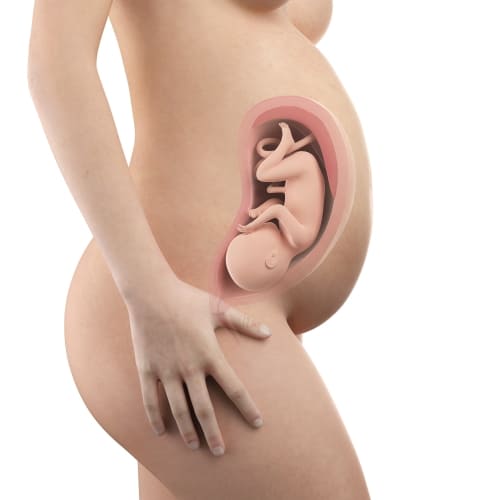
Pregnancy symptoms at 33 weeks
Pregnancy symptoms for you.
Insomnia
leg cramps,
heartburn
Strong fetal movement
Varicose veins
Round ligament pain
Nail changes
Shortness of breath
Clumsiness
Pregnancy brain
Braxton Hicks contractions
33 week fetus
Fetus is aware of mother’s heartbeat, intestinal sounds, blood moving through umbilical cord and placenta. Brain is developing and fetus will remember mothers voice better than any other. Will startle for sudden noises.
Fetus is as big as a butternut pumpkin, is 43cm long and weighs almost 2kg skull bones are still pliable, to make it easier for him to squeeze down the birth canal.
Fetus is drinking amniotic fluid and gaining weight at a rate of about 250g a week. The intestine is developed enough to and capable of digesting and absorbing nutrients from milk. kicks may feel sharper. Now differentiates day from night although it may not feel like they do when they’re born. Eyes are opening and closing. immune system is developing and you’re passing your antibodies to the fetus.
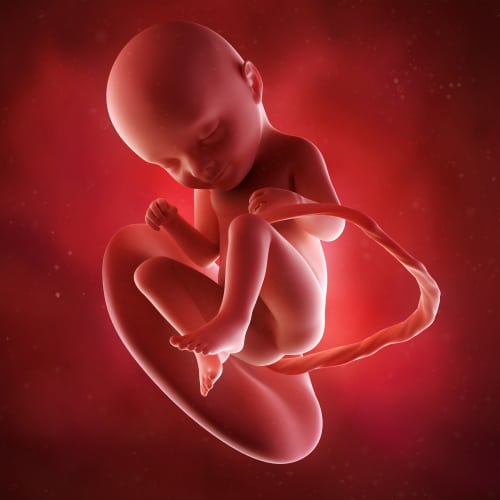
Week 34
You’re nearly there and babies born between 34 and 37 weeks with out any other health issues do well
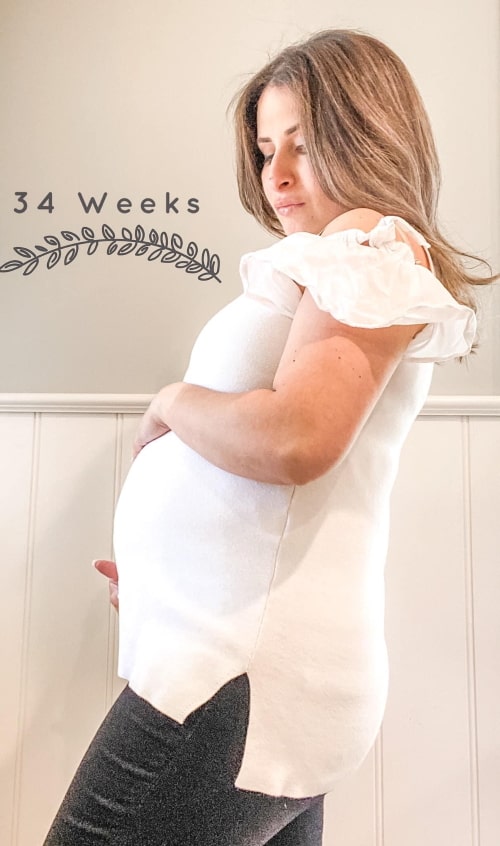
Pregnancy symptoms at 34 weeks
Pregnancy symptoms
Blurred vision
Bloating and gas
Constipation
Increased vaginal discharge
Hemorrhoids
Backaches
Leg cramps
Stretch marks
Oedema (swelling in feet and ankles)
Fast-growing hair
Shortness of breath
Insomnia
Leaking colostrum
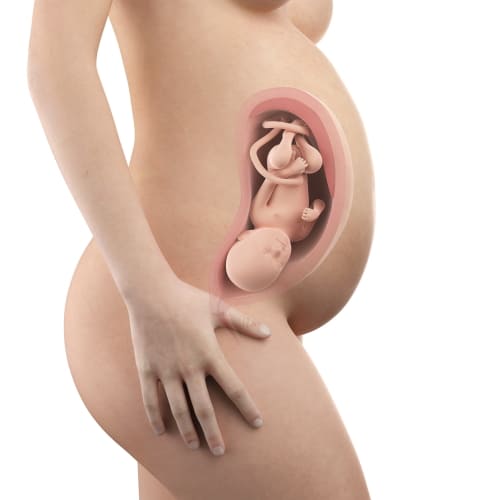
34 week fetus
Fetus is growing and you may be able to see body parts like little hands and feet. Baby boys testicles will make their way down and fingernails have grown. Stays awake for longer periods and will stay awake for 8hrs out of the 24 when it’s born. Fetus is as big as a pineapple, is around 45 cm and weighs around 2.5 kg. Baby’s eyes are opening and closing during sleep. The vernix starts to thicken before it sheds. This is a thick waxy coating on baby’s skin.
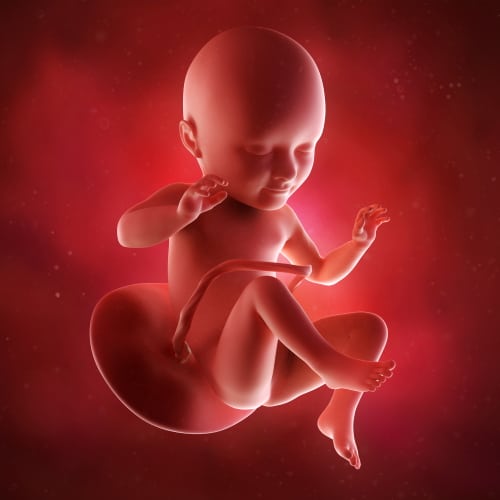
Week 35
You’ll have rising hormone levels and Braxton hicks contractions will increase in regularity.
Your blood volume is 40% greater than it was prior to you getting pregnant.
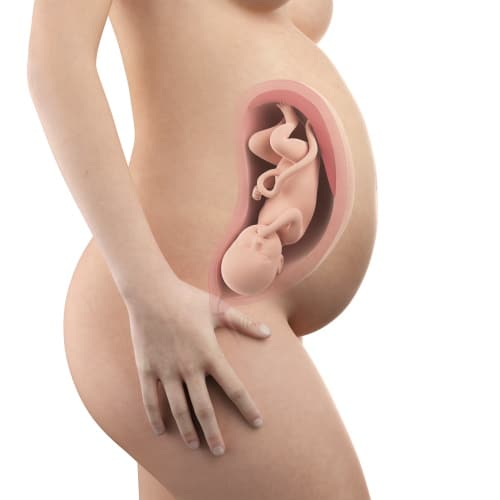
Pregnancy symptoms.
Frequent urination
Occasional headaches
Varicose veins
Hemorrhoids
Bleeding gums
Skin rashes
Increasing clumsiness
Pregnancy brain
Braxton Hicks contractions
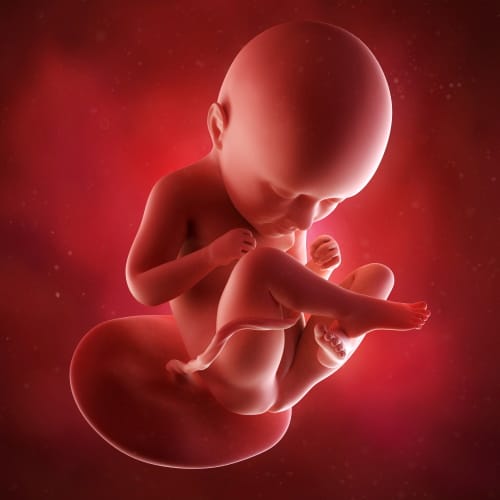
Baby is as big as a honeydew melon
46 cm long and weighs 2.4 kg.
There’s less space in your uterus and the kiks and punches will become rolls and turns.
Baby will be putting on weight at the rate of around 28g each day, especially around shoulders to help them on their big journey.
Brain is growing fast and but the skull is very soft to allow it to pass through your pelvis easily.
The Fetus swallows around 500ml of amniotic fluid a day and most of it is urinated back into the amniotic fluid.
It’s gut is developed to the point that it can digest food.
The sucking reflex develops allowing fetus to feed after birth.
Fingernails reach the tips of the fingers.
Skin is thicker and less translucent.
The volume of the bladder is now around 10ml
Week 36
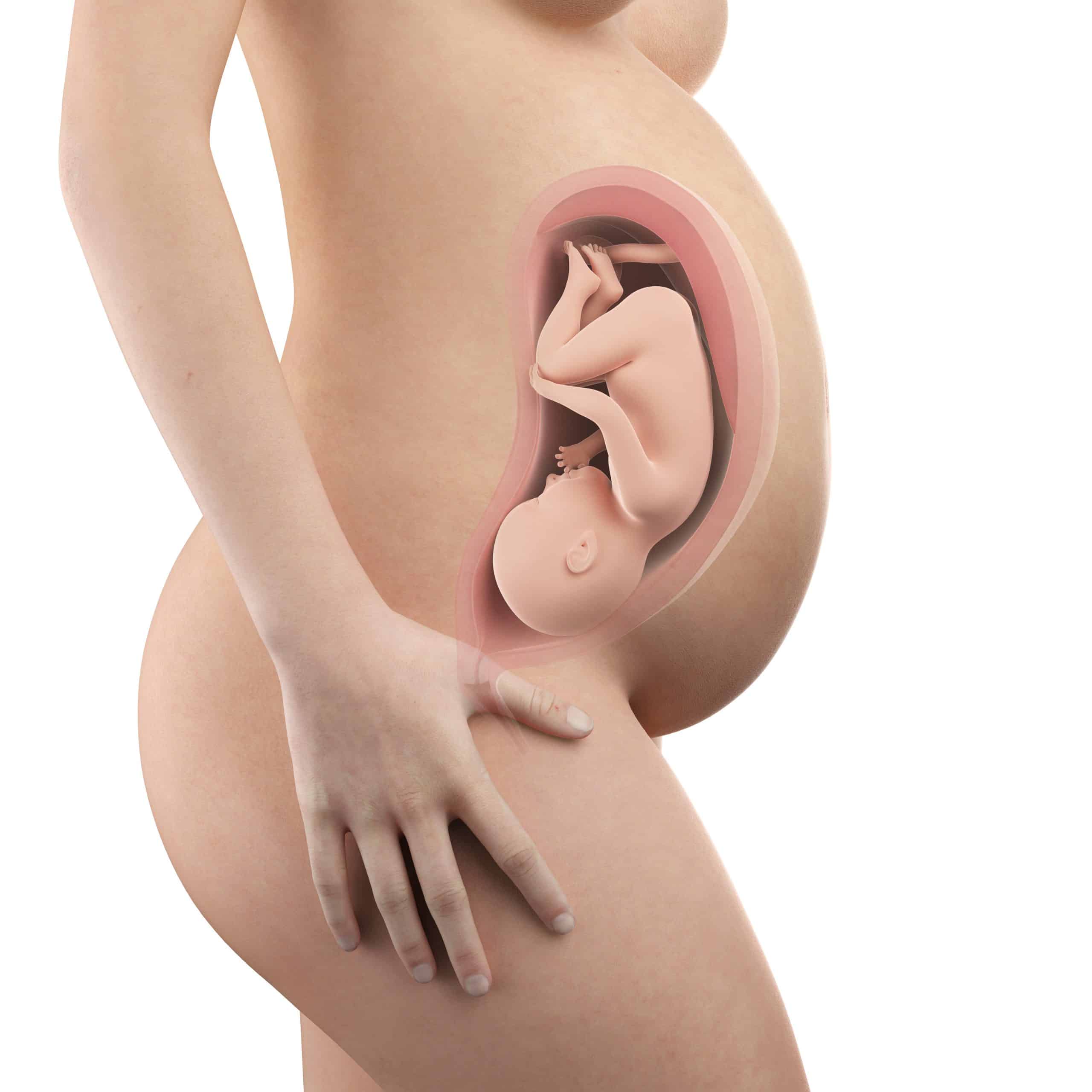
Your Body at Week 36
Your body is preparing for the delivery. Your hormones are loosening and softening your connective tissue, it’s getting ready to push baby out. You may experience pelvic pain due to the pressure of your baby’s head going deeper into your pelvis and drops into pelvic cavity. This is called ‘lightening’.
You May Also Experience
Changes in fetal movement
Heartburn or indigestion
Bloating and gas
Constipation
More frequent urination
Vaginal discharge streaked with blood
Itchy belly
Oedema (swelling in feet and ankles)
Insomnia
Nesting Instinct
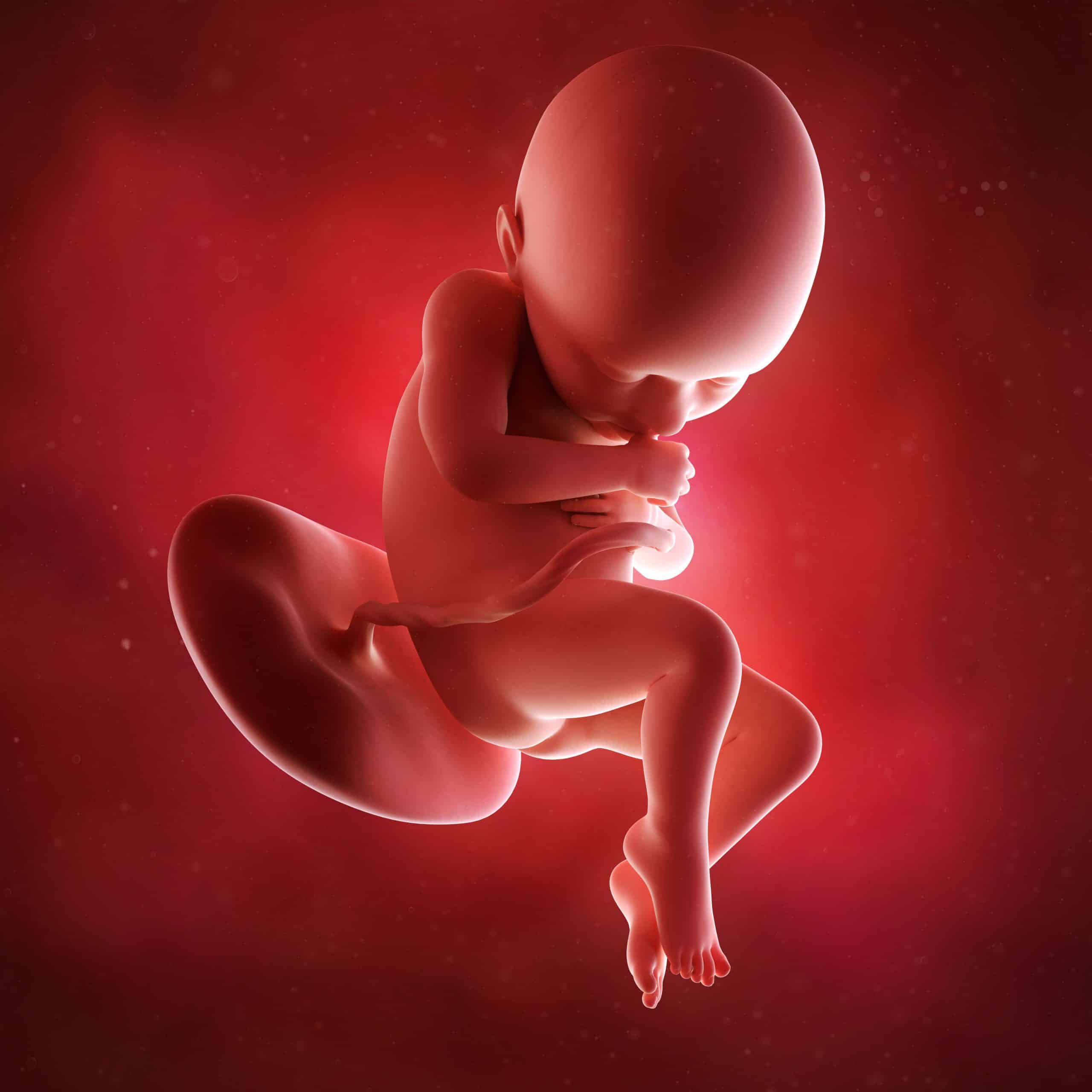
Your baby is as big as a watermelon, is around 48 cm long and weighs around 2.6 kg.
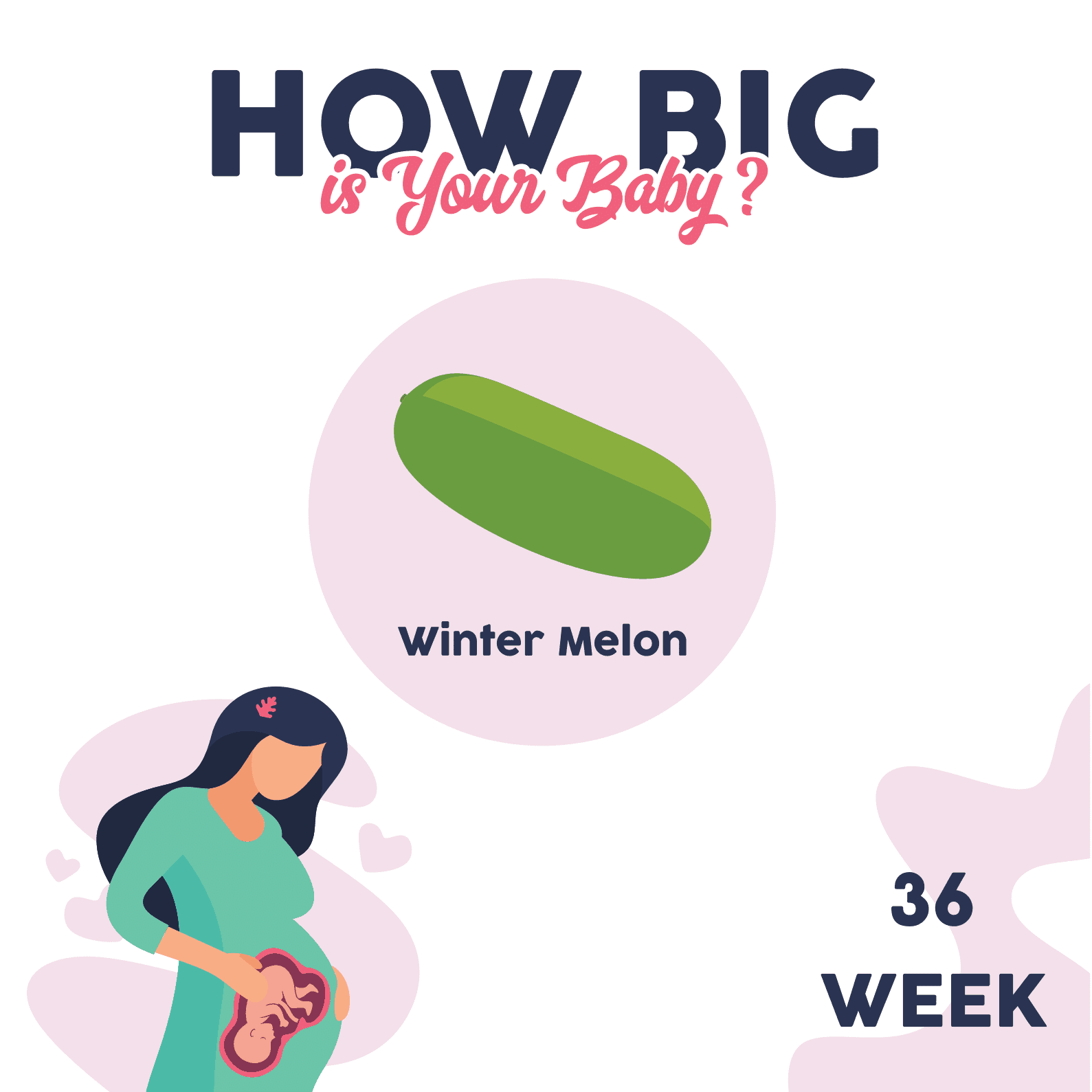
You’re in the last four weeks of pregnancy
Baby looks more like an infant with pink skin and chubby legs.
Baby can hear and may even recognise your voice.
Baby’s growth will slow down in the coming weeks.
Fetal skull, bones and cartilage are soft to allow for the journey into the world.
Week 37
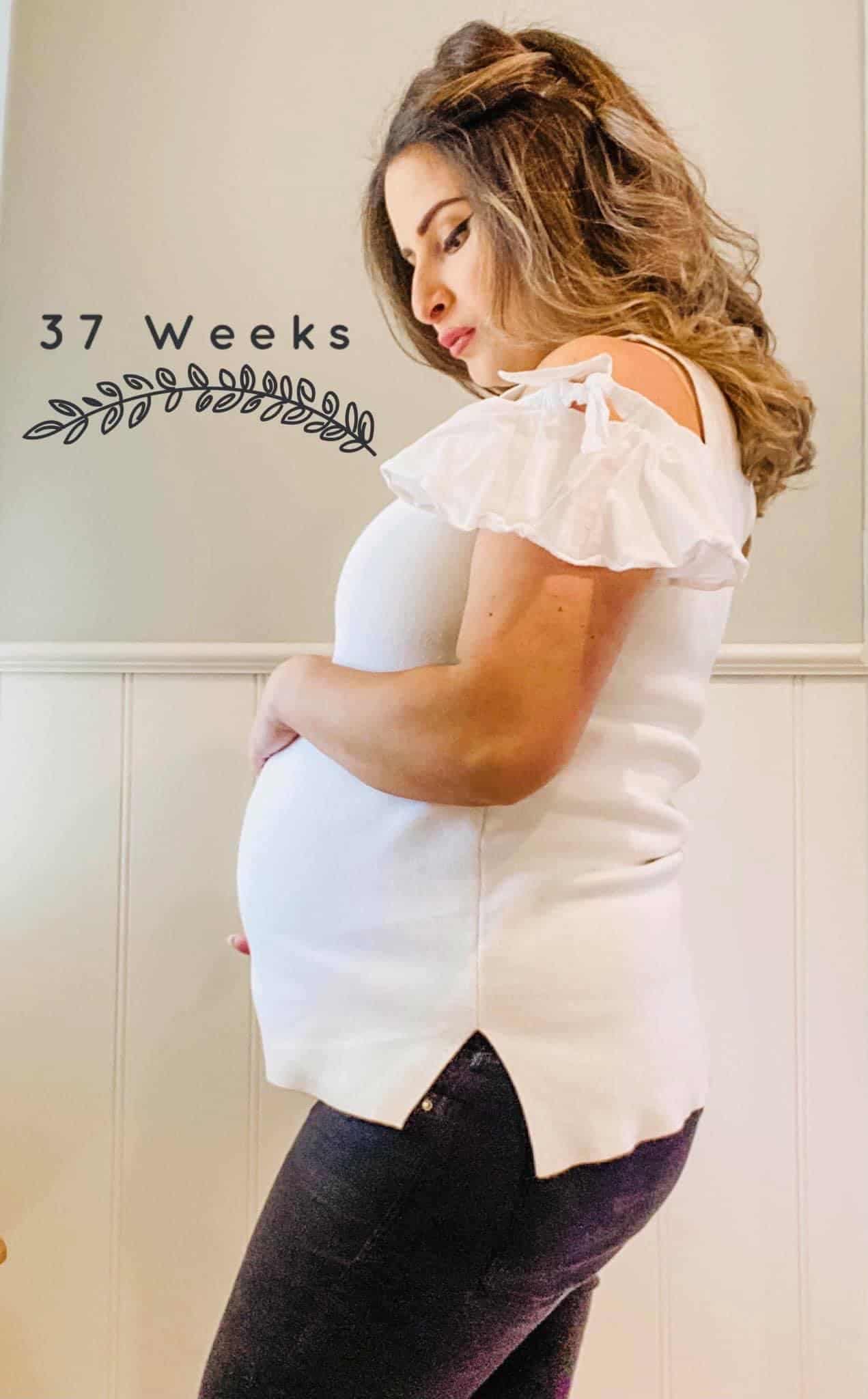
Pregnancy Symptoms 37 Weeks
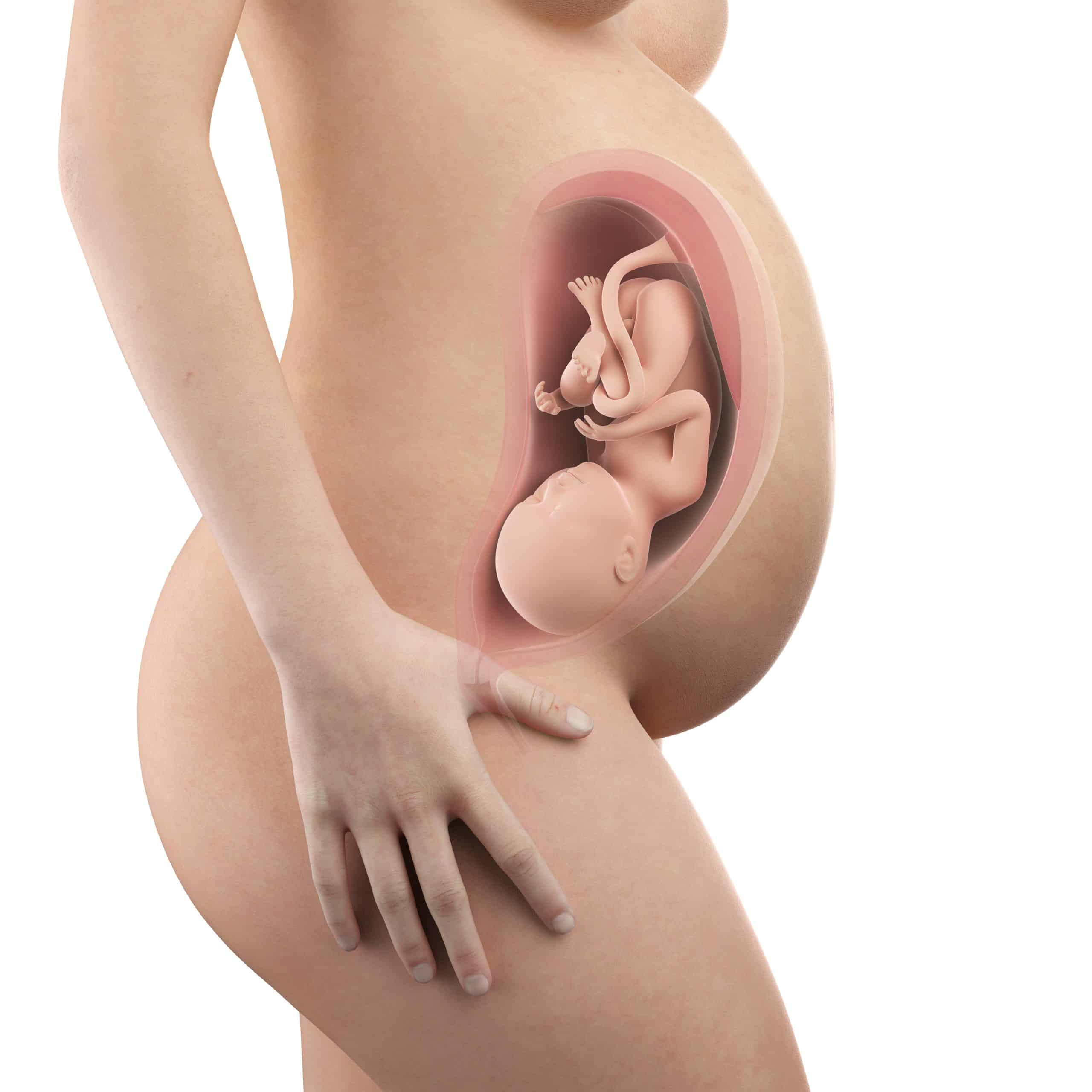
Changes in fetal activity
Heartburn or indigestion
Bloody show
Varicose veins
Pelvic pain
Leg cramps
Stretch marks
Breast changes
Pregnancy brain
Insomnia
Baby is as big as a Spanish or canary melon, is 48cm long and weighs around 3kg.
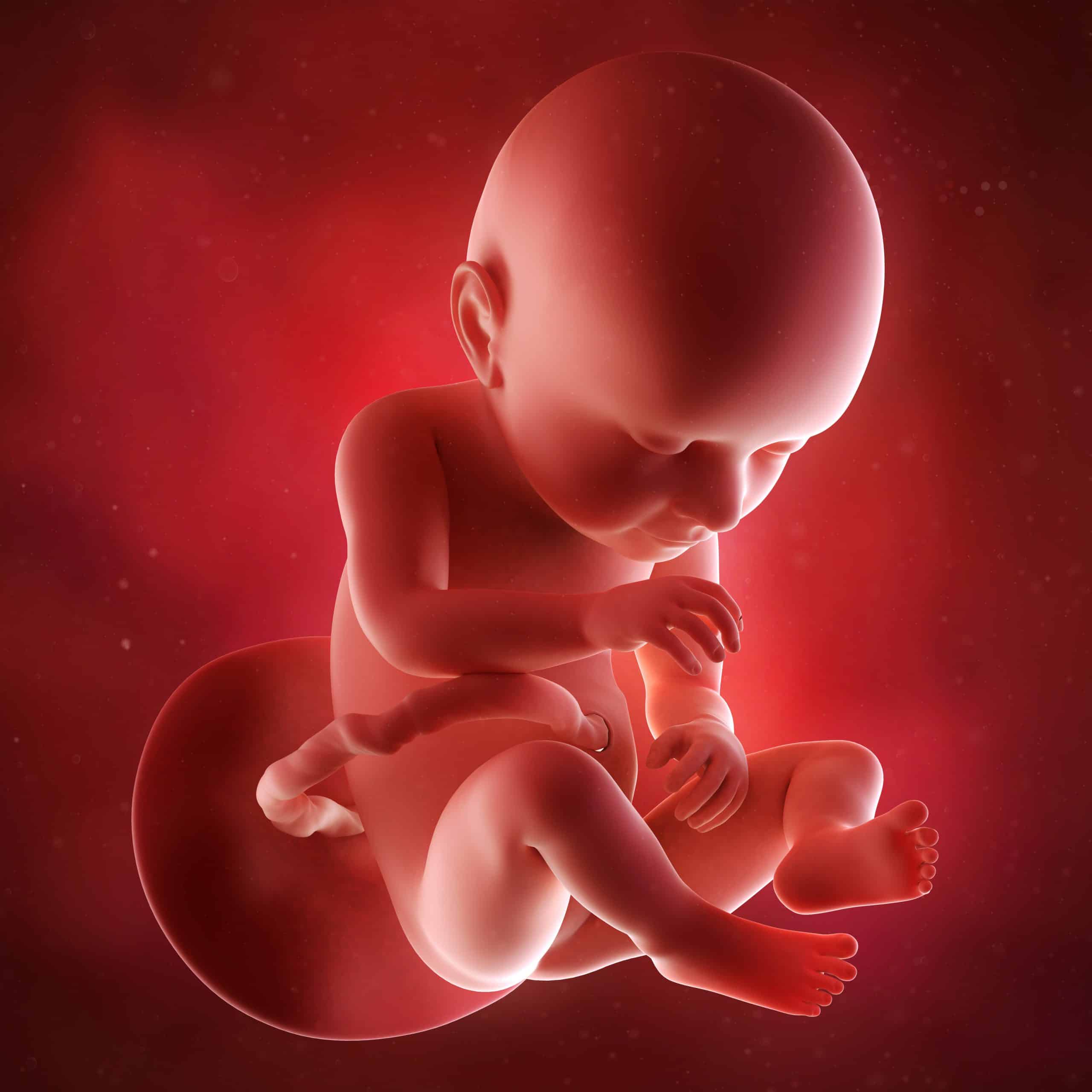
At 37 weeks pregnant, baby’s lungs are pretty much mature but baby hasn’t finished growing yet.
Baby is not kicking as much, but stretching and rolling.
Baby is simulating breathing by inhaling and exhaling amniotic fluid, thumb sucking and blinking. Shoulders and head are the same size.
Week 38
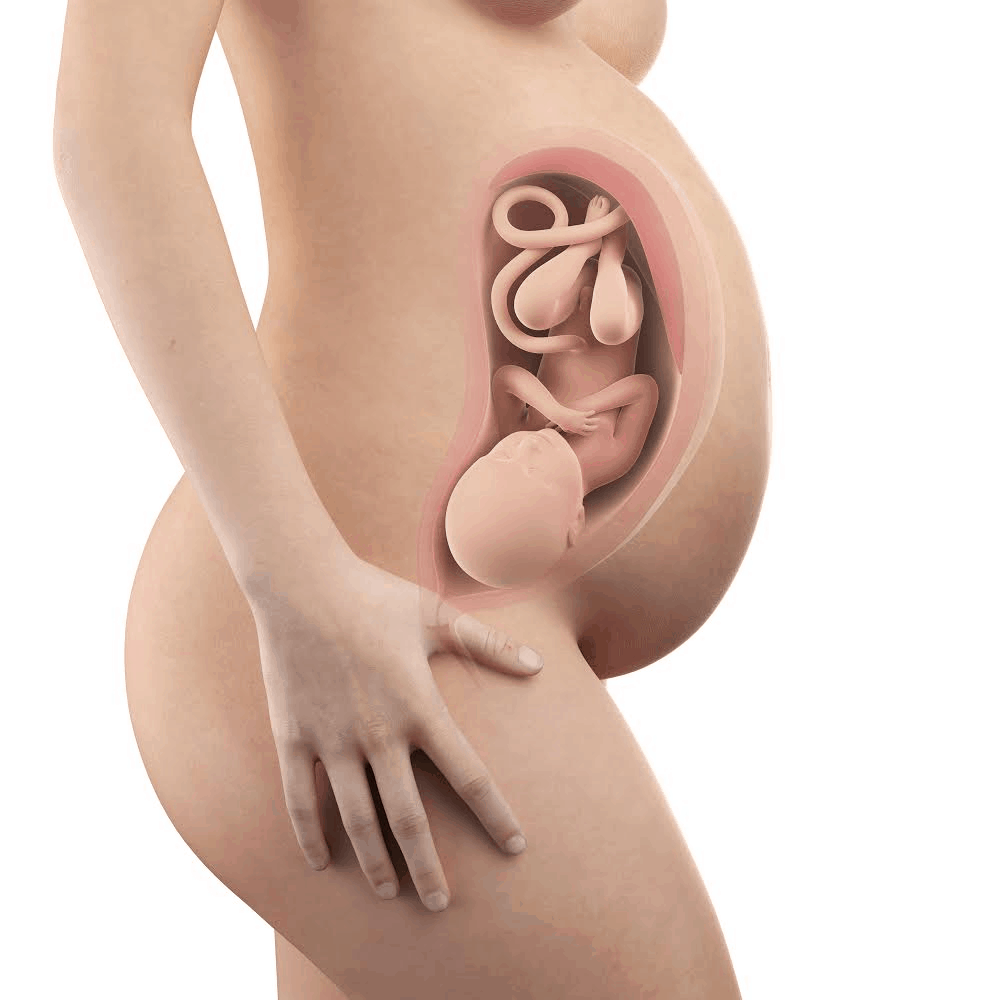
Pregnancy Symptoms 38 Weeks
Baby will drop and you may have leaky breasts.
More frequent urination
Mucous plug
Bloody show
Diarrhea
Itchy belly
Oedema (swelling in feet and ankles)
Insomnia
Nesting instinct
Braxton Hicks contractions
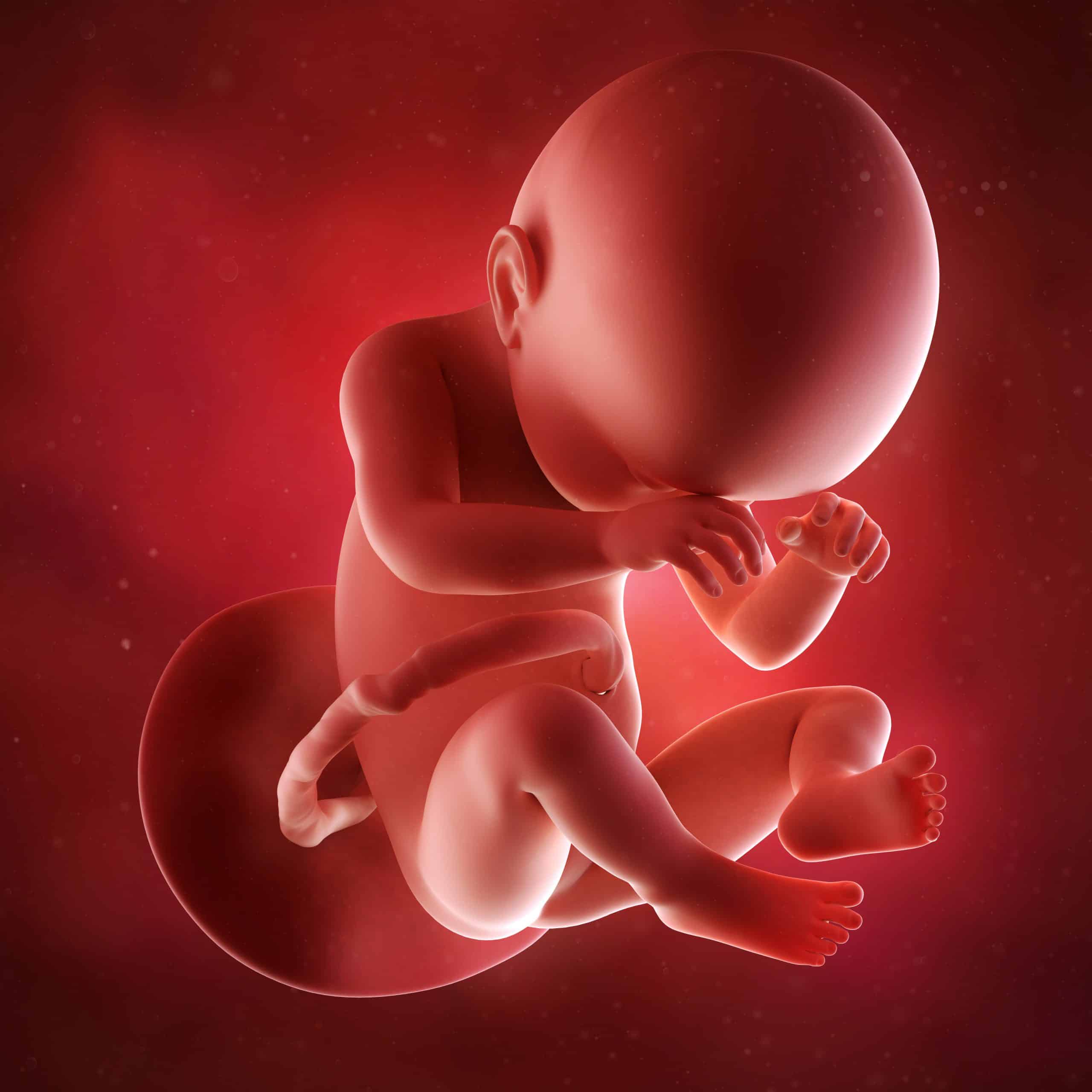
Baby is as big as a mini watermelon. About 50cm and the average baby around 3kg
Baby is now ready and waiting to go. Most of the the changes this week are small and similar to last week. Baby will continue to add fat and brain will keep developing.
Week 39
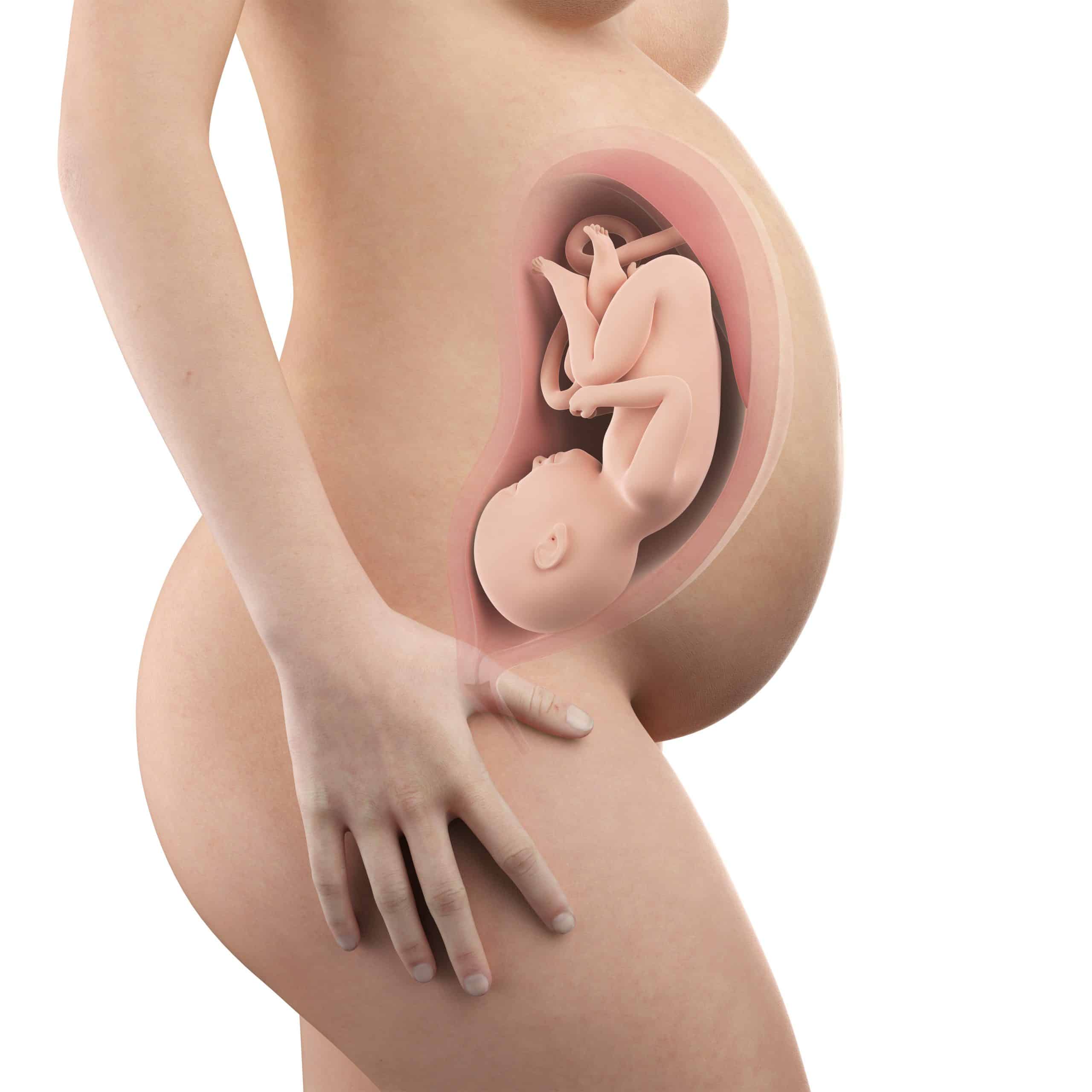
Your Baby is Officially Full Term
Pregnancy Symptoms 39 weeks
Baby will drop and Your breasts are preparing for lactation and have already started producing colostrum, which is rich in energy, antibodies and other immune boosting substances.
More frequent urination
Mucous plug
Change in foetal activity
Bloody show
Diarrhoea
Itchy belly
Oedema (swelling in feet and ankles)
Insomnia
Nesting instinct
Braxton Hicks contractions
Heartburn and indigestion
Pelvic pain
Back
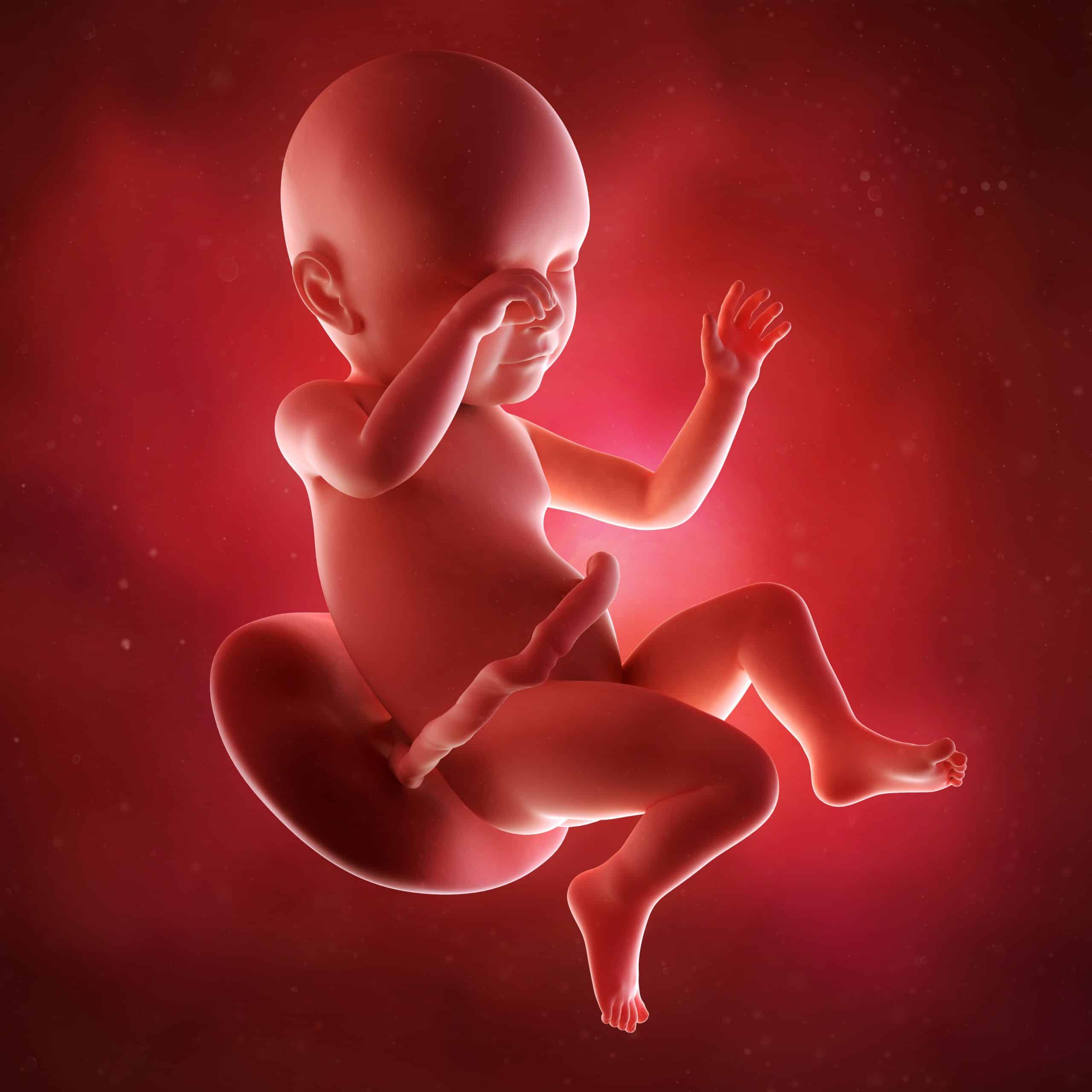
Baby is as big as a pumpkin. About 50.7cm and the average baby around 3.3kg
Baby is gaining weight and shedding the lanugo, the fine hair that covered it from 23weeks. Fingernails are growing fast.
Baby’s lungs are developed enough for baby to breathe outside the womb. It may startle for loud sounds and recognise familiar voices.
Week 40
The average pregnancy lasts 40 weeks from the first day of your last period.
30% are born before due date and 70% are born later. The uterus increases by a 1000 times compared to a non pregnant uterus. Your placenta weighs around 700g.
More than half of babies are born before 40 weeks. Towards the end of your pregnancy your cervix prepares for the birth.
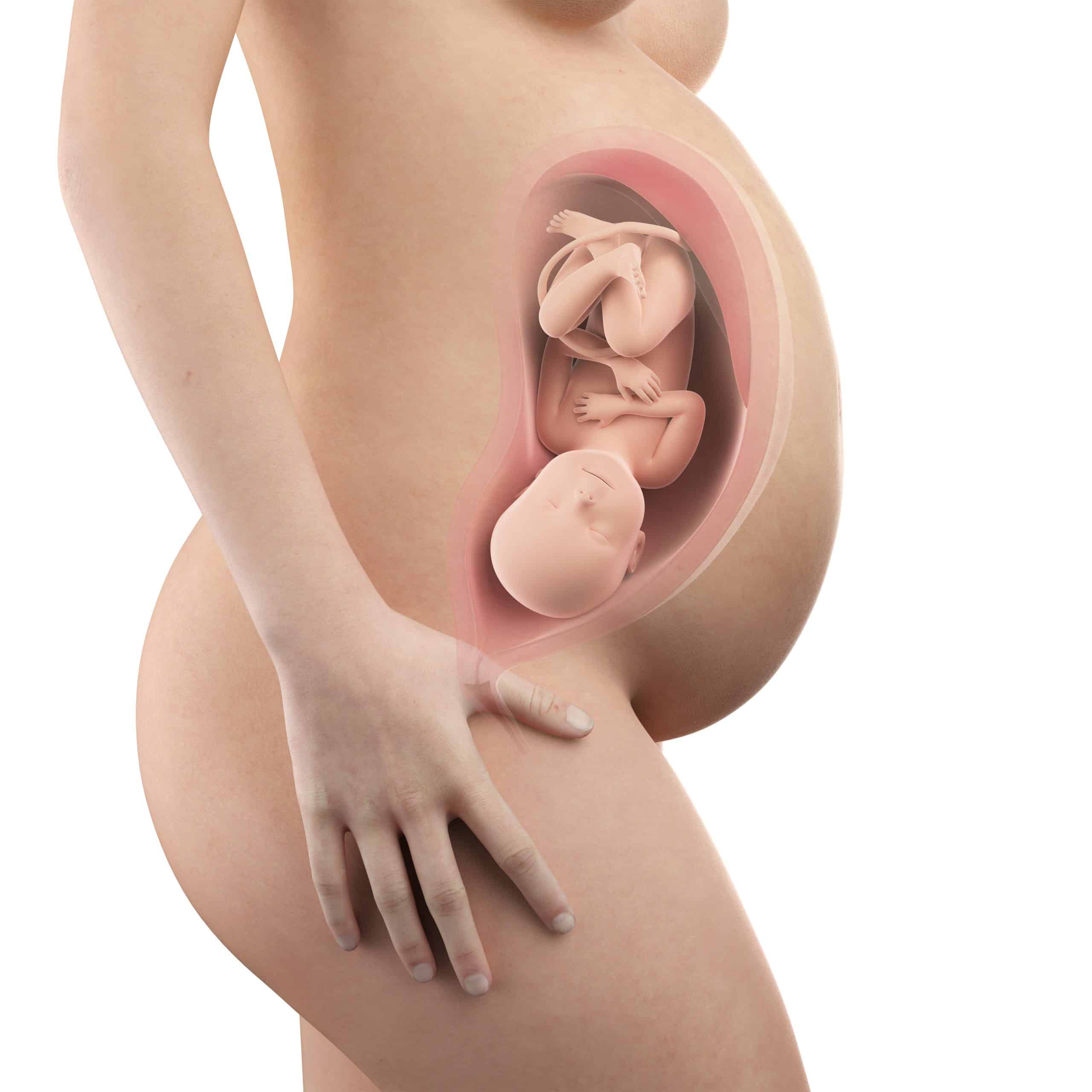
The height of the uterus lowers and the head is engaged in preparation for delivery this will also release pressure on the ribs making breathing easier.
The pressure of the baby’s head will cause more frequent bathroom trips.
It’s common to feel backache, building pressure and period like pelvic cramps.
Eating regularly, warm baths and lower back massages will all make you ready for labour and ease any discomfort.
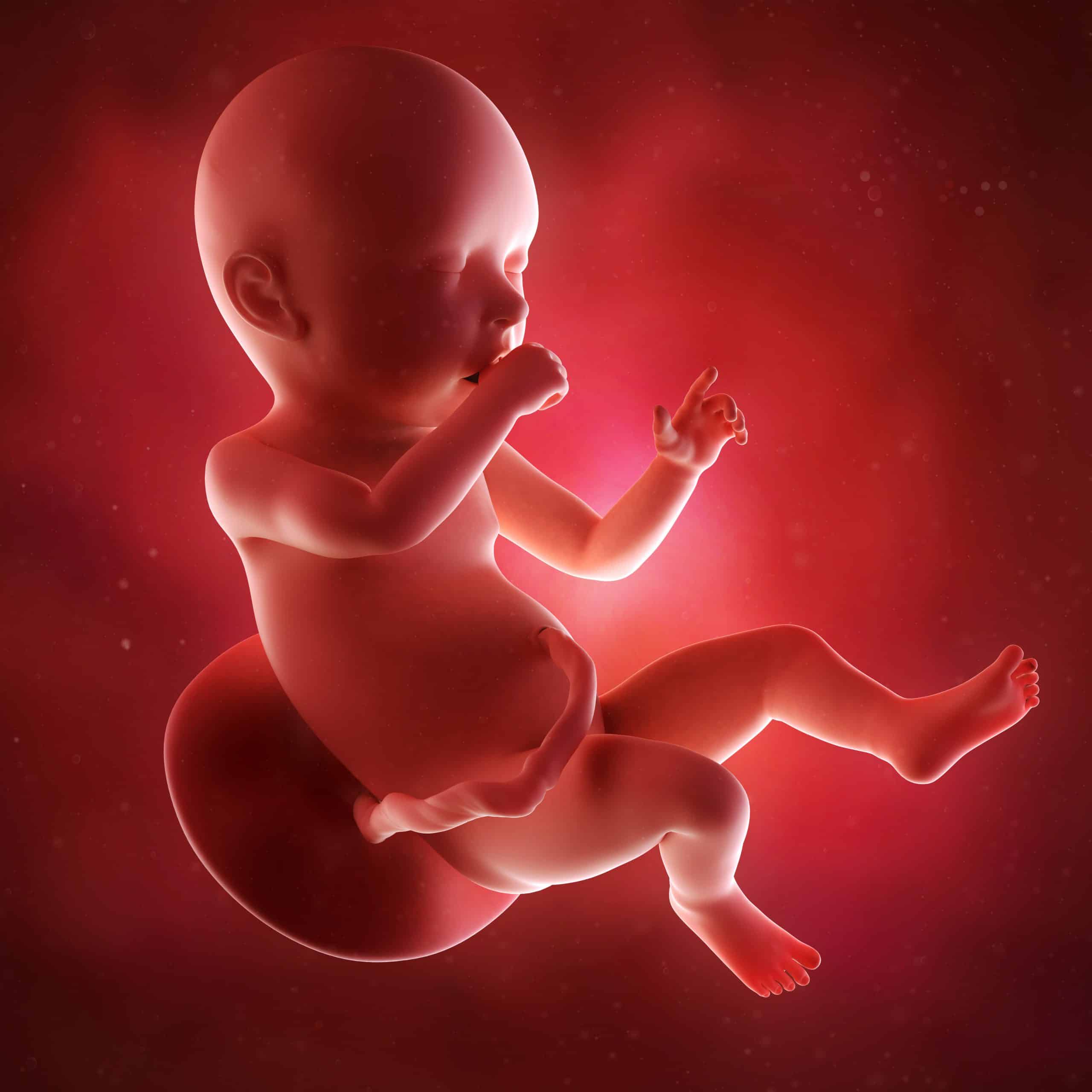
Baby is as big as a watermelon. On average babies will weigh between 3-4kg and around 45-56cm in length.
The shape of the uterus encourages baby to settle in a head down position ready for birth.
96% of babies are in the correct position for birth, 3% are in the breech position and the remaining 1% are in other positions.
The baby is cushioned by the amniotic fluid despite the lack of space. The umbilical cord continues to deliver oxygen from the mother but becomes less efficient after 42 weeks.


